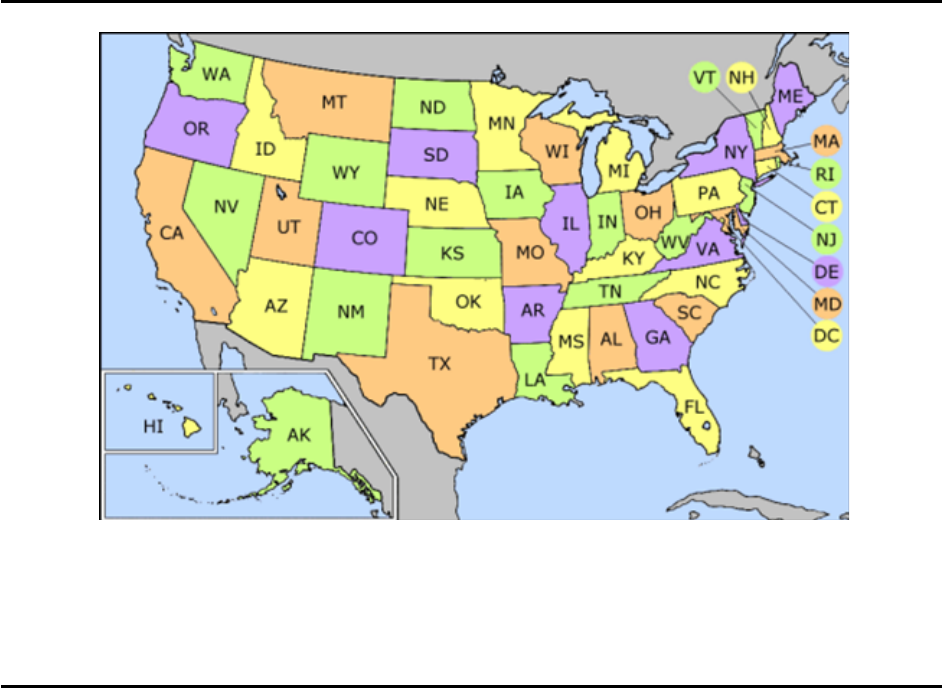
2022 Edition
(For Tax Year 2021)
STATE TAX GUIDE
For use by U.S. Military VITA/ELF Programs
Originally prepared by:
NR Administrative Law & U.S. Navy Office of the Judge Advocate General,
Legal Assistance Policy Division (Code 16)
Updated and revised by:
The American Bar Association Section of Taxation
Questions and updates can be directed to:

On behalf of the ABA Tax Section, we recognize with deep gratitude the editor and the team of
contributors from our membership and from our organizational partners who spent hours researching,
revising, and drafting the
2022 Tax Season Guide for each state.
Editor: James G. Steele, III
Organizational Partners:
Morgan, Lewis & Bockius LLP
Nelson Mullins
Kostelanetz & Fink, LLP
University of South Carolina
School of Law
Individual Contributors:
Brian Balduzzi
Tyler DeWitt
Qiva Dinuri
Shailana Dunn-Wall
Jennifer Gardiner
Christopher Goss
Andrea Herman
Teresa Hinze
Sukita Johnson
Adam Johnston
Karl Kurzatkowski
Scott Lee
Philip Lupton
Jonathan Moon
Jacob Oksman
Nic Perkins
Shawn Richter
Laura Robinson
Pamela Robinson
Catherine S. Yao
Max Seferian
Franklin Shen
Teri Shugart
Angela Siener
Lauren Smith
Colleen Spain
Bobby Streisel
Melissa Wiley
Jiayi Ye
Jamie Zug
Clint Wallace

TABLE OF CONTENTS
INTRODUCTION
GO
MISSOURI
GO
ALABAMA
GO
MONTANA
GO
ALASKA [No Income Tax]
GO
NEBRASKA
GO
ARIZONA
GO
NEVADA
[No Income Tax]
GO
ARKANSAS
GO
NEW HAMPSHIRE [No Earned
Income Tax]
GO
CALIFORNIA
GO
NEW JERSEY
GO
COLORADO
GO
NEW MEXICO
GO
CONNECTICUT
GO
NEW YORK
GO
DELAWARE
GO
NORTH CAROLINA
GO
DISTRICT OF COLUMBIA
GO
NORTH DAKOTA
GO
FLORIDA
[No Income Tax]
GO
OHIO
GO
GEORGIA
GO
OKLAHOMA
GO
HAWAII
GO
OREGON
GO
IDAHO
GO
PENNSYLVANIA
GO
ILLINOIS
GO
RHODE ISLAND
GO
INDIANA
GO
SOUTH CAROLINA
GO
IOWA
GO
SOUTH DAKOTA [No Income
Tax]
GO
KANSAS
GO
TENNESSEE
[No Income Tax]
GO
KENTUCKY
GO
TEXAS [No Income Tax]
GO
LOUISIANA
GO
UTAH
GO
MAINE
GO
VERMONT
GO
MARYLAND
GO
VIRGINIA
GO
MASSACHUSETTS
GO
WASHINGTON
[No Income Tax]
GO
MICHIGAN
GO
WEST VIRGINIA
GO
MINNESOTA
GO
WISCONSIN
GO
MISSISSIPPI
GO
WYOMING [No Income Tax]
GO

Introduction
This guide is intended as a reference for U.S. Military VITA/ELF programs. It is not a
comprehensive legal analysis of state tax law; rather, it provides basic information and contact
points for each income-tax-levying state. Sites should contact state assistance numbers, or use
state websites, for further information!
There are nine states that do not levy any tax on earned income: Alaska, Florida, Nevada, New
Hampshire, South Dakota, Tennessee, Texas, Washington, and Wyoming. New Hampshire does
tax certain types of investment income. Earned income tax information about the aforementioned
states is not included in this guide.
General Residency Rules: The general rule is that legal residency is established when an individual
is physically present in a state AND has the intent to permanently reside in the state. “Intention to
permanently reside” can be shown through a combination of several factors: ownership of real
property; registering to vote; registering a vehicle; obtaining a driver’s license; and declaring of
legal residency on legal documents (including DD Form 2058: State of Legal Residence
Certificate). One of these factors by itself would probably not be enough to change residency, but
if a service member moved to a state and registered to vote, bought a house, registered her car,
obtained a new driver’s license, and registered her children in the local schools, she would most
likely be considered to be a resident of the new state. For example, if you were a legal resident of
Delaware when you entered the Armed Forces, you remain a legal resident of Delaware for
Delaware state income tax purposes unless you voluntarily abandoned your Delaware residency
and established a new legal domicile in another state. A change in legal residence is documented
by filing DD Form 2058 and DD Form 2058-1 (State Income Tax Exemption Test Certificate)
with your military personnel office.
SCRA Protections for Active Duty Members: Pursuant to the Servicemembers Civil Relief Act
(SCRA), active duty service members are able to maintain legal residency in one state while
physically stationed in another state. Thus, the SCRA protects service members from having their
military income taxed by both their state of legal residence and the state where they are stationed.
(However, if a military member has non-military income, the state in which he or she lives and
works may tax that income, even if the military member is a legal resident of a different state).
MSRRA Protections for Dependent Spouses: Pursuant to the Military Spouse Residency Relief
Act (MSRRA), military spouses may also maintain their established domicile or residence for tax
purposes, but the domicile or residence must be the same as the service member spouse. However,
the applicability of and eligibility under the MSRRA is very fact-specific, and many states have
differing guidance on application of the MSRRA.
For further information or questions about residency for tax purposes, please contact your local
Legal Service Office.
Credit Card Payment Options: Many states have made it easier for individuals to pay their taxes
via credit card. Go to Official Payments or call 1-800-2PAY-TAX. They will accept AMEX,
Discover/Novus, Master Card or Visa. You can do a Zip Code search to determine which states
allow payments to be made online.

2
Note: Internet links are provided in this guide for your convenience, and every effort was made to
provide the most current versions of forms. However, at the time of the publishing of this
document, not all states had released the current-year forms. For links to Adobe Acrobat.pdf files
online, after clicking on the link through this guide, you may also need to highlight the link in your
web browser and double click for the document to appear.
EVERY EFFORT HAS BEEN MADE TO ENSURE THAT THE INFORMATION IN THIS
GUIDE IS ACCURATE, HOWEVER, THE USER SHOULD CONFIRM ANY
QUESTIONABLE INFORMATION WITH THE STATE WEBSITE!
Return to Table of Contents
States Participating in the Federal/State e-File Program
Alabama Kentucky North Carolina
Arizona Louisiana North Dakota
Arkansas Maine Ohio
Colorado Maryland Oklahoma
Connecticut Michigan Oregon
Delaware Minnesota Pennsylvania
District of Columbia Mississippi Rhode Island
Georgia Missouri South Carolina
Hawaii Montana Tennessee
Idaho Nebraska Utah
Illinois New Hampshire Vermont
Indiana New Jersey Virginia
Iowa New Mexico
West Virginia
Kansas New York
Wisconsin

3
State Electronic Filing Record Retention Requirements
State Record Retention Requirements
Alabama AL8453 3 years
Alaska (No Income Tax)
Arizona AZ-8879 4 years
Arkansas AR8453 3 years.
California FTB 8453 or FTB 8879 4 years
Colorado DR 8453 4 years
Connecticut No separate e-form is required. 3 years
Delaware DE-8453 3 years
District of Columbia D-40E 3 years
Florida (No Income Tax)
Georgia GA-8453 3 years
Hawaii No separate e-form is required.
Idaho No separate e-form is required. 3 years
Illinois IL-8453 3 years
Indiana IT-8879
3 years from Dec. 31 of the year the return was
filed
Iowa IA 8453 3 years
Kansas No separate e-form is required. Retain information for 3 years.
Kentucky 8879-K 3 years
Louisiana LA -8453 3 years
Maine No separate e-form is required. Retain supporting documentation for 3 years.
Maryland EL 101 3 years
Massachusetts M-8453 3 years
Michigan MI-8453 6 years
Minnesota No separate e-form is required. EROs must retain all supporting documents
for
one year.
Mississippi MS 8453 OL 3 years
Missouri No separate e-form is required. ERO must give the taxpayer all of the forms,
and the taxpayer must retain them for 3 years
Montana No separate e-form is required. Taxpayers should retain all supporting
documents for five years.
Nebraska No separate e-form is required. No retention requirement; Code 16 requires
retention until Dec. 31
st
of the year the return
was filed.
Nevada (No Income Tax)
New Hampshire (No Earned Income
Tax)
New Jersey No separate e-form is required.
New Mexico PIT-8453 3 years
New York TR-579-IT 3 years
North Carolina No separate e-form is required. 3 years.
North Dakota No separate e-form is required. A minimum of 3 years and 3 months, but to
protect against audit, retain for 6 years.
Ohio No separate e-form is required. At least 4 years, though Ohio recommends
retaining for 10 years.
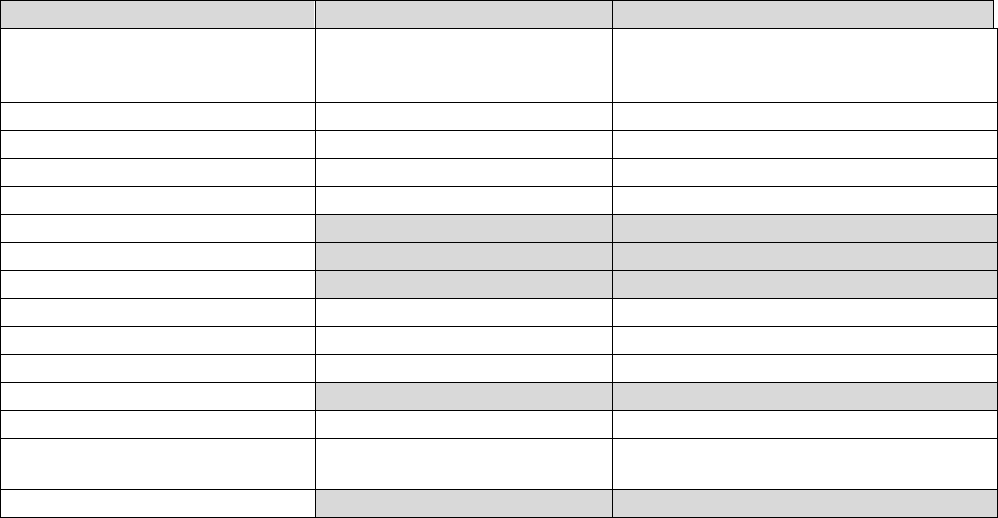
4
State Record Retention Requirements
Oklahoma OK-511-EF No retention requirement; Code 16 requires
retention until Dec. 31
st
of the year the return
was filed.
Oregon No separate e-form is required. 3 years
Pennsylvania PA-8453 or PA-8453 3 years
Rhode Island
No
separate e-form is required.
South Carolina SC-8453 3 years
South Dakota (No Income Tax)
Tennessee (No Earned Income Tax)
Texas (No Income Tax)
Utah No separate e-form is required. 3 years
Vermont No separate e-form is required. 3 years
Virginia VA-8453 or VA-8879 3 years
Washington (No Income Tax)
West Virginia WV-8453 3 years
Wisconsin No separate e-form is required. 4 years from the due date of the return or the
date filed, whichever is later.
Wyoming (No Income Tax)

5
ALABAMA
Alabama Department of Revenue
Individual and Corporate Tax Division
50 N. Ripley Street
Montgomery, AL 36104
Member of Federal/State E-File program
General Information: 334-242-1170 (Individual Income Tax Question)
Website: Alabama Department of Revenue
Refund Hotline / website: 1-855-894-7391;
My Alabama Taxes website (click on “Where’s My Refund”)
To complete returns online: My Alabama Taxes website (register and sign in)
Forms: All Forms (note: not all 2021 forms are available);
2021 Filing Season Form 40 Booklet
To contact the state, must register and sign in to the My Alabama Taxes website
State filing addresses:
Payment enclosed: Receiving a Refund
Alabama Department of Revenue
P.O. Box 2401
Montgomery, AL 36140 -0001
Alabama Department of Revenue
P.O. Box 154
Montgomery, AL 36135-0001
Not Receiving a Refund or Making a
Payment
Alabama Department of Revenue
P.O Box 327469
Montgomery, AL 36132-7469
Basic information on military
personnel (Army, Navy, Marine, Air
Force, Merchant Marine, and Coast
Guard)
Nonresidents: Nonresident military personnel merely having a duty station
within Alabama (whose legal residence is not Alabama) are not required to
file an Alabama income tax return unless they have earned income from
Alabama sources other than military pay. If they have earned income in
Alabama other than military pay, they are required to file Alabama Form
40NR. A married nonresident military person with income earned in
Alabama may file either a separate return claiming himself or herself only,
or a joint return claiming the total allowable personal exemption.
Residents: Military personnel (Army, Navy, Marine, Air Force, Merchant
Marine, and Coast Guard) whose legal residence is Alabama, are subject to
Alabama income tax on all income regardless of the source or where earned
unless specifically exempt by Alabama law. Military personnel who were
residents of Alabama upon entering military service remain residents of
Alabama for income tax purposes, regardless of the period of absence or
actual place of residence, until proof as to change of home of record has been

Alabama
6
made. The burden of proof is on the taxpayer though he owns no property,
earns no income, or has no place of abode in Alabama. Under the provisions
of the Soldiers’ and Sailors’ Civil Relief Act, military personnel are not
deemed to have lost their permanent residence in any state solely because
they are absent in compliance with military orders. In addition, persons are
not deemed to have acquired permanent residence in another state when they
are required to be absent from their home state by virtue of military orders.
E-File Information
The Alabama Department of Revenue (ADOR)’s online system linked
above, My Alabama Taxes (“MAT”), allows for electronic filing free of
charge, checking status of refund, paying taxes, viewing accounts, and
printing letters and tax return within one’s account.
Although it is unnecessary to mail to ADOR such d
ocuments as FORM
AL8453 (the transmittal form for e-filing), tax practitioners are expected to
retain this record as well as other AL and IRS forms for 3 years. In addition,
there is an Armed Forces Tax Council (all military branches) and OJAG,
Code 16 (Navy) requirement to retain this form and necessary documents at
VITA centers until December 31 of the year the return was filed.
For information on how to use MAT website, see the MAT Frequently Asked
Questions.
Who must file? Single: full-year or part-year residents with gross income of $4,000 or more;
Head of Household: full-year or part-year residents with gross income of
$7,700 or more;
Married filing jointly: full-year or part-year residents with gross income of
$10,500 or more;
Married filing separately: full-year or part-year residents with gross income
of $5,250 or more.
Nonresidents who received taxable income from Alabama sources within
Alabama and have a gross income that exceeds the prorated personal
exemption allowance (see below).
What forms to file? Residents: Form 40 or 40A. Nonresidents: 40NR. All available here (but
note: some 2021 forms not yet available as of Jan. 21, 2022).
Residency See above “Basic information on military personnel (Army, Navy, Marine,
Air Force, Merchant Marine, and Coast Guard).”
Additionally, the “Military Spouses Residency Relief Act” (Public Law 111-
97) states that the income for services performed by the spouse of a service
member shall not be deemed to be income for services performed or from
sources within a tax jurisdiction of the United States if the spouse is not a
resident of the jurisdiction in which the income is earned because the spouse
is in the jurisdiction solely to be with the service member serving in
compliance with military orders.
If the husband and wife are both in military service, each could be a resident
of a different state under the Soldiers’ and Sailors’ Civil Relief Act. A spouse
not in military service has the same domicile as the military spouse unless
proven otherwise.
Exemptions $1,500 for single taxpayers and $3,000 for married couples filing jointly.

Alabama
7
Dependent exemptions are based on Adjusted Gross Income. A “dependent”
as defined under Alabama law is an individual other than the taxpayer and
his or her spouse who received over 50% of his or her support from the
taxpayer during the tax year Use the following table to determine the per-
dependent exemption amount:
Amount on Page 1, Line 10 Dependent Exemption
$0
–
$20,000
$1,000
$20,001
–
$100,000
$500
Over $100,000
$300
Military Pay Military pay of an Alabama resident is taxable except for compensation
received for active service in a designated combat zone. Military personnel,
whose legal residence is Alabama, are subject to Alabama income tax on all
income regardless of the source or where earned unless specifically exempt
by Alabama law. See page 7 of the 2021 Form 40 Booklet.
Spouses and Community Property Alabama is not a community property state, but the income of a spouse who
lives in a Community Property state (i.e., Arizona, California, Idaho,
Louisiana, Nevada, New Mexico, Texas, Washington, or Wisconsin) may be
taxable (Check with the relevant Community Property state. See also IRS
Publication 555, “Community Property”). When one spouse is a resident and
the other a nonresident, they may not file a joint return. Spouses filing jointly
may use Spouse Tax Adjustment, which adjusts tax-rate disadvantage from
joint filing.
A military spouse is exempt from tax on income by a state in which he or she
lives only in order to live with the service member in compliance with orders,
per the Military Spouses Residency Relief Act (MSSRA). Qualifying
spouses under the MSRRA working in Alabama should complete and give
to their employer a new Form A4 with the appropriate box checked claiming
exemption under the “Military Spouses Residency Relief Act”. Taxpayers
filing an Alabama income tax return under this Act must use the following
procedures to complete their tax return:
Taxpayer must file a Form 40NR. The Alabama withholding tax must be
entered on page 1, line 5, column A. All wages (both spouses if a joint return)
must be entered on page 1, line 5, column B. All Alabama wages including
those of the qualifying spouse must be entered on page 1, line 5, column C.
On page 2, Part I, line 8, column C enter the Alabama wages of the qualifying
spouse as a negative figure. Also write or type “Military Spouses Residency
Relief Act” in the space provided on line 8. Complete the rest of the return
as per the instructions in the tax booklet or form. A copy of Form DD2058
indicating the state of legal residence of the spouse in the military must be
attached. Instructions for this form can be found in the 2021 Form 40
Booklet.
Income Exclusions Combat pay, income received from the Department of Defense as a result of
a member of the Military killed in action in a designated combat zone;
income earned by military spouse in the year of death of a member of the
Military who was killed in action in a designated combat zone, military
retirement pay; federal retirement pay; Social Security benefits; military
allowances paid to active duty military, National Guard, and active reserves
for quarters, subsistence, uniforms, and travel, income of non-resident
spouses (see “Spouses and Community Property,” above). See expanded list
on page 7 of the 2021 Form 40 Booklet.
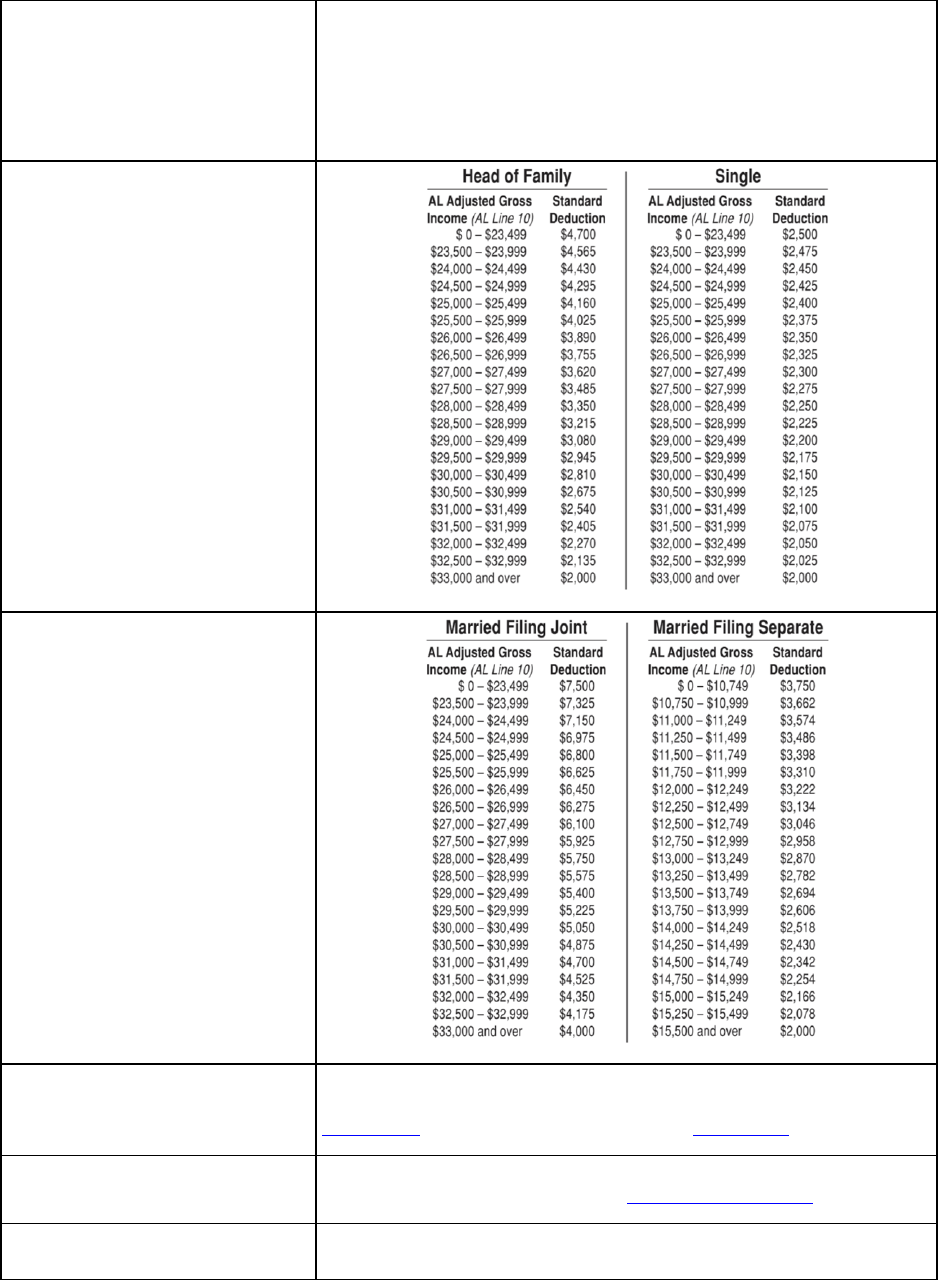
Alabama
8
Income Deductions Standard deduction is based on Adjusted Gross Income. You have the option
to either itemize your deductions or you may claim the optional Standard
Deduction. You should compute your deduction both ways to determine the
option that gives you the larger deduction. If you elect to claim the Standard
Deduction, you must check box b on line 11 and use the Standard Deduction
Tables below to determine your allowable deduction.
Capital Gains/Losses Gain from the sale of personal residence is taxable to the same extent as
reported on the federal return. All other capital gains are taxable. Use
Schedule D Form 40. Non-residents report on Form 40NR.
Retirement Income Military retired pay, in addition to various state and federal pensions, is not
reported as income. See page 7 of the 2021 Form 40 Booklet.
Filing Deadline / Extensions No later than the Federal return. This year, without an extension, that is April
18, 2022
. Alabama gives an auto
matic single six
-
month extension up to

Alabama
9
October 17, 2022 to file, with no need to file a request for an extension. No
extensions beyond 6 months shall be granted except for taxpayers abroad.
During an extension, no penalty shall be incurred, but interest shall accrue
on taxes owed. To avoid such accrual, pay an estimate of the amount owed
using a payment voucher (Form 40V).
Alabama Use Tax A rate of 4% applies to all purchases of merchandise, except where a different
rate of tax is expressly provided (the rate is 2% for purchases of automotive
vehicles that are not titled or registered by the county licensing official and
1.5 percent for farm equipment and manufacturing machinery. Also see page
10 of the 2021 Form 40 Booklet.
Filing Status
Married taxpayers may choose to file in Alabama jointly or separately,
regardless of their filing status on the federal return. Married taxpayers must
file separately if their spouse is a resident of another state, unless either
spouse is in the military.
Same-Sex Marriage Per the Supreme Court in Obergefell v Hodges, June 26, 2015, same-sex
married filers have same filing options as heterosexual married filers.
Return to Table of Contents

10
ALASKA –
NO INCOME TAX
Alaska Department of Revenue
550 W 7
th
Avenue, Suite 500
Anchorage, AK 99501
General Information: Telephone: 907-269-6620
Forms: Alaska Tax Division Forms
Special Military Processing: None
Filing requirements based
on Federal Filing Status:
None
Miscellaneous: If the service member received a dividend from the Alaska
Permanent Fund, this must be reported on his or her Federal
return.
Return to Table of Contents

11
ARIZONA
Arizona Department of Revenue Customer Care
P.O. Box 29086
Phoenix, AZ 85038-9086
All other departments:
1600 W. Monroe
Phoenix, AZ 85007-2650
Member of Federal/State E-File program
General Information: 602-255-3381
800-352-4090 (toll-free if within Arizona)
Website:
Arizona Department of Revenue
Forms: Arizona Tax Forms
Taxpayer Education: AZ Taxpayer Education; AZ VITA Quick Reference Guide
(2021)
Electronic Filing: Electronic Filing Services; 602-255-3381
Refund Status: Check Refund Status; 602-255-3381
State filing addresses:
Plain Paper Returns Bar Coded Returns
Payment enclosed: Payment enclosed:
Arizona Department of Revenue
P.O. Box 52016
Phoenix, AZ 85072-2016
Arizona Department of Revenue
P.O. Box 29204
Phoenix, AZ 85038
Refund expected or no payment: Refund expected or no payment:
Arizona Department of Revenue
P.O. Box 52138
Phoenix, AZ 85072-2138
Arizona Department of Revenue
P.O. Box 29205
Phoenix, AZ 85038
E-File Information Retain all documents for four years following the return due date, per
Arizona Revised Statutes ARS 42-1105(E). To E-file, select the Free File
link from a vendor on the AZ DOR website.
Who must file? All Arizona taxpayers, whether full-year or part-
year residents, must file a
return if they are:
Single individuals with gross income of $12,550 or more;
Married filing jointly with gross income of $25,100 or more;
Married filing separately with gross income of $12,550 or more; or
Heads of household with gross income of $18,800 or more.
See AZ Personal Income Tax Booklet.

Arizona
12
What forms to file? Residents: 140 EZ, 140 or 140A; Part-Year Residents: 140PY; Nonresidents:
140NR. All forms are available here.
Part-year Resident Part-year residents are subject to tax on: 1) any income earned during the tax
year while a AZ resident, and 2) any income earned from an AZ source
before moving to or after leaving the state. See 140PY.
Exemptions
Only available if taxpayer is age 65 or over, blind, or caring for a “qualifying
parent or grandparent.”
Dependent Tax Credit
Arizona provides a $100 dependent tax credit per dependent under 17 years
of age, and $25 for dependents 17 and older. The credit is phased out for
federal adjusted gross income (AGI) greater than $200,000 for single,
married filing separate, and head of household; and phased out for federal
AGI of $400,000 for married filing joint.
Military Pay Active duty military pay is not taxed in Arizona.
Military members need not file an Arizona return if: (1) the taxpayer is an
active duty member of the United States Armed Forces; (2) the taxpayer’s
only income for the taxable year is compensation received for active duty
military service; and (3) no Arizona tax was withheld from the taxpayer’s
active duty military pay.
If Arizona tax was withheld from the taxpayer’s active duty military pay,
the taxpayer must file an Arizona income tax return to claim any refund that
may be due from that withholding. Military taxpayers must also file an
Arizona income tax return if they have any other income besides
compensation received for active duty military service.
For more information see the instructions for Form 140 and Arizona
Department of Revenue Publication 704, Taxpayers in the Military.
Spouses and Community Property Arizona is a community property state. Under the Federal Military Spouses
Residency Relief Act (MSRRA), a spouse of a servicemember may be
exempt from Arizona tax on income from services performed there if: (1) the
servicemember is present in Arizona in compliance with military orders; (2)
the spouse is there solely to be with the servicemember; and (3) the spouse
maintains domicile in another state, which is the same state of residence of
the servicemember. Arizona Department of Revenue Publication 705
Spouses of Active Duty Military Members provides a detailed discussion of
military spouses and how Arizona applies the MSRRA.
Income Exclusions
Arizona does not tax interest from U.S. government obligations (e.g., savings
bonds or treasury bills); pay received for active service in the U.S. Armed
Forces, Reserves or National Guard; certain contributions to 529 or 529A
savings plans; or certain retirement benefits (see retirement income section
for more details). For a complete list of exclusions from income see the
instructions to Arizona Form 140.
Standard Deductions For 2021, the standard deduction for a single taxpayer or a married taxpayer
filing a separate return is $12,550; the standard deduction for married filing
jointly is $25,100; and the standard deduction for filing head of household is
$18,800.
Taxpayers who choose to itemize must use Schedule A. See form instructions
for state-specific adjustments to federal itemized deductions.

Arizona
13
Capital Gains/Losses A subtraction is allowed for a percentage of any net long-term capital gain
included in federal AGI that is derived from an investment in an asset
acquired after December 31, 2011. For 2021, the percentage is 25%.
Taxpayers may also subtract the amount of any net capital gain included in
federal AGI from investment in a qualified small business as determined by
the Arizona Commerce Authority (ACA) pursuant to A.R.S. § 41-1518.
Retirement Income Arizona does not tax: Social security benefits received under Title II of the
Social Security Act; railroad retirement benefits received under the Railroad
Retirement Act; or benefits, annuities or pensions received as retired or
retainer pay of the uniformed services of the United States.
A taxpayer who receives a federal, state or local government pension may
subtract up to $2,500 of such income for Arizona tax purposes. If both the
taxpayer and spouse receive government pensions, each spouse may subtract
up to $2,500.
Deadline/Extensions Returns may be filed any time after January 1, 2022, but no later than April
18, 2022. A six (6) month filing extension until October 17, 2022 may be
granted if timely requested. Arizona will recognize a federal extension for
the period covered by the federal extension. Arizona does not have a state-
specific extension for military overseas or military on deployment in support
of contingency operations, but will respect any applicable federal extension.
Even if an extension is requested, at least 90% of the tax due must be paid
by the original due date of April 18, 2022. If 90% of the tax due is not timely
paid, interest and extension underpayment penalties will apply. To apply for
a state extension, file Arizona Form 204 by April 18, 2022.
Return to Table of Contents

14
ARKANSAS
Arkansas Department of Finance and Administration
Individual Income Tax Section
Ledbetter Building
1816 W 7th Street, Rm 2300
Little Rock, AR 72201
Member of Federal/State E-File program
General Information: (501) 682-1100, fax (501) 682-7692
Income Tax Hotline: (501) 682-1100,
(800) 882-9275,
or for Spanish (866) 656-1842
Web site: Arkansas DFA Website
Forms: Arkansas Forms Website
Taxpayer access point: 877-280-2827 (toll free), 501-683-2827 (Little Rock area)
(501) 682-1100
Arkansas Taxpayer Access Point: www.atap.arkansas.gov,
email: [email protected]
Electronic Filing: (501) 682-7925; 7075; 7926 (Numbers for Tax Officer use
only)
Refund Status: AR Refund Status
State filing address:
Tax Due Return: Refund return: No tax due return
Arkansas State Income Tax
P.O. Box 2144
Little Rock, AR 72203-2144
Arkansas State Income Tax
P.O. Box 1000
Little Rock, AR 72203-1000
Arkansas State Income Tax
P.O. Box 8026
Little Rock, AR 72203-8026
E-File Information A taxpayer who files an Arkansas income tax return is required to retain
records to prove the accuracy of the return for six (6) years. The Armed
Forces Tax Council (all military branches) and OJAG, Code 16 (Navy)
requires the retention of this form and necessary documents at military VITA
centers until December 31
st
of the year the return was filed. If forms are
rejected, see guidance for “Reject Codes” at AR 2020 Reject Codes.
Beginning in tax year 2021, tax return preparers who file their clients’ federal
return electronically must file the Arkansas return electronically.
Taxpayers may use IRS Free File Delivered by TaxAct®, but this is only
available for taxpayers:
With adjusted gross income (AGI) of $65,000 or less, or
Eligible for the Earned Income Tax Credit, or
Active Military with adjusted gross income of $73,000.00 or less.

Arkansas
15
The following companies provide FREE preparation and electronic filing
services for both Arkansas and Federal individual income taxes, but have
lower income qualifications:
IRS Free File Delivered by TaxAct®
OLT.com
TaxSlayer
FreeTaxUSA
If a taxpayer chooses to electronically file their State of Arkansas tax return
by using one of the online web providers, the taxpayer is required to complete
the form AR8453-OL. Effective tax year 2011, the completed AR8453-OL
along with the AR1000F or AR1000NR any W-2’s or schedules are to be
kept in the taxpayer’s files.
Technical Support: Caroline Glover, Fiscal Division Manager & e-File
Coordinator, (501) 682-7925, (f) (501) 682-7393, E-Mail
caroline.g[email protected]ansas.gov
1099 Refund ID Number: Some tax preparation software applications require
the ID number of the pay or for State of Arkansas Income Tax Refunds to be
entered. This ID number is: 71-0847443.
Who must file? All Arkansas military personnel must file a tax return according to the
following, even if the military pay is excluded.
Full Year Residents—must file if gross income is at least:
Single: $13,055
Married Filing Jointly (1 or no deps): $22,016
Married Filing Jointly (2 or more deps): $26,497
Qualifying Widow(er) in 2019 or 2020 and not remarried in 2021 (1 or
no deps): $18,561
Qualifying Widow(er) in 2019 or 2020 and not remarried in 2021 (2 or
more deps): $22,126
Married Filing Separately: $8,500
Head of Household (1 or no deps): $18,561
Head of Household (2 or more deps): $22,126
Part Year Residents—must file if any gross income while an AR resident.
Nonresidents—must file if any gross income from AR sources.
See special rules for military pay below.
What forms to file? Full Year Residents file AR1000F; Part-Year and Nonresidents file
AR1000NR.
Residency Taxpayer is a FULL YEAR resident if they lived in AR for all of 2021 or
maintained a domicile or a home of record in AR during the tax year. PART
YEAR residents are those that moved into or out of AR during 2021.
Exemptions Arkansas uses a Personal Tax Credit of $29 per dependent, rather than an
exemption.
Military personnel stationed in Arkansas with a Home of Record in another
state are treated as nonresidents. Their military wages are not reported
anywhere on the Arkansas return. These nonresident military personnel file
AR-NRMILITARY (Non-Resident Military Personnel Exemption Form).

Arkansas
16
Military Pay Military Pay Exemption: Military pay is entered on line 9, but automatically
excluded from the computation of taxable income. There is a 100%
exemption from income tax for service pay or allowance received by an
active-duty member of the armed forces. “Active duty member of the armed
forces”
includes all members of the armed forces of the United States,
including the National Guard and Reserve Units, including full-time training
duty, annual training duty, and attendance while in the active military service
at a service school. Excludes a military technician (dual status), the National
Oceanic and Atmospheric Administration Commissioned Officer Corps, and
the United States Commissioned Corps of the Public Health Service.
Member of “armed services” (i.e., a person not qualifying under the 100%
exemption) can exclude first $9,000 of service pay or allowance. Note:
exempted military pay is included in gross income.
If AR is taxpayer’s home of record and taxpayer is stationed outside AR,
taxpayer must file AR1000F reporting all of taxpayer’s income even if
exempt military pay.
If taxpayer’s home of record is not Arkansas, do not report to Arkansas
taxpayer’s income or taxpayer’s nonresident spouse’s income. Instead, fill
out and submit AR-NRMILITARY Form to have a note put on taxpayer’s
account that taxpayer is not required to file a return.
However, if spouse had AR income tax withheld, he/she will need to file a
return to receive a refund (see below).
Military Family Tax Relief Act: excludes from income “qualified military
benefits” provided to members of the US military, determined by reference
to I.R.C. § 134 as in effect on January 1, 2009. “Qualified military benefits”
include, for example, veteran’s benefits authorized under 38 U.S.C. § 5301
(e.g., payments made by the VA under the compensated work therapy
program), certain dependent care assistance programs, and travel benefits
provided under 10 U.S.C. § 2613.
Military reserves expenses can be taken as an adjustment on Form AR
1000ADJ.
Spouses and Community Property Arkansas is not a community property state. Non-military spouses with
Arkansas income must file the appropriate form, State of Arkansas Tax
Exemption Certificate for Military Spouse, found at AR Military Spouse Tax
Exemption Certificate (AR-MS).
The Military Spouses Residency Relief Act exempts a military spouse’s
income from Arkansas tax if the service member’s Home of Record is not
Arkansas and the spouse’s domicile is the same as the service member’s
Home of Record. (Write the words “military spouse” at top of tax return,
attach a completed Form AR-MS, and attach a copy of service member’s
LES to verify Home of Record.) For future tax year purposes, the nonmilitary
spouse must submit a new payroll withholding form, ARW-4MS to his/her
employer each year to exempt future income from Arkansas tax withholding.
Income Exclusions IRS economic impact payments, Social Security benefits, VA benefits,
Workers’ Compensation, Life insurance proceeds based on death of the
individual, Railroad Retirement benefits, 2020 and 2021 unemployment
benefits, and related supplemental benefits are exempt from tax.
Income Deductions
Standard Deductions are $4,400 for Married Filing Jointly; $2,200 for all
others. May itemize; categories follow federal rules. The deduction for
teacher’s classroom expenses was increased to $500 for individuals, $1000
for married taxpayers.

Arkansas
17
Capital Gains/Losses For tax year 2021 the capital gain exemption is 50% for net gains for the
entire year. Capital loss is limited to $3,000 for filing status 1, 2, 3, and 6,
and $1,500 per taxpayer if filing status 4 or 5 See AR1000D.
Retirement Income Taxpayers may also exclude up to $6,000 from certain retirement plans.
Military Retirement Exemption (Act 141 of 2017): Beginning with tax year
2018, military retirement benefits received by a member of the uniformed
services are exempted from income tax. See pages 9-10 of the Arkansas
Individual Income Tax Forms and Instructions (note that the 2020 forms and
instructions were not out as of the publication of this document) . Taxpayers
may not take both exemptions on the same return.
Deadline/Extensions April 18, 2022 (conforms to federal deadline)
All Arkansas taxpayers have the right to request an extension before the filing
deadline. If you have already filed a federal extension request, the State of
Arkansas will honor the federal extension request as well; your due date on
the Arkansas return will then be the same as the federal return, October 15.
If you have filed the federal extension request, you do not have to file a
separate state extension request; mark a block on the State of Arkansas
return. Except in the case of deferment under the Service members Civil
Relief Act (see Miscellaneous), interest and a failure-to-pay penalty will be
assessed if any tax due is not paid by the original due date, April 18
th
.
If you do not file a federal extension, you can file an Arkansas extension
using Form AR1055-IT before the filing due date of April 18th. This form
must state a reason for the extension and be postmarked on or before April
18
th
. Inability to pay will not be honored as a valid reason for an extension of
time to file. Inability to pay is not a valid reason to request an Arkansas
extension. Send your request to:
Individual Income Tax Section
P.O. Box 8149
Little Rock, AR 72203-8149
Arkansas does not appear to have a state specific filing extension for military
overseas or for military on deployment in support of contingency operations.
Payments Complete AR1000V and attach a check or money order to your return. Write
the tax year and your Social Security Number or account number on the
check or money order, and make your check payable in U.S. dollars to the
Department of Finance and Administration. Mail on or before April 18, 2022.
If the payment is for an amended return, mark the box yes on Form AR1000V
for “Is Payment for an Amended Return”.
Credit card payments may be made by calling ACI Payments, Inc., at 1-800-
2PAY-TAX (1-800-272-9829), or by visiting www.officialpayments.com
and clicking on the “State Payments” link.
Credit card payments will be processed by ACI Payments, Inc., a private
credit card payment services provider. A convenience fee will be charged to
your credit card for the use of this service. The State of Arkansas does not
receive this fee. You will be informed of the exact amount of the fee before
you complete your transaction. After you complete your transaction, you will
be given a confirmation number to keep with your records.
Sales Tax Taxpayers have two (2) options for filing and paying Arkansas Sales Tax:
File online. File online using the Arkansas Taxpayer Access Point (ATAP).
You can remit your payment through this online system.

Arkansas
18
File by mail. You can use Form ET-1, file, and pay through the mail. Contact
501-682-7104 to request ET-1 forms and the forms will be mailed to your
business in two to three weeks. For faster service, file your Sales and Use
Tax Returns online (see above).
Miscellaneous Under the Servicemembers Civil Relief Act (SCRA), the IRS and state and
local taxing authorities must defer a military member’s income taxes due
before or during his military service if his ability to pay the income tax is
materially affected by military service. No interest or penalty can be added
because of this type of deferral.
Filing requirements based on Federal
Filing Status
SVCMs may choose to file MFS-AR or MFJ-AR regardless of filing status
on the federal return.
Same-Sex Marriage
Per the Supreme Court in Obergefell v Hodges, June 26, 2015, same-sex
married filers have same filing options as heterosexual married filers.
Return to Table of Contents

19
CALIFORNIA
Franchise Tax Board
P.O. Box 942840
Sacramento, CA 94240-0040
(correspondence)
Member of Federal/State E-File program
General Information: (800) 338-0505 Automated Service
(Automated Taxpayer Assistance Line)
(916) 845-6500 (outside of the US)
Website: Tax Board
Forms: Forms
Order forms by phone: (800) 338-0505
Order forms online: Forms Request
Refund status: Refund Status
Tax payments online: Pay here or call (800) 272-9829 (code 1555 or press 2 (ACI
Payments, Inc.)
State filing addresses:
Payment enclosed: Refund or no Amount Due:
Franchise Tax Board
PO Box 942867
Sacramento, CA 94267-0001
Franchise Tax Board
PO Box 942840
Sacramento, CA 94240-0001
E-File Information Please see the E-Filing website for information on California’s E-filing
options.
If you need acknowledgement or need to know the status of your
electronically filed tax return, contact your e-file provider or tax professional.
Do not mail tax documents to the FTB. Tax sites no longer retain paper copy
of FTB 8453, however, California requires that the taxpayer keep this form
with a copy of the tax return for four years from the due date of the return or
the date it was filed, whichever is later. There is an Armed Forces Tax
Council (all military branches) and OJAG, Code 16 (Navy) requirement to
retain this form and necessary documents until December 31
st
of the year the
return was filed.
Re-submit rejected returns (not part of federal/state e-file program). If return
is repeatedly rejected, call the e-file help desk for instructions.
Who must file? California residents and part-year residents with income more than the
amount defined in the charts (note that at the time of the publication of this
document, only the 2020 link was available).
What forms to file? Full Year Residents file Form 540 or 540 2EZ. Part year or Nonresidents file
Form540NR. Links added.

California
20
Residency Must file return if CA-source income and income from all sources exceeds
threshold amounts. Follows general residency test. See FTB Publication
1031 2021 Guidelines to Determine Resident Status.
Income Exemptions / Deductions Adoption, child care expenses, renting, and joint custody can result in tax
credits, The standard deductions in California are as follows: $4,803 for
single or married RDP filing separately; $9,606 for married/RDP filing
jointly, head of household or qualifying widow/widower; the dependent
exemption credit is $400. Note: prior entry had references to outdated
materials. New links added. Standard deduction information is on pg. 7 of
linked document.
Military Pay
Servicemembers domiciled outside of California, and their spouses, may
exclude the Servicemember’s military compensation from gross income
when computing the tax rate on nonmilitary income. Requirements for
military Servicemembers domiciled in California remain unchanged.
Military Servicemembers domiciled in California must include their military
pay in total income. In addition, they must include their military pay in
California source income when stationed in California. However, military
pay is not California source income when a Servicemember is permanently
stationed outside of California.
Military service members domiciled in California and stationed in California
are considered residents of CA. They must include their military pay in
California source income. For more information, see Guidelines for
Determining Residency, FTB Publication 1031 and for Tax Information for
Military Personnel, see FTB Publication 1032.
Spouses and Community Property
California is a community property state; if one spouse is a California-
resident, must include one-half of non-resident spouse’s pay. If a non-
resident spouse is a resident in a community property state (AZ, CA, ID, LA,
NV, NM, TX, WA, WI) then California does require that military pay be split
equally between spouses. Please consult FTB Publication 1032 for a detailed
discussion on how a spouse’s income may or may not be taxable in
California.
Under the Federal Military Spouses Residency Relief Act (MSRRA), the
income of a non-military spouse of a military Servicemember for services
performed in California is not considered to be from sources within
California if the spouse is not a California resident because the spouse is in
California solely to be with Servicemember solely in compliance with
military orders and both have the same out-of-state domicile.
Note: California may require nonmilitary spouses of Servicemembers to
provide proof that they meet the criteria for California personal income tax
exemption as set forth in the MSRRA.
Income Exclusions Military Family Tax Relief Act (see page 3-4 of FTB Publication 1032)
allows the following:
Exclusion of Gain on Sale of a Principal Residence - A taxpayer on
qualified official extended duty in the U.S. Armed, Uniformed, or
Foreign Services may suspend, for up to 10 years of such duty time, the
running of the 5-year ownership-and-use period before the sale of a
residence. This applies when the duty station is at least 50 miles from
the residence - or while the person is residing under orders in
government housing - for a period of more than 90 days or for an
indefinite period.

California
21
Exclusion from Gross Income of Federal Death Gratuity Payments– A
federal death gratuity payment to a survivor of a member of the Armed
Forces is excludable from gross income.
Combat Zone Extensions Expanded to Contingency Operations– The
various extensions granted to combat zone participants to file tax returns
or pay taxes apply to those serving in Contingency Operations, as
designated by the Secretary of Defense.
Deduction for Overnight Travel Expenses of National Guard and
Reserve Members – Reservists who stay overnight more than 100 miles
away from home while
in service (e.g., for a drill or meeting) may deduct unreimbursed travel
expenses (transportation, meals, and lodging).
Capital Gains/Losses Generally, follows federal tax rules; however, there are continuing
differences between California and Federal law. Additional information can
be found in FTB Publication 1001, Supplemental Guidelines to California
Adjustments, the instructions for California Schedule CA (540 or 540NR):
Schedule CA 540, California Adjustments - Residents and Schedule D.
Disaster Relief You may deduct any loss caused by a disaster located in a California area
designated by the President or the Governor to be in a state of emergency
beginning on or after January 1, 2014 and before January 1, 2024. California
law generally follows federal law regarding the treatment of losses incurred
as a result of a casualty or a disaster. You may qualify for a casualty loss if
you were not compensated for the damage to or loss of their property due to
a sudden unexpected, or unusual earthquake, fire, flood, or similar event. You
may also claim a disaster loss in the taxable year the disaster occurred or in
the taxable year immediately before the disaster occurred. The Disaster Loss
Deduction page explains the tax treatment of disaster losses.
Retirement Income Generally, follows federal tax rules; however, there are some differences
between California and Federal law that may cause the amount on your
California distribution income to differ from the amount reported for federal
purposes. For more information, see FTB Publication 1005 (note that at the
time of the publication of this document, only the 2019 link was available).
Deadline/Extensions April 18, 2022. Extensions: California gives you an automatic filing
extension through October 17, 2022. You don’t need to apply for one.
Remember, an extension to file is not an extension to pay. If you can’t file
by April 18, 2022:
You are due a refund - File your return by October 17, 2022. Choose
e-file and direct deposit for the fastest refund.
You have a balance due - Pay the amount you owe by April 18, 2022
to avoid penalties and interest (note: you can avoid such charges if in
combat zone, see page 8 of FTB Publication 1032. Use Form 3519.)
You’re not sure if you have a balance due - Use the worksheet on
Form 3519.
In 2021, the IRS extended the tax deadlines for 2020 taxes from April to
May, due to COVID-19. At this time, it is unknown whether this will happen
again for 2021 taxes (due in 2022).
Other credits Child and Dependent Care Expenses Credit – California allows a non-
refundable credit for child and dependent care expenses. The law allows
military pay to be included for the Child and Dependent Care Expenses
credit. Use FTB Form 3506.

California
22
Nonrefundable Renter’s Credit can be used to offset your tax liability.
More information can be found
here
.
Special Military Processing While stationed outside of CA on PCS Orders, a SVCM is not subject to tax
on military wages, but is required to file a CA return if SVCM has CA
sourced income, such as rental income in California.
See page 8 of FTB Publication 1032. Military personnel on duty outside the
United States or in a designated combat zone or in a qualified hazardous duty
area (QHDA) are allowed a filing extension of up to 180 days to file their
California income tax returns and pay their tax, without interest or penalties
as described below:
If you were in a designated combat zone, contingency operation or in
a QHDA anytime during the tax year or filing period (January 1 to April
15), you are entitled to an extension to file and pay, without interest and
penalties, of up to 180 days after leaving the combat zone or QHDA. In
addition, you are entitled to an additional extension of the number of
days you were in a combat zone or QHDA during the filing period.
If you served outside the United States, but not in a designated combat
zone, contingency operation or QHDA, you are entitled to an
extension of time to file and pay without interest and penalties, of up to
180 days after returning from overseas.
How do I indicate that I qualify for the extension to file and pay?
If you were serving in the military overseas, write “MILITARY
OVERSEAS” at the top of your tax return in BLUE INK.
If you served in a designated combat zone or QHDA write “
COMBAT
ZONE” and the area you served in at the top of your tax return in
BLUE INK.
You must also write the date you were deployed overseas or entered
a designated combat zone or QHDA and the date you returned from
overseas or from a designated combat zone or QHDA.
If both you and your spouse were in the military, write the information
for both of you and indicate which is your information and which is your
spouse’s information.
The extensions apply to the Servicemember and spouse regardless of whether
a joint return or separate returns are filed.
Filing requirements based on Federal
Filing Status
Use the same filing status for California that you used for your federal
income tax return, unless you are in a registered domestic partnership (RDP).
Exception: If you file a joint tax return for federal purposes, you may file
separately for California if either spouse was an active member of the United
States armed forces or any auxiliary military branch during 2021 or a
nonresident for the entire year and had no income from California sources
during the year.
Some special rules apply to RDPs. Some RDPs are not recognized for federal
filing purposes, but are recognized in California. See FTB Publication 737.
(form not yet updated for 2021 as of the publication of this guide).
Miscellaneous The refundable California Earned Income Tax Credit (EITC) is available to
taxpayers who earned wage income in California. This credit is similar to the
Federal EITC but with different income limitations. EITC reduces California
tax obligation or allows a refund if no California tax is due. You don’t need
a child to qualify but must file a California tax return to claim the credit. Use
FTB Form 3514. If your earned income was higher in 2020 than in 2021, you
can use the 2020 amount to figure your EITC for 2021.

California
23
The federal
Heroes Earnings Assistance and Relief Tax (HEART) Act of
2008 permits the rollover of a federal military death gratuity payment or
Servicemembers’ Group Life Insurance proceeds into a Roth IRA or
Coverdell education savings account (ESA), without regard to otherwise
applicable contribution limits.
California conforms to the Heroes Earned Retirement Opportunity Act that
allows members of the Armed Forces serving in a combat zone to make
contributions to their individual retirement plans even if compensation on
which such contributions is based is excluded from gross income. California
also conforms to the exceptions from the penalty on early withdrawals from
retirement plans from qualified distributions paid after September 11, 2001
to reservists while serving on active duty for at least 180 days. See page 4 of
FTB Publication 1032.
Return to Table of Contents

24
COLORADO
Colorado Department of Revenue
Denver, CO 80261
Member of Federal/State E-File program
General Information:
(303) 238
-
7378
Email:
Website:
Individual Income Tax Information
Forms:
Individual Income Tax Forms
FYI Publications:
Individual Income Tax Guides and Publications
Refund Status:
Use
Revenue Online
or
(303) 238
-
7378
Online Customer Support:
Contact Us
Taxpayer Service Centers:
Local Taxpayer Service Centers. Appointments are available
and highly encouraged. Walk-ins are welcome, but wait times
vary.
Mailing Address Info:
Mailing Addresses vary based on form being mailed or
purpose of mailing.
State filing address without payment: State filing address with payment:
Colorado Department of Revenue
Denver, Colorado 80261
-
0005
Colorado Department of Revenue
Denver, Colorado 80261
-
0006
E-File Information
Free e-filing is available through Revenue Online. No login is required to file
a return, but you can create a login to view your income tax account info in
Revenue Online. Learn How to E-File or Get Help with Revenue Online.
You can also e-file through a paid tax professional or using purchased tax
software. View Accepted Tax Software.
Who must file? You must file a Colorado income tax return if during the year you were a
full-year resident of Colorado, or a part-year resident of Colorado with
taxable income during that part of the year you were a resident, or a
nonresident of Colorado with Colorado source income; AND you are
required to file a federal income tax return, or you have a Colorado income
tax liability for the year. See Income Tax Filing Requirements.
There is no minimum income threshold for filing a Colorado income tax
return. You must file a Colorado income tax return regardless of age or
residency status if you wish to receive a refund on wage withholding
reported on your W-2 form.
What forms to file? Full year residents, file Form 0104; Part year or nonresidents file both Form
0104 and 0104PN. Current year forms found at Individual Income Tax
Forms.
Requirements for Residency Follows the general residency test.

Colorado
25
Spouses of service members can elect to have the same state of residence as
the service member. (See “Spouses” section below for more information for
working spouses).
If a service member who is a Colorado resident is stationed outside the U.S.
for 305 days of the tax year, the service member may elect to file as a non-
resident for Colorado income tax purposes. A spouse who accompanies the
service member for at least 305 days can also make this election. See FYI
Income 21 or Active Duty Service Members for military-specific residency
rules.
Military Pay Resident service members: A service member who is a full-year resident is
taxed in the same manner as any Colorado resident. To the extent that
military pay is included in the service member’s federal taxable income,
Colorado tax will apply to that income. Active duty pay for service in a
combat zone is not subject to Colorado income tax to the extent it qualifies
for a federal exemption.
Non-resident service members: Non-resident service members are not
required to report their military income to Colorado. However, any non-
military pay must be reported and will be subject to Colorado tax.
Re-establishing Colorado residency: Service members whose home of record
is Colorado, who acquired residency in another state, and who re-acquire
residency in Colorado can exclude from Colorado income tax any active duty
service pay that is included in their federal taxable income after reacquiring
Colorado residency. See FYI Income 21 or Active Duty Service Members.
Retirement The amount of military retirement income that can be subtracted depends on
a person’s age on December 31st of the tax year. See: Retired Service
Members and Retirees.
Under 55 years of age: For 2021, a person can subtract up to $10,000 of
military retirement benefits, but not non-military retirement benefits,
included in their federal taxable income. The amount of this subtraction will
increase to $15,000 in 2022 and 2023.
Between 55 to 64 years of age: a person can subtract up to $20,000 of their
retirement benefits, including military retirement benefits and other
retirement benefits, that were included in their federal taxable income.
65 years of age or older: a person can subtract up to $24,000 of their
retirement benefits, including military retirement benefits and other
retirement benefits., that were included in their federal taxable income.
Spouses and Community Property Colorado is not a community property state.
Non-resident spouses: Colorado conforms to the Military Spouses Residency
Relief Act. For tax years beginning on or after January 1, 2009, wages and
tips of a qualifying non-resident spouse can be excluded from Colorado
taxable income. A qualifying spouse must: (1) Have moved to Colorado from
another state and be working in Colorado, and (2) Be in Colorado solely to
accompany their active duty service member spouse who is stationed in
Colorado on military orders. A qualifying spouse can submit Affidavit of
Exemption for Non-resident Spouse of a US Servicemember (DR 1059) to
their employer so the employer does not withhold Colorado income tax from
wages paid. A copy of the DR 1059, the spouse’s dependent military ID card,
and a copy of the service member’s orders must be included when filing the
Colorado income tax return.
Exemptions Form 0104 automatically uses federal personal exemption amounts. For tax
years 2018 through 2025 the federal personal exemption amount is zero.

Colorado
26
Income Tax Subtractions
(Exclusions and Deductions)
Colorado allows the following Income Tax Subtractions from Federal
taxable income: qualifying Colorado-sourced capital gain, state income tax
refunds, U.S. government interest, active duty pay for service members
reacquiring Colorado residency, Military Family Relief Fund grants, certain
military retirement income, certain retirement pensions and annuities,
earnings of non-resident disaster relief workers, earnings of tribal members
on reservations.
In addition, subtractions are allowed for certain charitable contributions,
medical savings account contributions, contributions to CollegeInvest 529
plans, first-time home buyer savings account interest, catastrophic health
insurance premiums, and expenses of wildfire mitigation measures not
deducted in determining Federal taxable income. This is a non-exhaustive
list.
Federal Add Backs
Colorado requires that certain federal deductions be added back in
determining Colorado taxable income. These include: state income taxes,
business interest expense, excess business losses, certain net operating
losses, and other items. These items are discussed in detail in the Individual
Income Tax Guide.
Income Tax Credits Colorado has several Income Tax Credits, including: child care contribution
credits, child care expense credits, and earned income tax credits.
Capital Gains/Losses Taxed at same rate as regular income. Qualifying Colorado-sourced capital
gains can be excluded from income. See: FYI Income 15.
Deadline / Extensions The 2021 tax year filing deadline is April 18, 2022. An automatic extension
to file a return is granted until October 15, 2022. There is no need to apply
for the extension to file. Note that while there is an automatic extension
to file a return, there is no extension for payment of tax due; late
payment will incur late fees and interest. To avoid late fees, taxpayer must
pay at least 90% of their income tax liability by April 18, 2022. If at least
90% of the liability is paid by April 18, 2022, any amount outstanding will
be subject only to interest. Taxpayers can make the required payment
through Revenue Online, or by filing a 2020 Extension Payment for
Colorado Individual Income Tax (DR 0158-I).
Special Military Processing Colorado law allows military and support personnel stationed in a combat
zone, as declared by the president, to postpone filing and paying state income
taxes until 180 days after their assignment in the combat zone ends. Interest
and penalty are deferred during this period. If the return is filed under the
180- day extension, write the name of the applicable combat zone across the
top of the Colorado Form 0104. See FYI Income 21. Because most Colorado
taxpayers receive a refund, affected taxpayers may want to plan ahead to
authorize someone else to file their income tax returns for them using a
Power of Attorney Form (DR 0145).
Filing requirements based on Federal
Filing Status
A service member’s Colorado income tax filing status must be the same
status as that used on federal income tax return (e.g., single, head of
household, married filing separate, married filing joint).
Same-Sex Marriage Per the Supreme Court in Obergefell v Hodges, June 26, 2015, same-sex
married filers have same filing options as heterosexual married filers.
Return to Table of Contents

27
CONNECTICUT
Department of Revenue Services
Taxpayer Services Division
450 Columbus Blvd.
Hartford, CT 06103
Member of Federal/State E-File program
General Information: (860) 297-5962 or (800) 382-9463
Forms: Income Tax Forms
Website: DRS Website
E-file help desk: (860) 297-4713
State filing addresses:
Payment enclosed: Not making a Payment:
Department of Revenue Services
State of Connecticut
PO BOX 2977
Hartford CT 06104-2977
Department of Revenue Services
State of Connecticut
PO BOX 2976
Hartford CT 06104-2976
E-File Information Resident, nonresident, and part-year resident taxpayers may file
electronically via the Taxpayer Service Center (TSC) at portal.ct.gov/TSC
Taxpayers should not mail a paper copy of their electronically filed return
with payment.
Recordkeeping Taxpayers should retain required documentation until the statute of
limitation has expired for that return, which is usually three years from the
date the return was due or filed.
Who must file? Residents of Connecticut must file if they were a resident the entire year
and any of the following is true: they had Connecticut taxes withheld, made
estimated tax payments or payment with Form CT-1040 EXT, or met the
following gross income test: $15,000 if filing single; $12,000 if filing
married filing separately (MFS); $19,000 if filing head of household; and
$24,000 if filing married filing jointly or a qualifying widow(er).
Individuals who had a federal alternative minimum tax liability or who
claimed the Connecticut earned income tax credit must also file.
Military personnel and their spouses who claim Connecticut as a residence
but are stationed elsewhere must file unless they meet the conditions present
in Group A or Group B below:
Group A
1) they did not maintain a permanent place of abode in CT for the entire
taxable year,
2) they maintained a place of abode outside of CT for the entire taxable
year, AND
3) they did not spend more than 30 days in the aggregate in CT during the
tax year; or

Connecticut
28
Group B
1) they were in a foreign country for at least 450 days during any period
of 548 consecutive days,
2) during this period of 548 consecutive days, they did not spend more than
90 days in CT and they did not maintain a permanent place of abode in
CT at which the spouse or minor children spent more than 90 days
3) during the nonresident portion of the taxable year in which the 548-day
period begins, and during the nonresident portion of the taxable year in
which the 548-day period ends, they were present in CT for no more
than the number of days that bears the same ratio to 90 as the number of
days in the portion of the taxable year bears to 548. This calculation can
be seen below:
Connecticut generally imposes a statewide sales and use tax. Connecticut
sales and use tax is imposed at a rate of 6.35%, though the rate may vary
on the based on the type of good or service being purchased.
Use tax is required to be paid when taxable goods or services on which sales tax
was not paid to a retailer are used in Connecticut. Together, the sales and use
taxes ensure that taxable goods and services used in Connecticut are treated
equally and fairly.
The use tax must be paid by April 15 for purchases made during the
preceding calendar year. For specific information regarding Use Tax, please
see an informational publication released on the individual use tax
What forms to file? Full Year residents: Form CT-1040.
Part-Year or Nonresidents: Form CT-1040NR/PY.
Requirements for Residency
Connecticut defines a resident as any natural person who is 1) domiciled in
Connecticut for the entire taxable year, or 2) who is not domiciled but
maintains a permanent place of abode in Connecticut and is in Connecticut
for an aggregate of more than 183 days of the taxable year (unless such
person is in active service in the U.S. armed forces whereas Connecticut
follows federal in that members of the military do not lose their domicile
while on orders).
Exemptions and Credits
Exemptions and credits are based on a sliding scale and filing status.
See
Form CT
-
1040
.
Military Pay Follows federal rules except for those individuals that satisfy the special non-
residency test. In that case they are treated as non-residents and their military
pay is not taxable.
There is a modification on CT-1040 NR/PY on schedule 1, Line 49 "Other",
to subtract military pay received by nonresident military from federal adjusted
gross income and military pay received during the non-residency portion of
the year for part-year residents. See Booklet 1040 NR/PY.
Combat Zone Extension: The income tax return of any individual in the U.S.
Armed Forces serving in a combat zone or injured and hospitalized while
serving in a combat zone is due 180 days after returning. There
will
be no

Connecticut
29
penalty or interest charged. For any individual who dies while on active duty
in a combat zone or as a result of injuries received in a combat zone, no
income tax or return is due for the year of death or for any prior taxable year
ending on or after the first day serving in a combat zone. If any tax was
previously paid for those years, the tax will be refunded to the legal
representative of the estate or to the surviving spouse upon the filing of a
return on behalf of the decedent. In filing the return on behalf of the
decedent, the legal representative or the surviving spouse should enter zero
tax due and attach a statement to the return along with a copy of the death
certificate.
Members of the U.S. Armed Forces serving a combat zone as designated by
an Executive Order or a qualified hazardous duty area as designated by the
federal government are eligible for the 180-day extension allowed to
individuals serving in a combat zone. Spouses of military personnel and
civilians supporting the military in these regions that are away from their
permanent duty stations, but are not within the designated combat zone, are
also eligible for the extension. Individuals requesting an extension under
combat zone provisions should print both the name of the combat zone and
the operation they served with at the top of their Connecticut tax return.
This is the same combat zone or operation name provided on their federal
income tax return. See, IP 2019(5) Connecticut Income Tax information for
Armed Forces Personnel and Veterans (note at the time of the publication of
this document only the 2019 version was available).
If a member is not in a combat zone, but is serving outside the United States
and Puerto Rico, CT gives the filer a six-month extension. However, the
amount of tax owed is due on or before the original due date of the return.
See IP 2019(5), linked above.
Spouses and Community Property
Not a community property state. If member is a non-resident, military pay
not included in spouse’s income for tax purposes.
Military Spouses Residency Relief Act: The Military Spouses Residency
Relief Act (MSRRA) provides that, effective for taxable years beginning on
or after January 1, 2009, where a service member’s spouse (spouse) is in
Connecticut solely to be with the service member serving in compliance with
military orders, income from services performed by the spouse in
Connecticut shall not be deemed to be income derived from or connected
with Connecticut sources unless the spouse’s state of residence is
Connecticut. If a spouse had income for services performed in Connecticut
and had Connecticut income tax withheld from wages or made estimated
payments for the taxable year, then he or she may file a Connecticut income
tax return and request a refund. If a military spouse did not claim that refund
for the 2020 tax year, the military spouse should contact the Connecticut
Department of Revenue as soon as possible to see if they can still claim a
possible refund Connecticut’s application of the MSSRA.
Income Exclusions Sliding scale for social security income.
Income Deductions Connecticut does not offer standard or itemized deductions.
Capital Gains/Losses
Connecticut taxes capital gains at specified graduated rates, as provided
under Conn. Gen. Stat. § 12-506(a)(2).
Retirement Income
100% of military retirement pay is exempt from Connecticut individual
income tax.

Connecticut
30
Deadline/Extensions April 15, 2022. However, since, the due date for filing a Connecticut
Income Tax Return falls on a legal holiday in the District of Columbia
(Emancipation Day), returns (and payment) will be considered timely if
filed on or before Monday, April 18, 2022.
Extensions may be requested using Form CT-1040EXT; however, the
extension only extends the time to file the return and you must pay 100% of
the tax owed on or before the due date.
You do NOT have to file Form CT-1040EXT if you filed a federal
extension request AND you do not owe CT income tax; or if you pay
your owed CT income tax on or before the due date.
For extensions based on military service overseas, see “Military Pay” above.
Special Military Processing CT does not require filing a tax return if the resident: (1) did not maintain a
permanent place of abode in CT, (2) maintained a permanent place of
abode outside of CT, and (3) was not physically present in CT for more
than 30 days in 2020.
If all three of the above conditions are met, the person is considered a
nonresident of Connecticut for the taxable year.
You do not have to file a Connecticut income tax return unless you had
Connecticut tax withheld or you had any income from Connecticut sources
(consult the CT-1040 Booklet to determine if the amount of CT source
income requires a tax return to be filed and to determine what form(s) must
be filed).
Military personnel and their spouses who claim Connecticut as a residence
but are stationed elsewhere are subject to Connecticut income tax. If
servicemember enlisted in the service as a Connecticut resident and have
not established a new domicile (permanent legal residence) elsewhere,
servicemember is required to file a resident income tax return unless
servicemember meets all of the conditions of a nonresident. If
servicemember’s permanent home (domicile) was outside Connecticut
when servicemember entered the military, Servicemember does not
become a Connecticut resident because Servicemember is stationed and
live in Connecticut. As a nonresident, servicemember’s military pay is not
subject to Connecticut income tax. However, income servicemember
receives from Connecticut sources while servicemember is a nonresident
may be subject to Connecticut income tax.
See the instructions for a Connecticut nonresident contained in the instruction
booklet for Form CT-1040NR/PY.
Filing requirements based on Federal
Filing Status
Generally, a taxpayer’s status on their Connecticut return must match their
federal income tax filing status.
Same-Sex Marriage Same-sex marriage is legal in Connecticut, and married same-sex
couples
may use a filing status of married filing jointly or married filing separately.
Return to Table of Contents

31
DELAWARE
Delaware Division of Revenue
820 N. French Street
Wilmington, DE 19801
Member of Federal/State E-File program
General Information: (302) 577-8200
Email: Perso[email protected]
Website: Division of Revenue
Forms: 2021 Tax Forms
E-file coordinator: (302) 577-8170
State filing addresses:
Payment enclosed: No payment -refund due: No payment-no refund due:
P. O. Box 508
Wilmington DE
19899
–
508
P. O. Box 8710
Wilmington DE 19899
-
8710
P. O. Box 8711
Wilmington DE 19899
-
8711
E-File Information
Residents and Nonresidents may file electronically. Tax sites must retain DE
8453 and all supporting documents for three years. Rejected returns should
be mailed to: State of Delaware, Division of Revenue, P.O. Box 8765,
Wilmington, DE 19899- 8765. E-File website: Online Filing - Division of
Revenue - State of Delaware.
Who must file? Full Year Residents must file if, based on their Age/Status, their individual
adjusted Delaware gross income (AGI) exceeds the amounts listed in the
chart on page 2 of the 2021 Booklet. Part year residents and Nonresidents
must file if they have ANY Delaware income.
What forms to file? Full Year Residents: PIT-RES. Part Year residents can use either PIT-RES
or PIT-NON. Nonresidents use PIT-NON. Part-year residents may elect to
file either a resident or a non-resident return. You should prepare both and
file only the return that is more advantageous for you.
Requirements for Residency
Delaware follows general rules for residency, but adds that anyone who is
physically present in Delaware for more than 183 days and maintains a place
of abode in Delaware is a resident. Part Year residents may file as residents,
if it is to their advantage. For members of the Armed Forces who remain a
legal resident of Delaware, all your active duty military income, all your
income earned outside of the military in Delaware, and all your income
earned outside of the military in a state other than Delaware is income and
subject to income taxation. If you are not a legal resident of Delaware, your
military income and the income earned in states other than Delaware is not
taxable, but any income earned in Delaware is subject to the state income tax.
Exemptions Delaware uses a personal tax credit of $110 per person rather than personal
exemptions. An additional $110 is allowed for persons over age 60.

Delaware
32
Military Pay Follows federal rules; see “Requirements for Residency” above.
Spouses and Community Property Not a community property state. Where one spouse is a resident and the other
a part year or nonresident, spouses should file separate tax returns, even if
they filed a joint federal return.
All income of a non-military spouse is taxed in the state of their legal
residence.
A military spouse claiming an exemption from Delaware’s income Tax
withholding requirements must complete an Annual Withholding Tax
Exemption Certification Form, Form W-4DE, with their employer. A
military spouse claiming an exemption must meet the conditions set forth
under the Servicemembers Civil Relief Act, as amended by the Military
Spouses Residency Relief Act. Under the Federal Military Spouses
Residency Relief Act as applied in Delaware, a spouse of a Servicemember
may be exempt from Delaware income tax on income from performed there
if (1) the Servicemember is present in Delaware in compliance with military
orders; (2) the spouse is there solely to be with the Servicemember; and (3)
the spouse maintains domicile in another state.
Income Exclusions Social security benefits are excluded from income.
Income Deductions May take itemized or standard deduction. Standard deductions for married
filing jointly are $6,500; for all others, $3,250. May itemize on Delaware
return, even if standard deduction was taken on Federal return. Additional
standard deduction is available for those over 65 and/or blind.
Capital Gains/Losses Follows federal rules on inclusion and deduction. Taxed at ordinary income
rates for state tax calculation purposes.
Retirement Income
Taxpayers over age 60 may exclude up to $12,500 of retirement or pension
income. For those under 60, up to $2,000 may be excluded.
Deadline/Extensions Due on or before April 30, 2022.
Delaware does not have a state-specified filing extension for military
overseas or military on deployment in support of contingency operations. All
Delaware taxpayers can request an initial extension to file their taxes until
October. The extension form is a Form PIT-EXT and may be filed online. As
with most states, the extension to file is NOT an extension to pay taxes. If
you have a tax to pay, it must be paid by the filing deadlines.
Notes A resident individual is allowed a credit against his/her individual tax in the
amount of fifty percent (50%) of the child and dependent care credit
allowable for federal income tax purposes. Use the worksheet provided on
page 7 of the Form PIT-RES Instructions to compute the amount of the
deduction. The Child Care Credit should not be confused with the Child Tax
Credit, which is not an allowable credit on the Delaware return. In the case
of spouses who file a joint federal return, but who elect to file separate or
combined separate returns for Delaware, the credit may only be applied
against the tax imposed on the spouse with the lower taxable income.
NOTE: You must attach to your Delaware return a copy of Federal Form
2441.
Earned Income Credit A Resident individual is allowed a nonrefundable credit against his or her
individual tax in the amount of twenty percent (20%) of the federal earned
income credit allowed. Complete DE Schedule II to determine the amount of
the credit.

Delaware
33
Filing requirements based on Federal
Filing Status
A SVCM may file MFJ-DE, MFS-DE, or MCS-DE returns even if filed MFJ-
FED. However, if the SVCM filed MFS-FED then must file MFS-DE or
MCS-DE. NOTE: Generally, separate returns will be advantageous if both
spouses have a DE AGI in excess of $9,400.
Same-Sex Marriage Per the Supreme Court in Obergefell v Hodges, June 26, 2015, same-sex
married filers have same filing options as heterosexual married filers. Valid
Civil Unions under Chapter 2 of Title 13 of the Delaware Code are subject
to the same tax statutes and regulations that apply to married filers.
Return to Table of Contents

34
DISTRICT OF COLUMBIA
Office of Tax & Revenue
Office of the Chief Financial Officer
1101 4th Street, SW, Suite W270
Washington, DC 20024
Email: [email protected]
Website: Office of Tax & Revenue
By Phone (Agency Directory)
Phone: (202) 727- 4TAX (4829)
Fax: (202) 442-6890
Forms: 2021 Forms
State filing addresses:
Payment enclosed: No payment or refund:
Office of Tax and Revenue
PO Box 96169
Washington, DC 20090-6169
Office of Tax and Revenue
PO Box 96145
Washington, DC 20090-6145
E-File Information
There are three ways in which taxpayers can file their federal and DC returns
together electronically:
1. Through a tax practitioner who is an authorized e-file provider; or
2. Through a commercial online filing service, which allows taxpayers to
transmit their DC and Federal returns electronically from their PC for a
fee; or
3. Free electronic filing at MyTax.dc.gov, where taxpayers can file and
pay their taxes online and check the status of their refund. DC will no
longer participate in DC Free File.
Tax centers generally must retain form DC-8453 for a period of three years.
Who must file?
You were a resident of the District of Columbia and you were required
to file a federal tax return.
Your permanent residence was in the District of Columbia for either part
of or the full taxable year.
You lived in the District of Columbia for 183 days or more during the
taxable year (days do not need to be consecutive), even if your
permanent residence was outside the District of Columbia.
If the servicemember or spouse’s legal residence is not in DC, military
compensation and spouse’s non-military compensation are deducted
from the DC resident return. Keep a copy of the Department of Defense
form providing the servicemember’s legal residence and a copy of the
non-military spouse’s legal residence for tax purposes with your tax
records in case requested by DC.

District of Columbia
35
What forms to file? Instructions File the D-40. (Form D-40EZ is no longer available for use for Tax Year
2019 and later.)
Go to: Individual Income Tax Forms.
If the taxpayer was not a DC resident and had DC taxes withheld or is
requesting a refund for erroneous estimated taxes paid, file Form D-40B,
Nonresident Request for Refund, along with W2’s or 1099s attached. D-40B
cannot be efiled. Military Spouses must include DD FORM 2058, JAN 2018
to honor the request for refund, including W-2s and/or 1099s. Failure to
provide this information will delay processing the request.
Requirements for Residency A DC taxpayer domiciled in DC during the tax year is a full-time DC resident
unless he or she changes domicile during the tax year. In such case, he or she
will be a part- year resident for the period not domiciled in DC. A person
who maintained an abode in DC for 183 days (days can be non-consecutive)
or more even if he or she maintained a permanent residence outside of DC
must file a full-year resident return.
Exemptions Beginning with tax year 2018, the District personal exemption conforms to
the federal personal exemption and the amount of both the federal and
District personal exemption is zero. (The District personal exemption for
fiduciaries is zero for estates and $100 for trusts.)
Military Pay If you have determined that you are required to file a District of Columbia
tax return and you are in one of the U.S. military services, one of the
following may apply:
(1) If a service member’s legal residence for taxes is not in DC but the
service member and spouse reside in DC due to military orders, the military
compensation and the non- military spouse’s compensation should be
deducted on Schedule I, Line 14. If this applies to you, a copy of the
Department of Defense form providing the servicemember’s legal residence
for taxes and a copy of the non-military spouse’s legal residence for taxes
driver’s license should be kept with your tax records in case it is subsequently
needed.
(2) If a service member’s legal residence for taxes is in DC and the
Service member and spouse reside in DC in compliance with the Service
member’s military orders, they will file Form D-40 and will report all their
income in DC, as either married filing jointly or married filing separately.
Spouses and Community Property The District of Columbia does not treat marital property as community
property. The “Military Spouses Residency Relief Act” prevents multiple
state taxation on the income and property of military personnel serving
within various tax jurisdictions by reason of military service. Any
compensation earned by the spouse of a service member, while
accompanying the service member to a duty station outside of the spouse’s
legal tax residence, pursuant to the service member’s military orders, is not
be subject to income tax in the jurisdiction outside of their legal tax residence.
See “Military Pay” above.
Income Exclusions/Retirement Income to a survivor annuitant (Code 4 on 1099-R) 62 years of age or older
as of December 31 of the tax year is excluded from income.
Income Exclusions/Unemployment
Insurance
Beginning with tax year 2021, unemployment insurance benefits provided
by the federal government, District of Columbia, and any other state, are
excluded in the computation of District gross income.
Income Deductions Beginning in 2018, the District follows federal law for purposes of the
District standard deduction. It is both a basic standard deduction and, for

District of Columbia
36
those over 65 and/or blind, an additional standard deduction. For 2021, the
basic standard deductions are $12,550 for single filers and MFS on separate
returns; $18,800 for head of household filers; and $25,100 for
married/registered domestic partners filing jointly and a qualifying
widow(er) with dependent children. There is a worksheet for dependent
filers. An additional standard deduction amount of $1,350 ($1,700 if single
or head of household) is allowed if filer turns 65 prior to January 2, of the
current year, or blind.
Capital Gains/Losses Maximum allowable capital loss is $3,000 ($1,500 if filing separately).
Capital gains are taxed as ordinary income however upon disposing of an
asset not fully depreciated compute the capital gain/loss reported on your
federal return for the year of disposition excluding any bonus depreciation.
Deadline/Extensions April 18, 2022.
The District of Columbia does not have a specific extension for military
overseas or military on deployment in support of contingency operations. All
taxpayers for the District of Columbia can request an extension of time to file
their taxes. Those rules are:
An extension of time to file of six months may be granted if a valid extension
of time to file is requested. In order to be valid, a FR-127 Extension of Time
to File form must be filed by April 18, 2022 and must be submitted using the
following appropriate form:
If you expect to have a balance due when you file the Form FR-127, you
must pay the estimated balance due.
If you expect to owe income taxes, you should submit your payment with
payment voucher Form D-40P.
If you do not expect to have a balance due when you file your D-40, you
would not be required to file a Form FR-127, if you have:
A. Reasonably estimated your D-40 tax liability and paid the estimated
amount of DC income taxes through withholding or estimated tax
payments; and
B. Filed a request to extend the time to file your federal individual income
tax return with the Internal Revenue Service (IRS). The timely filed
federal extension to file form will satisfy the requirement for filing a
Form FR-127 with DC.
If you do not expect to have a balance due and you have not filed an extension
of time to file for your federal individual income tax return and wish to
request an extension for your DC income tax return, you should submit a
Form FR-127. Penalty and interest charges are imposed on any tax found
owing and not paid on time with the extension request.
The Office of Tax and Revenue will grant members of the US Armed Forces
who serve in designated Combat Zones an extension of up to an additional
six months to file their District Income Taxes, as well as pay any amounts
that are due. During this period, assessment and collection deadlines are
extended, and no penalty and/or interest will be charged. The extension also
applies to spouses, where they filed joint or separate returns.
Additional credits
DC Earned Income Credit: Taxpayers who claim the federal EITC may
also claim a DC EITC of 40% of the federal credit as a refundable credit.
Some taxpayers who do not qualify for the federal EITC will nonetheless
qualify for the DC EITC.

District of Columbia
37
If the taxpayer’s filing status is “Married or registered domestic partner filing
separately” or “Dependent claimed by someone else”, s/he cannot claim the
DC EITC.
DC expanded EITC eligibility for 2021 tax year consistent with federal
expansion.
The DC Low Income Credit was eliminated in 2018.
Property Tax Credit: Renters and homeowners who have a total household
gross income of $6,200 or less ($76,700 if you are age 70 or older) may be
eligible to claim the property tax credit. If you are filing a Form D-40 and
claiming this credit, you must file Schedule H with it. If you’re not required
to file a Form D-40, you may file Schedule H by itself. Credit is not allowed
if property taxes are not payable on the residence (e.g., housing owned by
the government or a non-profit).
Special Military Processing None
Same-Sex Marriage
Per the Supreme Court in Obergefell v. Hodges, June 26, 2015, same-sex
married filers have same filing options as heterosexual married filers.
Return to Table of Contents

38
FLORIDA – No State Individual Income Tax
Florida Department of Revenue
5050 West Tennessee Street
Tallahassee, FL 32399-0100
Email Address: DO[email protected]
Website: Florida Department of Revenue
Taxpayer Services
Phone Number: 850-488-6800
Mailing Address: Florida Department of Revenue
Mail Stop 3-2000
5050 West Tennessee Street
Tallahassee, FL 32399-0112
Taxpayers’ Rights Advocate (currently, as of January 2022, Mr. Gary Gray)
Phone Number: 850-617-8168
Mailing Address: Office of Taxpayers’ Rights Advocate
P.O. Box 5906
Tallahassee, FL 32314-5906
Email Address: Gary.gr[email protected] or
Website: Taxpayers' Rights Advocate
Return to Table of Contents

39
GEORGIA
Georgia Department of Revenue
1800 Century Blvd. NE
Atlanta, GA 30345
Member of Federal/State E-File program
General Information: 1-877-423-6711
Forms: 1-877-423-6711
https://dor.georgia.gov/years-individual-income-tax-forms
Website: Department of Revenue
Refund: 1-877-423-6711; Refunds
E-file help desk: 1-877-423-6711; [email protected]
Georgia Filing Addresses:
Without Payment:
With Payment:
Processing Center
Georgia Department of Revenue
PO Box 740380
Atlanta, GA 30374
-
0380
Processing Center
Georgia Department of Revenue
PO Box 740399
Atlanta, GA 30374
-
0399
E-File Information
Georgia accepts electronic filing of Forms 500 and 500EZ from all taxpayers
regardless of their filing or residency status, including refund and balance
due returns. Georgia Individual Income tax returns may be submitted using
approved electronic filing software available here. Some taxpayers may
qualify to file for free (check here).
Who must file? Full Year Residents: You are required to file a Georgia tax return if any of
the following apply to you:
You are required to file a federal return;
You have income subject to GA income tax that is not subject to
federal income tax; or
Your income exceeds the standard deduction and personal
exemptions (which varies based on age and filing status – for
details, see page 10 Here.).
Part Year Residents: If you are a legal resident of Georgia for only a portion
of the tax year and are required to file a federal return, you are also required
to file a Georgia return.
Nonresidents: Nonresidents who work in Georgia or receive income from
Georgia sources and are required to file a Federal return are required to file
a Georgia income tax return. However, legal residents of other states are not
required to file a Georgia tax return if their only activity for financial gain or
profit in Georgia consists of performing services for an employer as an
employee where the wages for such services do not exceed the lesser of five

Georgia
40
percent of the income received from performing services in all places during
the taxable year or $5,000.
What forms to file? All filers use Form 500 or 500EZ. Form can be found here.
Requirements for Residency Follows general residency rules.
Exemptions Personal Exemptions & Dependents: $2,700 for single, head of household,
and qualifying widow(er); $3,700 for married filing joint or separate; and
$3,000 for dependent.
Standard Deductions:
Single/Head of Household/Qualifying Widow(er) – $4,600
Married Filing Separate – $3,000
Married Filing Joint – $6,000
An additional deduction of $1,300 applies if the filer is over the
age of 65 and/or blind
Military Pay Residents. Military personnel who are legal residents of Georgia are subject
to Georgia income tax on all income regardless of the source or where earned,
unless specifically exempt by Georgia law. Military personnel who serve
outside of the continental U.S. may file their Georgia income tax return
within six months after they come back to the continental U.S. No penalties
or interest will accrue during this period.
Members of the National Guard or Air National Guard who are on active
duty for a period of more than 90 consecutive days are allowed a tax credit
against their individual income tax. The credit cannot exceed the amount
expended for qualified life insurance premiums or the taxpayer’s income tax
liability and should be claimed on Form IND-CR.
Nonresidents. Military personnel whose home of record is not Georgia and
who are not otherwise residents of Georgia are only required to file a Georgia
income tax return if they have earned income from Georgia sources other
than military pay. If required, nonresident military personnel should file
Georgia Form 500 and use Schedule 3 to calculate Georgia taxable income.
Combat Zone Pay. Military income earned by a member of the National
Guard or any reserve component of the armed services while stationed in a
combat zone or stationed in defense of the borders of the United States
pursuant to military orders is not subject to Georgia income tax. The
exclusion from income is only with respect to military income earned during
the period covered by such military orders. A copy of the Federal return must
be enclosed with the Georgia return to claim this exclusion. The exclusion is
limited to the amount included in Federal Adjusted Gross Income.
Spouses and Community Property
Not a community property state. Must use same filing status as federal return.
Exception if one spouse is a Georgia resident and one is a non-resident/part-
year resident, enter 3 in the residency code box on Form 500, page 1, line 4
and use schedule 3.
Under the Military Spouses Residency Relief Act, a spouse of a
servicemember may be exempt from Georgia income tax on income from
services performed in Georgia if:
1. The service member is present in Georgia in compliance with military
orders;
2. The spouse is in Georgia solely to be with the servicemember;
3. The spouse maintains domicile in another state; and

Georgia
41
4. The domicile of the spouse is the same as the domicile of the
servicemember.
Military spouses should be prepared to support their “exempt” withholding
status to the Georgia Department of Revenue by providing the following
documentation when requested: A. A copy of the Service member’s current
military orders assigning such Service member to a post of duty in Georgia;
and B. DD 2058 declaration of Service member’s “permanent state of
residency”.
Income Exclusions The following are excluded from income:
Social Security and retirement paid by the Railroad Retirement Board.
Interest and dividends on U.S. Government bonds and other U.S.
obligations.
Combat Zone Pay.
See IT 511 for additional exclusions. (available here).
Income Deductions
Must follow federal election (for example, if you take the standard deduction
on federal return, you must do the same on GA return). Standard Deduction
is $6,000 for married filing jointly, $3,000 for married filing separately, and
$4,600 for all others. An additional deduction of $1,300 applies if the filer is
over the age of 65 and/or blind.
Capital Gains/Losses Follows federal rules.
Retirement Income The maximum retirement income exclusion is $35,000 for taxpayers who
are: (A) 62 - 64 years of age, or (B) less than 62 and permanently disabled to
such an extent that they are unable to perform any type of gainful
employment.
The retirement exclusion is $65,000 if the taxpayer is 65 or older.
The exclusion is available for the taxpayer and his/her spouse; however, each
must qualify on a separate basis. If both spouses qualify, each spouse may
claim the amounts above. Income from property that is jointly owned should
be allocated to each taxpayer at 50% of the total value. Up to $4,000 of the
maximum allowable exclusion may be earned income. Use the instructions
(here) on page 16 and complete Form 500, Schedule 1, Page 2.
Deadline/Extensions Calendar year taxpayers are required to file by April 18, 2022. Military
personnel who serve OCONUS may file their GA income tax return within
6 months after returning to the US. No penalties or interest will accrue during
this period.
Will accept any federal extension granted for state filings. If not filing for a
Federal extension, use Georgia Form IT 303 to request an extension.
Special Military Processing None
Refunds Allow 90 days to process a return and receive a refund. First time filers or
those who have not filed in 5 years will receive a paper check. Check status
here: Refunds.
Same-sex marriage Per the Supreme Court in Obergefell v. Hodges, June 26, 2015, same-sex
married filers have same filing options as heterosexual married filers. See
guidance at Same-sex marriage guidance.
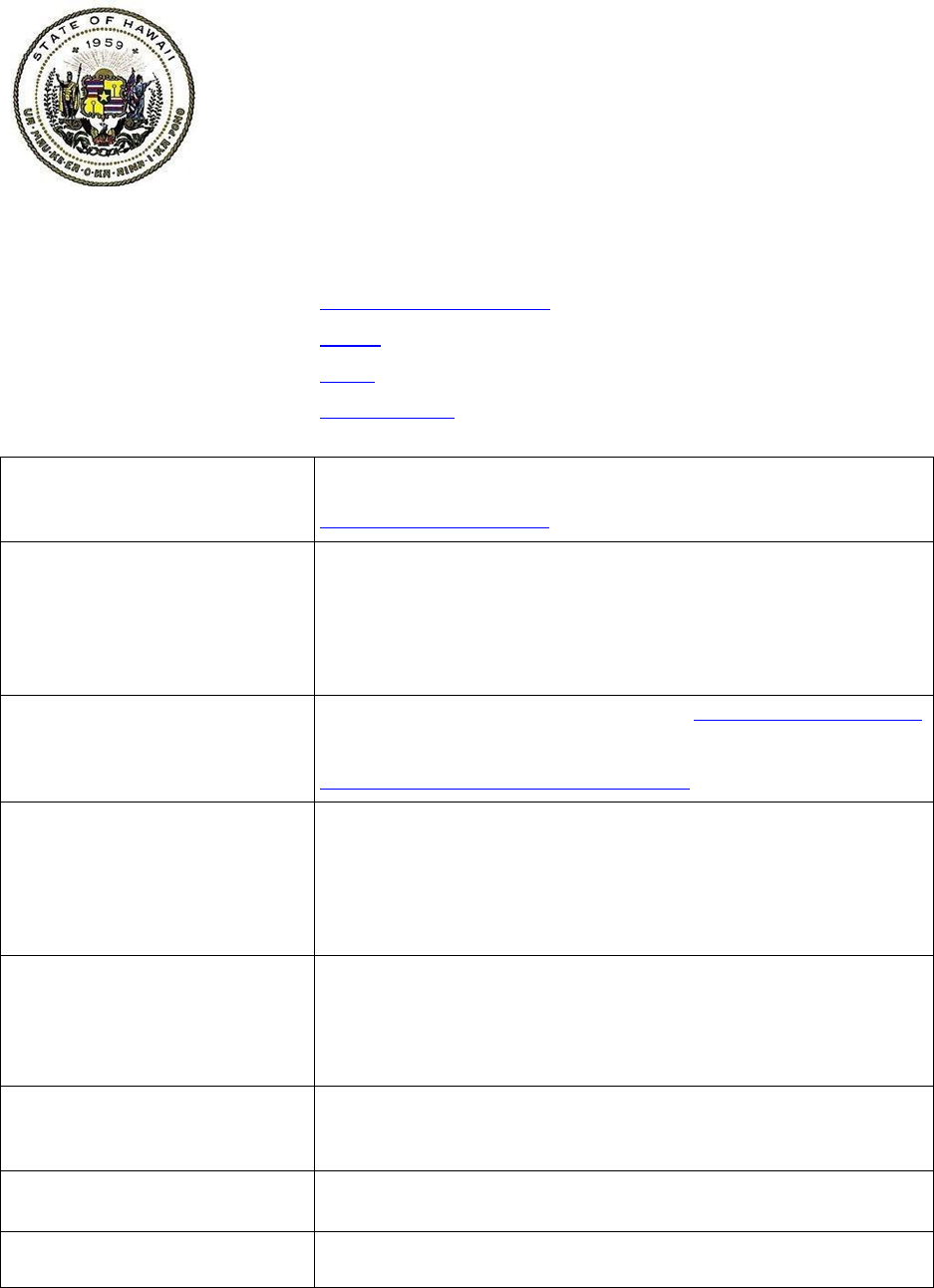
43
HAWAII
Hawaii Department of Taxation
P.O. Box 259
Honolulu, HI 96809-0259
Member of Federal/State E-File program
General Information: (808) 587-4242, (800) 222-3229
Website: Department of Taxation
Forms: Forms
Electronic Filing: E-file
Status of Refund: Refund Status
E-File Information
Only Form N-11 (residents) can be filed online. All other forms, including
Form N-15 (non-residents) must be filed on paper.
https://hitax.hawaii.gov/_/#1
Who must file? Full year residents under 65 must file if their income is over $3,344 for single
and married filing separately; $4,356 for head of household, $5,544 for
qualifying widow(er)s and $6,688 for married filing jointly. Non-residents
must determine their filing threshold by multiplying the appropriate
threshold number from above by the ratio of their Hawaii adjusted gross
income to their total adjusted gross income from all sources.
What forms to file? Residents file Form N-11 (online: https://hitax.hawaii.gov/_/#1,
downloadable: https://tax.hawaii.gov/forms/a1_b1_1income/). Part-Year
and Nonresidents file Form N-15 (downloadable only
https://tax.hawaii.gov/forms/a1_b1_1income/).
Requirements for Residency
Follows General Residency Rules. For non-military, being in Hawaii for
more than 200 days in one year creates a rebuttable presumption that the
person is a Hawaii resident. For military spouses, if a non-military spouse
came to Hawaii because their military spouse is stationed in Hawaii and
intends to leave when their military spouse is reassigned, that non-military
spouse is a nonresident of Hawaii.
Exemptions For residents, the personal exemption is $1,144 per person. Non-residents
must multiply $1,144 by the ratio of their Hawaii adjusted gross income to
their total adjusted gross income from all sources to obtain their personal
exemption. Hawaii continues to have a personal exemption even though it
has been suspended for federal income tax purposes until 2025.
Military Reserve or Hawaii National
Guard Pay
Residents can exclude up to $7,152 of military reserve or Hawaii National
Guard pay; and non-residents who pay taxes on their military reserve or
Hawaii National Guard pay in Hawaii can also exclude this amount.
Spouses and Community Property Not a community property state. Spouses must use the same filing status for
Federal and Hawaii.
Income Exclusions Non-military spouses: under the federal Military Spouses Residency Relief
Act (MSRRA), the
income of a non
-
military spouse of a service member for

Hawaii
44
services performed in Hawaii is exempt from Hawaii income tax if (a) the
service member is in Hawaii because of military orders, (b) the spouse lives
solely in Hawaii to live with her service member spouse and (c) the spouse
has a different domicile than Hawaii.
Service members: All non-military income earned in Hawaii is subject to
Hawaii income tax.
Income Deductions
For residents, the standard deduction is $2,200 for single or married filing
separately; $4,400 for married filing jointly, or qualifying widow(er); and
$3,212 for head of household. Non-residents must multiply the appropriate
number from above by the ratio of their Hawaii adjusted gross income to
their total adjusted gross income from all sources to obtain their standard
deduction.
Capital Gains/Losses Short term capital gains are taxed as ordinary income. Long term capital
gains are taxed at 0%, 15% or 20%, depending on the taxpayer’s taxable
income and filing status.
Retirement Income Military retirement pay is excluded from income.
Deadline/Extensions The due date for filing both a Form N-11 and Form N15 is April 20, 2022.
The taxpayer is automatically granted a 6-month extension to file (no form
needed). However, the taxpayer must pay any taxes due by April 20, 2022.
Same-sex marriage and civil unions As with federal law, same sex spouses are married for all tax purposes.
Unlike federal law, participants in a civil union in Hawaii are considered
married for all tax purposes, provided that their relationship meets Hawaii’s
eligibility requirements, the couple has complied with the laws of the state in
which the civil union was entered and the civil union can be documented.
Return to Table of Contents

45
IDAHO
Taxpayer Services
Idaho State Tax Commission
P.O. Box 36
Boise, ID 83722-0410
Member of Federal/State E-File program
General Information: (208) 334-7660, (800) 972-7660
Website: Idaho State Tax Commission
Forms: Forms and Instruction Booklet
Refund Status: Refund Status
E-File Help Desk: (208) 334-7660 (Boise area), (800) 972-7660 (toll-free);
Can’t register, can’t file a return, or can’t make a payment,
email: [email protected];
Too many password attempts, authorization code problem, or
can’t upload a file, email: [email protected];
Idaho filing addresses:
Return (with or without payment)
With payment if mailed separately from
return
Idaho State Tax Commission
Idaho State Tax Commission
PO Box 56
PO Box 83784
Boise, ID
83756
-
0056
Boise, ID 83707
-
3784
E-File Information If you choose to e-file, you must use the same provider to file both your
federal and state returns. You may file full-year, part-year, or nonresident
forms. Idaho does not require a Form 8453.
All forms you filed electronically and any supporting documents should be
retained for 3 years.
Who must file? Every Idaho resident who must file a federal income tax return.
Every part-year resident with a total of more than $2,500 gross income from
all sources while a resident, and Idaho sources while a nonresident.
Every nonresident with more than $2,500 gross income from Idaho sources.
See pages 2-3 of Individual Income Tax Forms and Instructions for filing
requirements by income amount.
What forms to file? Full-year Idaho residents and Idaho residents stationed outside of Idaho use
Form 40.
Part-year and Nonresidents with income subject to Idaho income taxation,
and non-resident military stationed in Idaho use Form 43.
Requirements for Residency
You are an Idaho resident, even though you live outside Idaho, if all of the
following are true:

Idaho
46
You think of Idaho as your permanent home.
Idaho is the center of your financial, social, and family life.
Idaho is the place you intend to return to when you are away.
You are also an Idaho resident if the following are true:
You maintained a home in Idaho the entire year, and
You spent more than 270 days in Idaho during the tax year.
You are a nonresident if your permanent home is outside of Idaho all year.
You are a part-year resident if you moved into or out of Idaho during the tax
year.
You are still a resident if:
You temporarily moved outside of Idaho, or
You moved back to Idaho after a temporary absence.
The domicile of a qualified service member is presumed to be that service
member’s military home of record until such time as the service member
established a new domicile.
Idaho resident on active duty stationed in Idaho
If Idaho was your military home of record and you were on active duty
stationed in Idaho, all of your military wages and all nonmilitary income,
regardless of the source, are subject to Idaho tax. File Form 40.
Idaho resident on active duty stationed outside of Idaho
If you joined the armed forces while a resident of Idaho and Idaho is
your military home of record; and
You were on active duty for 120 or more consecutive days; and
You were stationed outside of Idaho for all or part of the year, you must
report all of your income to Idaho. However, only military wages you
receive while stationed in Idaho and all nonmilitary income, regardless
of the source, is subject to Idaho tax.
File Form 40 if you are single, or if you are married and your spouse is also
a resident of Idaho. File Form 43 if you are married and your spouse is a
nonresident, part-year resident, or military nonresident of Idaho. Check the
“Idaho Resident on Active Military Duty” residency status box for yourself.
Check the applicable residency status box for your spouse.
Military Pay The residency of a qualified service member is presumed to be that member’s
military home of record. If Idaho was your military home of record and you
were on active duty stationed in Idaho, all of your military wages and all
nonmilitary income, regardless of the source, are subject to Idaho tax. An
Idaho resident on active duty stationed outside of Idaho for 120 or more
consecutive days can subtract this income, use Form 40 and Form 39R.
Combat Zone Exemption: Idaho follows federal law and provides income tax
relief for service members on active duty in combat zones. If you’re an
enlisted member or warrant officer, you don’t owe tax on military pay
received for any month in which you served in a combat zone. If you’re a
commissioned officer, the monthly exclusion is capped at the highest enlisted
pay, plus any hostile fire or imminent danger pay received. The excluded pay
should not be included in the Box 1 wages reported on your Form W-2.
Under the Service members Civil Relief Act, a service member will neither
lose nor acquire a residence or domicile with regard to his income tax as a
result of being absent or present in a state due to his military orders. A

Idaho
47
qualified service member is not a resident of or domiciled in Idaho solely as
a result of being stationed in Idaho.
Nonresident on active duty stationed in Idaho. If your military home of
record isn’t Idaho and you were on active duty stationed in Idaho for all or
part of the year, Idaho doesn’t tax your military income. However, all other
types of income from Idaho sources are subject to Idaho tax. File Form 43 if
your gross income from Idaho sources is more than $2,500.
Examples of Idaho sources of income include: (1) Idaho nonmilitary salaries,
wages, and commissions; (2) income from unincorporated business activity
conducted in Idaho, unless the business is a personal service business of the
spouse; (3) distributive share of income or loss from a partnership or S
corporation transacting business in Idaho; (4) rents and royalties from real
and tangible personal property located in Idaho; (5) sale or exchange of Idaho
real property; and (6) winnings from lottery tickets purchased in Idaho.
Spouses and Community Property Idaho is a community property state. Idaho’s community property laws
generally treat property and income acquired during marriage differently
than other property. For more information visit tax.idaho.gov/commprop.
Federal Military Spouses Residency Relief Act: The earned income of
qualifying spouses of Idaho service members is not subject to Idaho income
tax due to the federal Military Spouses Residency Relief Act (SR 475, HR
1182). As a service member’s spouse, you may qualify for this income tax
exemption if: (1) You are married to a service member who is serving in
Idaho and the service member has registered their military home of record in
another state; and (2) You have moved to Idaho with the service member and
you have the same domicile (permanent residence) as the service member’s
military home of record.
Income Exclusions Idaho doesn’t tax Social Security benefits and railroad retirement benefits.
Income Deductions You may claim the Idaho standard deduction even if you itemized deductions
on your Federal return. However, you must itemize if: (a) you are married,
filing separately and your spouse itemizes; or (b) you had dual status as a
nonresident alien for part of 2021 and during the rest of the year, you were a
resident alien or a U.S. citizen. Standard deductions are $12,500 for single or
married filing separately; $18,800 head of household; $254,100 married
filing jointly or qualifying widow(er).
Capital Gains/Losses Idaho Capital Gains Deduction: If you had capital gain net income from the
sale of qualified Idaho property, you may be able to deduct 60% of the capital
gain net income report on federal Schedule D. For a list of Idaho property
that qualifies for this deduction, see page 2 of the Idaho Form CG,
Instructions for Idaho Form CG, General Information. Note: Gains from the
sale of stocks and other intangible property do not qualify for this deduction.
Complete Idaho Form CG to compute your capital gains deduction.
Retirement Income If you are at least age 65, or if you are disabled and at least age 62, you may
be able to deduct some of the qualifying retirement benefits and annuities
you receive. Qualified retirement benefits must be one of the following:
Civil Service Employees: Retirement annuities paid by the United
States of America Civil Service Retirement Systems (CSRS), the
Foreign Service Retirement and Disability System (FSRDS), or the
offset programs of these two systems;
Service Members: Retirement benefits paid by the United States
to a retired military member of the U.S. military;

Idaho
48
Police Officers of an Idaho City: Retirement benefits paid from the
Policemen’s Retirement Fund that no longer admits new members
and benefits paid by the Public Employee Retirement System of
Idaho (PERSI) relating to Idaho policy officer employment not
included in federal Social Security retirement system; or
Idaho Firefighters: retirement benefits paid by the PERSI relating
to the Firemen’s Retirement Fund.
You may deduct up to $56,664 if filing married filing jointly, or $37,776 if
single, filing single You may not take any deductions if you file married
filing separately. For more information, see the instructions for Form 39R.
Deadline/Extensions Due on or before April 18, 2022.
You get an automatic 6-month extension to file your return so long as you
have paid at least 100% of what you paid for state income taxes the year
before, or 80% of your current year’s tax liability.
All tax filing deadlines are extended for at least 180 days after your last day
in a combat zone. If you pay your income tax in full by the end of the deferral
period, you won’t pay interest or penalty for tax period.
Notes Taxpayers who have income subject to taxation by Idaho and another state
may be entitled to a credit for income tax paid to the other state. See page 9
of Individual Income Tax Forms and Instructions for Forms 40, 39R, 43, and
39NR. Use Form 39R to calculate the credit. Use a separate Form 39R for
each state to compute the credit and include a copy of the other state’s income
tax return. Nonresidents cannot claim this credit.
New for 2021: Effective January 1, 2021, all tax rates have been decreased.
Individual income tax rates now range from 1% to 6.5%, and the number of
tax brackets has been reduced from seven to five.
Conformity: Idaho conforms to the IRC as of January 1, 2021. Idaho doesn’t
conform to bonus depreciation for assets acquired after 2009.
State and Local Tax Workaround Allowed: A pass-through entity can elect
to pay Idaho tax at the entity level as a workaround for the $10,000 limit on
the federal deduction for state and local taxes.
Savings Accounts for First-time Home Buyer: Idaho has a deduction for
contributions to a savings account for a first-time home buyer. Taxpayers can
deduct up to $15,000 ($30,000 if married filing a joint return). See
Instructions for Forms 39R and 39NR for details.
The adoption expenses deduction is a maximum of $10,000 per adoption.
Filing requirements based on
Federal Filing Status
A service member’s Idaho income tax filing status must be the same as
his/her federal filing status as that used on her federal income tax return. For
example, if a service member files a joint federal return, he/she must also file
a joint Idaho return.
Same-Sex Marriage Per the Supreme Court in Obergefell v. Hodges, June 26, 2015, same-sex
married filers have same filing options as heterosexual married filers. The
filing status used on an ID return must be the same as that used on the federal
form
Return to Table of Contents

49
ILLINOIS
Illinois Department of Revenue
Willard Ice Building
101 W. Jefferson Street
Springfield, IL 62702
Member of Federal/State E-File program
General Information: 800-732-8866 or 217-782-3336
Web site: Illinois Department of Revenue
Forms: Forms
E-File Help Desk: 1-866-440-8680
Where’s my Refund? Electronic Inquiry
State filing addresses:
Payment enclosed: No payment enclosed:
Illinois Department of Revenue
Springfield, IL 62726-0001
Illinois Department of Revenue
Springfield, IL 62719-0001
E-File Information Individuals may e-file IL returns electronically for free beginning January
24, 2022 at: E-File
The majority of returns, over 80%, are already filed electronically.
Electronically filed returns are processed more quickly, resulting in fewer
errors and faster refunds to taxpayers. For questions contact Illinois
Department of Revenue E-file Section at (866) 440-8680. Regulations on
electronic returns, Title 86: Part 760 and Section 760.100.
Opt-out Information: If your client refuses to allow you to electronically
file their return, you can remain in compliance with the mandate by having
your client complete and sign Form IL-8948, Electronic Filing Opt-Out
Declaration. Retain all Forms IL- 8948 you receive from your clients in
your files for three years. The Department may request copies at any time.
Who must file?
An Illinois resident, you must file Form IL-1040 if:
o You were required to file a federal income tax return, or
o You were not required to file a federal income tax return, but
your Illinois base income from Line 9 is greater than your
Illinois exemption allowance.
An Illinois resident who worked in Iowa, Kentucky, Michigan, or
Wisconsin, you must file Form IL-1040 and include as Illinois income
any compensation you received from an employer in these states.
Compensation paid to Illinois residents working in these states is taxed
by Illinois. Based on reciprocal agreements between Illinois and these
states, these states do not tax the compensation of Illinois residents.
o If your employer in any of these states withheld that state’s
tax from your compensation, you may file the correct form
with that state to claim a refund. You may not use tax withheld

Illinois
50
by an employer for these states as a credit on your Illinois
return.
A retired Illinois resident who filed a federal return, you must file
Form IL-1040. However, certain types of retirement income ( e.g.,
pension, Social Security, railroad retirement, governmental deferred
compensation) may be subtracted from your Illinois income. For more
information, see the instructions for Line 5 and Publication 120,
Retirement Income.
A part-year resident , you must file Form IL-1040 and Schedule NR,
Nonresident and Part-Year Resident Computation of Illinois Tax, if”
o You earned income from any source while you were a
resident,
o You earned income from Illinois sources while you were not
a resident, or
o You want a refund of any Illinois Income Tax withheld.
A nonresident, you must file Form IL-1040 and Schedule NR if:
o You earned enough taxable income from Illinois sources to
have a tax liability (i.e., your Illinois base income from
Schedule NR, Step 5, Line 46, is greater than your Illinois
exemption allowance on Schedule NR, Step 5, Line 50), or
o You want a refund of any Illinois Income Tax withheld in
error. You must attach a letter of explanation from your
employer.
NOTE: If you are a nonresident and your only income in Illinois is from
one or more partnerships, S corporations, or trusts that withheld enough
Illinois Income Tax to pay your liability, you are not required to file a Form
IL-1040.
An Iowa, Kentucky, Michigan, or Wisconsin resident who worked
in Illinois, you must file Form IL-1040 and Schedule NR if
o you received income in Illinois from sources other than
wages, salaries, tips, and commissions, or
o you want a refund of any Illinois Income Tax withheld.
If you received wages, salaries, tips, and commissions from Illinois
employers, you are not required to pay Illinois Income Tax on this income.
This is based on reciprocal agreements between Illinois and these states.
The reciprocal agreements do not apply to any other income you might have
received, such as Illinois lottery winnings.
What forms to file? All taxpayers file IL Form 1040; nonresidents file Schedule NR and IL
Form 1040.
Requirements for Residency You are an Illinois resident if you reside in Illinois or have a legal domicile
in Illinois but are absent for a temporary purpose during the tax year.
Temporary absences include performing active duty in the armed forces
while being stationed outside the state, even for considerable periods of
time. If you are a member of the armed forces, you are not a resident of
Illinois if you are present in Illinois only because of your military
assignment. If you are a spouse of a service member, you are not a resident
of Illinois if you are a resident of the same state as your spouse and you are
present in Illinois only to accompany your spouse on his or her military
assignment. In either case, you have the option of remaining a nonresident
of Illinois, regardless of how long you are present in the state, but you may
choose to establish residency in Illinois.

Illinois
51
If you are a resident of another state and come to Illinois only because of a
military assignment, you will remain a nonresident of Illinois regardless of
how long you are in Illinois unless you elect to become an Illinois resident.
If you were domiciled in Illinois at the time you joined the armed forces or
elected to change your residence to Illinois after being stationed here, you
will remain an Illinois resident as long as you remain in the armed forces,
unless you elect to become a resident of another state where you are
stationed. For more details on IL residency as it pertains to military
personnel and spouses, please see IL Publication 102, Illinois Filing
Requirements for Military Personnel, at: Publication 102.
Exemptions Personal exemption is $2,375 per person.
Military Pay If you are an Illinois resident or part-year resident, you are required to
file an Illinois return if you are required to file a federal return, or your
Illinois base income is greater than your Illinois exemption allowance. If
you are an IL resident, you must file Form IL-1040, Individual Income Tax
Return. Your military pay will generally be included in your federal
adjusted gross income (AGI) on Form IL-1040, Line 1. If you are a part-
year resident, you must file Form IL-1040 and Schedule NR. Your military
pay will generally be included in the Illinois portion of your AGI on
Schedule NR. On Schedule NR, Step 3, Column B, you must include all
income earned while a resident regardless of whether such income is earned
from Illinois sources, and all income earned from Illinois sources while a
nonresident.
When filing, you may subtract tax-exempt military pay that is in your AGI,
including pay for duty in the armed forces, including basic training, pay for
duty as a cadet at the U.S. Military, Air Force, and Coast Guard academies,
as a midshipman at the U.S. Naval Academy, or in ROTC, and pay for duty
for serving in the U.S. Armed Forces Reserves or a National Guard unit,
including a National Guard unit of another state.
You may not subtract military income (such as combat pay) that you
excluded from your AGI on Form IL-1040, Line 1; pay you received under
the Voluntary Separation Incentive; pay you received from the military as
a civilian; payments you made under the Ready Reserve Mobilization
Income Insurance Program; or pay for duty as an officer in the Public
Health Service.
If you are a nonresident, you are not required to report military pay to
Illinois. However, you must file an Illinois return if you have earned enough
taxable income from Illinois sources to have a tax liability (i.e., your Illinois
base income from Schedule NR, Nonresident and Part-Year Resident
Computation of Illinois Tax, is greater than your Illinois exemption
allowance from Schedule NR).
For more information, see IL Publication 102. Use Schedule M, Other
Additions and Subtractions for Individuals to subtract military pay earned
that is included in adjusted gross income.
Spouses and Community Property Not a community property state. If one spouse is a resident and the other a
nonresident, the resident spouse may elect to file a separate IL income tax
return. Follows Military Spouses Residency Relief Act – See 2009
Schedule MR to determine residency status. Spouses’ wages exempt from
Illinois Income tax if residing in Illinois with military member/spouse who
is stationed in Illinois and both are residents of another state.
Income Exclusions
Government retirement plans, including military retired pay; Government
disability
plans; Social Security income; distributions from IRAs; and

Illinois
52
qualified employee benefit plans. For additional information see
Publication 120.
Income Deductions No standard deductions or itemized deductions are allowed.
Capital Gains/Losses Taxed as ordinary income. IL generally follows federal rules otherwise.
Retirement Income Retirement may be excluded on Form 1040, line 5. Includes military retired
pay. See Publication 120, Retirement Income, Publication 120.
Deadline/Extensions April 18, 2022. IL has an automatic extension length of 6 months. If the
filer receives a federal extension of more than 6 months, the filer is
automatically allowed that extension for Illinois. These extensions do
not provide an extension of time to pay any tax owed.
Notes IL residents may be entitled to claim a credit for property tax and K-12
education expenses paid. See instructions for Schedule ICR for credit
eligibility. For more information on property tax credit refer to Pub. 108,
Illinois Property Tax Credit at Publication 108.
Special Military Processing When completing Schedule M you may subtract tax-exempt military pay
that is included as income on the Form IL-1040 or Schedule NR.
What’s New See the Informational Bulletin for what’s new as this info is subject to
change.
Same-Sex Marriage and Civil Union Per the Supreme Court in Obergefell v. Hodges, June 26, 2015, same-sex
married filers have same filing options as heterosexual married filers.
Taxpayers in a Civil Union must file using the same status as on their
Federal return.
Return to Table of Contents

53
INDIANA
Indiana Department of Revenue
100 North Senate Ave
Indianapolis, IN 46204-2253
Member of Federal/State E-File program
General Information: (317) 232-2240
Web site: Indiana Department of Revenue
Forms: 2021 Forms
E-File Help Desk: (317) 615-2550
(This number for tax officers only - not for taxpayers)
Refund Status: (317) 232-2240 or at Refund Status
Taxpayer Advocate Office (317) 232-4692
E-File Information
Individuals can e-file the Form IT-40, IT-40PNR, or IT-40RNR online via
INfreefile.
Retain Form IT-8879 and required documents for a period of three years.
Who must file? Full year residents who received Indiana income in excess of their
exemption amounts must file a return. Indiana allows a $1,000 exemption
for the filer, a $1,000 exemption for the spouse (if filed jointly), and a
$1,000 for each eligible dependent. If Indiana income exceeds total
exemptions, an Indiana income tax return must be filed. Part year and
nonresidents who received ANY Indiana-source income must file an
Indiana return.
What forms to file? Full year residents file Form IT-40. Part year and nonresidents who do not
qualify to file Form IT-40RNR file Form IT-40PNR. IT-40RNR is for
residents of KY, MI, OH, PA, and WI who work in IN. Individuals must
also complete Schedule CT-40 if the county of residence imposes tax.
Requirements for Residency A taxpayer is a full-time resident if legal residency in IN is maintained
from Jan. 1 through Dec. 31 of the tax year. Legal residency is established
either (1) if a taxpayer spends 183 days or more in Indiana during a year,
or (2) if a taxpayer is domiciled in Indiana. The taxpayer need not be
physically present in the state during the entire year to be a full-time
resident.
Military personnel assigned outside the state remain full-time residents
unless they take steps to establish residency in another state. Retirees who
spend winter months in another state remain full-time residents if they
maintained legal residency in IN and intend to return to the state during
part of the tax year. Other factors indicating that Indiana will treat a
taxpayer as a resident include if: they maintain their driver’s license; they
remain registered to vote in IN; or they have a homestead deduction in IN.
Military personnel who changed residency from IN to another state (or
from another state to IN) during the tax year are part-time residents and
must file Form IT-40PNR and attach a copy of Form DD2058, State of
Legal Residence Certificate.

Indiana
54
COUNTY TAX
Servicemembers are subject to their local county tax, except if the
Servicemember maintains a household outside the state of IN. If so, write
county code “00” (out-of- state) in all the county boxes on the IT-40. If,
however, the Servicemember maintains a home in an Indiana county and/or
his or her spouse and family were still living in an Indiana county on Jan.
1, 2021, the Servicemember is considered to be a resident of that county
and will be subject to county tax.
Exemptions Note: Indiana still allows regular and dependent exemptions. Previously,
the filer would just enter the number claimed on the federal tax return. New
instructions are on page 23 of the IT-40 Booklet. Indiana allows $1,000 for
each exemption claimed on the federal return (if you are married filing
jointly, enter $2,000), plus $1,500 for each dependent child. For purposes
of this exemption, a “dependent child” is a son, stepson, daughter,
stepdaughter, or foster child under the age of 19 or a full-time student under
24. An additional $1,000 exemption applies if the taxpayer and/or spouse
are 65 or older. Another $1,000 exemption applies if the taxpayer and/or
spouse are legally blind. For taxpayers 65 or older who earn less than
$40,000 per year, an additional $500 of income is exempt. See Schedules 3
and 4 on the 2021 Forms page.
Military Pay
Individuals may deduct up to $5,000 of military pay; however, the
deduction is not to exceed the amount of military pay received. Dual
military couples filing jointly may deduct up to $10,000. For more
information see Pages 16 and 20-21 of the IT-40 Booklet.
Military income earned while in a combat zone in not taxable and is
therefore NOT eligible for the military pay deduction.
Special Deduction for National Guard and Reserve Pay Income: There is
a deduction available for certain members of the Reserve components of
the Army, Navy, Air Force, Coast Guard, Marine Corps or the Merchant
Marine, or a member of the Indiana Army National Guard or the Indiana
Air National Guard for their full amount of income earned (excluding
income earned while in a combat zone). A deduction is available for the
military wages paid for the period of the member’s full-time service on
involuntary orders in a Reserve component of the armed forces or the
period when Indiana National Guard unit was federalized. These service
members are entitled to deduct the amount of their qualified military
income that was not excluded from their gross income for federal income
tax purposes. Military withholding statements must be enclosed with the
tax return when claiming this deduction.
Note: Individuals cannot claim both this deduction and the Military
Service Deduction based on the SAME income.
Military withholding statements must be attached to the tax return when
claiming this deduction (enter code #621 on Schedule 2 under line 11 if
claiming this deduction). For additional information see Individual
Income Tax Booklet (IT-40 Booklet) available at 2021 Forms.
Spouses and Community Property Indiana is not a community property state. When a resident spouse files
jointly with a part-year or nonresident spouse, they must use IT-40PNR.
The resident must follow federal filing status election on their Indiana
return. Indiana adjusted gross income tax does not apply to the earned
income of a non-domiciled spouse of an armed forces member.
Under the Federal Military Spouses Residency Relief Act, the spouse of an
armed forces member is exempt from Indiana income taxation on Indiana-
source earned income when: (1) The spouse currently is domiciled in a
state

Indiana
55
other than Indiana; (2) The spouse resides in Indiana solely in order to live
with the armed forces member; (3) The armed forces member is present in
Indiana in compliance with military orders; and (4) The spouse and the
armed forces member both are able to claim the same domicile.
Nonresident military spouses must file Schedule IN-2058SP (State Form
54259) and attach it when filing their IT-40 PNR. This schedule can be
accessed by clicking on “IN-2058SP” under the “Other Individual Tax
Forms/Schedules” at 2021 Forms.
Income Deductions Indiana deductions are listed and explained on pages 15–18 of the
Individual Income Tax Booklet available on the 2021 Forms page. Use
Schedule 2 to take these deductions. Items deductible from income
include: income from Social Security; certain Indiana lottery winnings;
renter's deduction of up to $3,000 of rent paid on principal residence;
homeowner's deduction of residential property tax of up to $2,500;
interest on US government obligations; and state tax refund reported as
income on federal Form 1040.
See above “Military Pay” and “Spouses and Community Property” for
information on additional military deductions.
Capital Gains/Losses They are taxed as ordinary income. Indiana follows federal guidelines on
determining the status of capital gain or loss.
Retirement Income
If you are retired from the military or are the surviving spouse of a person
who was in the military, you may take the Military Retirement Income
and/or Survivor’s Benefits deduction of $6,250, plus 50% of the benefits
that exceed $6,250. If both spouses received retirement income and/or
Survivor’s Benefits, the maximum deduction is $12,500, plus 50% of each
recipient’s benefits above $6,250. See
page 20–21 of the IT-40 Booklet. Note that taxpayers must enclose their
military retirement income statement(s) and/or survivor’s benefits
statement(s) with the tax return.
Deadline/Extensions
April 18, 2022.
You must get an extension of time to file if you:
•
Are required to file (your income is more than your exemptions), and
•
You cannot file your tax return by the April 18, 2022 due date.
Whether you owe additional tax, are due a refund, or are breaking even,
you still need to get an extension if filing after April 12, 2022. While
Indiana does not assess penalties for claiming a refund late, failure to file
may cause them to file a return for the taxpayer (often assessing tax that is
not truly owed).
Note. Indiana’s extension of time to file, Form IT-9, now extends the filing
date to November 14, 2022.
Consult pages 7 and 8 of IT-40 Booklet for further extension
instructions.
Special Military Processing Military personnel on duty outside of the United States and Puerto Rico on
the filing due date are allowed an automatic 60-day extension of time to
file. A statement must be enclosed with the return verifying that you were
outside of the United States or Puerto Rico on April 15, 2021. Military
personnel in a presidentially declared combat zone have an automatic
extension of 180 days after they leave the combat zone. In addition, if they
are hospitalized outside the United States because of such service, the 180-
day extension period begins after being released from the hospital. The
spouse of such service member must use the same method of filing for both
federal and Indiana returns (e.g. single or joint). When filing the return,

Indiana
56
write “Combat Zone” across the top of the form (above your Social Security
number). Note: Valid extensions are only for filing purposes.
Interest will be due on any tax that remains unpaid during the extension
period.
Same sex Marriage
Per the Supreme Court in Obergefell v. Hodges, June 26, 2015, same-sex
married filers have the same filing options as heterosexual married filers.
Couples in same-sex marriages should file with Indiana using the same
married filing status as they used for federal tax filing purposes.
Return to Table of Contents

57
IOWA
Iowa Department of Revenue
Iowa Income Tax Document Processing
P.O. Box 9187
Des Moines, IA 50306-9187
Member of Federal/State E-File program
General Information: (515) 281-3114; (800) 367-3388; (866) 339-7912 (for
Payments, Billings, & Collections)
Website: Department of Revenue
Forms: 2021 Forms
Refund Status (515) 281-3114 (800) 367-3388 or via web at Refund Status
Iowa Electronic Filing
Guide:
E-filing Options
Additional Resource: AARP Iowa Tax-Aide
E-File Information Iowa electronic filing options can be found at: E-File Options
Send rejected returns and paper returns to:
1) Mailing address: Iowa Income Tax Document Processing, PO Box
9187, Des Moines, IA 50306-9187;
2) Deliver in Person: Hoover State Office Building, 1st Floor, 1305 E.
Walnut, Des Moines, IA 50319.
RECORD KEEPING
Iowa income tax returns, federal returns, and all relevant schedules should
be kept for at least ten years after filing the return.
Who must file? Instructions on who must file are available here. You must file an Iowa
return if you were a resident or part-year resident of Iowa in 2021 and meet
any of the following requirements:
a. You had a net income (line 26 of the IA 1040) of more than $9,000
and your filing status is single ($24,000 if 65 or older on 12/31/21).
b. You had a net income (line 26 of the IA 1040) of more than $13,500
and your filing status is other than single ($32,000 if you or your
spouse is 65 or older on 12/31/21).
c. You were claimed as a dependent on another person’s Iowa return and
had a net income (line 26 of the IA 1040) of $5,000 or more.
d. You were in military service with Iowa shown as your legal residence,
even though stationed outside of Iowa (unless you are below the above
income thresholds). For information about military spouses, see
information on Tax Responsibilities of Military Personnel.
e. You were subject to Iowa lump-sum tax.
f. You were a nonresident or part-year resident and your net income from
Iowa sources (line 26 of the IA126) was $1,000 or more, unless below
the income thresholds above. In the case of married nonresidents, the
spouses
’
combined income is used to determine if their income is high

Iowa
58
enough to require them to file an Iowa return. To understand “Iowa-
source income,” see the instructions for lines 1-26 of the IA 126.
g. You were a nonresident or part-year resident and subject to Iowa lump-
sum tax or Iowa minimum tax (even if Iowa-source income is less than
$1,000).
Note: In meeting the filing requirements below, you must add back:
the pension exclusion (line 21, IA 1040)
the reportable Social Security amount from step 4, IA 1040
any amount of lump sum distribution separately taxed on federal form
4972, and
any net operating loss carryover
Note to married couples: Incomes of both spouses must be included when
determining who must file.
What forms to file? All filers use IA 1040; Part-year and nonresidents should also use IA 126,
Nonresident and Part-Year Schedule. Instructions for this schedule are
included in the IA 1040 Instructions.
Requirements for Residency
A servicemember is an Iowa resident if he or she was a resident of Iowa at
the time of enlistment, Iowa is declared as his or her “military home of
record,” or the servicemember has taken positive action to establish Iowa
residency. If a servicemember is an Iowa resident, he or she must file an
Iowa individual income tax return if they:
are married and their combined income* totals more than $13,500
($32,000 if filer or spouse is 65 or older on 12/31/2021)
are single and total income* is more than $9,000 ($24,000 if 65 or
older on 12/31/2021)
have income* of $5,000 or more and are claimed as a dependent on
another person’s Iowa return
file as head of household or qualifying surviving spouse) and total
income* is more than $13,500 ($32,000 if filer or spouse is 65 or older
on 12/31/2021)
*Does not include pay received from the federal government for military
service performed by members of the armed forces, armed forces military
reserve, and the national guard in an active duty status.
School District Surtax: The school district surtax is applicable for resident
members of the armed forces of the United States living in an Iowa school
district, even if the member is not physically present in Iowa on the last day
of the tax year. (IAC 42.1)
Exemptions Iowa uses a Personal Tax Credit of $40 per person, rather than an
exemption. An additional $20 per person credit applies if the taxpayer
and/spouse is aged 65 or older or blind. See Exemption Credits for more
details.
Military student loan repayments included in federal adjusted gross income
are exempt from Iowa income tax if the person is in the armed forces, or
armed forces military reserve, or National Guard; and the individual was on
active duty at the time of the loan repayment. Include the loan repayment
amount in line 1 and deduct it in line 24.
Military Pay
Active Duty Pay: Members of the armed forces, armed forces military
reserve, and the National Guard in an active duty status (as defined in Title
10 of the U.S. Code) can exclude pay received from the federal government
for military service performed.
Active
-
duty military service pay is taxable

Iowa
59
only by the state in which the armed forces service member is a legal
resident, which is usually the state of residence at the time he/she enters the
service. In general, income other than active-duty military service pay of an
Iowa resident in military service is taxable to the same extent as it is taxable
for federal purposes, even if the Iowa resident is stationed outside of Iowa
or outside of the United States.
Servicemembers who are Iowa residents should include the active duty pay
received from the federal government for military service performed as
income on line 1 of the IA 1040, and deduct the same active duty pay on
line 24. These individuals should provide an IA W-4 to the payer of this
income, claiming exemption from withholding on active duty pay.
Servicemembers who are NOT residents of Iowa are required to file Iowa
income tax returns if their all-source income meets the above requirements
and their Iowa-source income is $1,000 or more. Nonresident
servicemembers do not include military compensation on line 1 of the IA
1040, and also do not report is Iowa income on the IA 126.
Combat Zone Pay: Income excluded by the federal government is also
excluded for Iowa income tax purposes. For example, combat zone pay is
excluded on the Iowa return because it is excluded for federal income tax
purposes.
There is also an income tax exemption for active duty pay received from a
source other than the federal government by a person in the National Guard
or armed forces military reserve for service performed on or after January 1,
2003, pursuant to military orders for Operation Iraqi Freedom, Operation
New Dawn, Operation Noble Eagle, or Operation Enduring Freedom.
There is an income tax exemption for active-duty pay received from a
source other than the federal government by a person in the National Guard
or armed forces military reserve for services performed on or after August
2, 1990, pursuant to military orders related to the Persian Gulf Conflict
and/or for services performed on or after November 21, 1995, pursuant to
military orders related to peacekeeping in Bosnia-Herzegovina.
Spouses and Community Property Not a community property state.
Under the Military Spouses Residency Relief Act of 2009 (MSRRA) and
the Veterans Benefits and Transitions Act of 2018 (VBTA), the spouses of
servicemembers may be exempt from Iowa income tax on income from
services performed in Iowa if they are not residents of Iowa.
Servicemembers’ spouses are protected, by federal law, from losing their
home state residency simply by being absent from their home state in order
to be with the servicemember spouse who is elsewhere in compliance with
military orders. Federal law also protects servicemembers’ spouses from
establishing residency simply by being in another state where they are
located to be with the servicemember spouse pursuant to military orders.
Spouses covered by the MSRRA can establish new residency when they
take positive action to do so.
Under the MSRRA and Iowa law, a servicemember’s spouse’s income from
wages, salaries, tips, etc., may be excluded from Iowa income tax if:
the servicemember spouse is a member of the uniformed services
present in Iowa in compliance with his or her orders
the non-servicemember spouse is present in Iowa solely to be with
the servicemember spouse, and
the non-servicemember spouse is a resident of another state.

Iowa
60
Under the VBTA, a servicemember’s spouse’s income from wages,
salaries, tips, etc., may be excluded from Iowa income tax if:
the non-servicemember spouse elects to use the same residence as
the servicemember spouse for tax purposes.
Other income, like interest income or rental income, is included in a
nonresident spouse’s Iowa income and may be taxed in Iowa.
Military spouses please see this information on Iowa Tax Responsibilities
of Military Personnel.
Income Exclusions Principal and interest from bills, bonds, and notes issued by the United
States Treasury are exempt. Iowa taxes social security income differently
from the federal government. The instructions for the Form IA 1040 include
a worksheet to calculate the tax owed. See IA 1040 Expanded Instructions.
Income Deductions May itemize deductions or take standard deduction of $2,130 for single and
married filing separately, $5,240 for married filing jointly, head of
household, and qualifying widow(er)s with dependent child. Deductions
listed and explained here.
Capital Gains/Losses Taxed as ordinary income, but potentially allows for a capital gain
deduction. Iowa follows federal rules on exclusion of gain from the sale of
a principal residence. For information on the Iowa capital gain deduction,
see here.
Retirement Income Military retirement pay is not subject to Iowa income tax. Do not include
military retirement pay on line 9 of the IA 1040. See Pension/Retirement
Income Exclusion.
Deadline/Extensions If at least 90% of total tax liability is paid by
May 2, 2022, you have an
automatic additional six months to file the return—i.e., until October 31,
2022, to file the return. If you do so, you will not be charged a late file
penalty. However, you may owe a penalty for failure to make estimated
payments. Interest owed on any tax is still due after April 30.
See Extension Request for additional information.
Military Extensions: Qualifying individuals may be granted further
extensions for a further 180 days:
Active duty military servicemembers in the armed forces, armed
forces military reserve, or National Guard who are deployed
outside the United States
A person serving in support of those forces
A spouse of a person listed above if they file jointly or separately
on a combined return or if they are a party with the eligible
taxpayer to any other act related to the Department
An eligible individual who was continuously hospitalized because
of illness or injury in the combat zone
See here for requirements for qualifying individuals.
Special Military Processing Additional time period for filing state returns and performing other acts is
180 days for:
Individuals on active duty federal military service in the armed forces,
armed forces military reserve, or National Guard who are deployed
outside the United States.
A person in the military serving in support of those forces.
A spouse of a person listed above if they file jointly or separately on a
combined return.

Iowa
61
An eligible individual who was continuously hospitalized because of illness
or injury in the combat zone
Same-Sex Marriage Per the Supreme Court in Obergefell v. Hodges, June 26, 2015, same-sex
married filers have same filing options as heterosexual married filers.
Return to Table of Contents

62
KANSAS
Kansas Department of Revenue
Individual Income Tax
915 SW Harrison Street
Topeka, KS 66612-1588
Member of Federal/State E-File program
General Information: (785) 368-8222 or KDOR_t[email protected].
Website: Kansas Department of Revenue
Forms: (785) 296-4937 or Forms
Refund Status: (785) 368-8222 or Refund Status
Electronic Filing: For Kansas WebFile assistance (785) 368-8222 or
Kansas Filing Address:
INDIVIDUAL INCOME TAX
KANSAS DEPARTMENT OF REVENUE
PO BOX 750260
TOPEKA, KS 66699-0260
E-File Information Form KS 8453 has been eliminated. E-filing process = signature. E-filing
information is available here.
Who must file and when?
If taxpayer was a Kansas resident for the entire year, taxpayer must file a
Kansas individual income tax return if: (1) taxpayer is required to file a
federal income tax return; or (2) taxpayer’s Kansas adjusted gross income
is more than the total of taxpayer’s Kansas standard deduction and
exemption allowance.
If a resident is not required to file a federal return the resident must file if
their income exceeds the following: $5,750 for single; $6,250 for married
filing separate; $12,500 for married filing jointly; $10,500 for head of
household. See table on page 3 at 2021 Instruction Booklet for information
on filing amounts for those older than 65.
Nonresidents must file if they receive ANY Kansas income.
Individuals that resided in Kansas less than 12 months during the tax year
are part-year residents. Part-year residents must include the dates they
resided in Kansas on Form K-40 and complete Part B of Schedule S.
The due date for filing 2021 income tax returns is April 18, 2022. Kansas
follows the Internal Revenue Service due date for tax deadlines
What forms to file? All taxpayers file Form K-40. Use Schedule S to make modifications to
federal adjusted gross income. Modifications include deduction of military
retired pay. Nonresidents use Schedule S to allocate income between
Kansas sources (taxable) and non-Kansas sources (not taxable by Kansas).
See 2021 Schedule S.
Requirements for Residency Kansas defines its residents as anyone who lived in Kansas, regardless of
where employed. The SCRA precludes Kansas from considering military
personnel living in the state solely as a result of military orders from being
considered Kansas residents.

Kansas
63
Exemptions Exemption amount is $2,250 for each exemption claimed on the federal
return. Taxpayer filing as Head of Household is allowed one additional
exemption on Kansas return.
Military Pay The active and Reserve duty service pay of military personnel is taxable
ONLY by the state of legal residency, no matter where the service member
is stationed during the tax year. If the home of record in military records is
Kansas, and the service member has not established residency in another
state, they are still a Kansas resident and all income, including military
compensation, is subject to Kansas income tax.
If the service member is a nonresident of Kansas, but are stationed in
Kansas due to military orders, they must file a Kansas return if they received
income from Kansas sources. Only income from Kansas sources is used to
determine the Kansas income tax due for nonresident military service
members. Nonresident service members will subtract out the amount of
their military compensation on Schedule S, line A13.
Spouses and Community Property
Not a community property state. Must follow federal status – if married
filing jointly, must declare both incomes, then take tax credit for taxes paid
to other states at line 13 of Form K-40. If a taxpayer claims the credit for
taxes paid to other state(s), must attach the tax return and supporting
documents filed with the other state(s) to the Form K-40. Differing rules
apply in calculating this credit depending on whether the taxpayer is a
Kansas resident or nonresident.
MILITARY SPOUSES RESIDENCY RELIEF ACT. Kansas income for
services performed by a non-military spouse of a nonresident military
service member is exempt from Kansas income tax. To qualify for this
exemption, the non-military spouse must be residing in Kansas solely
because the military service member is stationed in Kansas under military
orders. Non-military spouses of service members stationed in Kansas will
subtract out their Kansas source income on Schedule S, line A13.
Income Deductions
Beginning with tax year 2021, individual taxpayers may choose to either
itemize or claim the standard deduction on the Kansas individual income
tax return, regardless of whether taxpayer itemized deductions or took the
standard deduction on the federal return. If taxpayer chooses to claim
itemized deductions, taxpayer will complete and file Kansas 2021 Schedule
A.
Standard deductions are as follows: single -$3,500; married filing jointly -
$8,000; head of household - $6,000; married filing separately - $4,000
Charitable contributions are 100% deductible. Complete Schedule A to
compute Kansas itemized deductions.
Capital Gains/Losses Taxed as ordinary income. Follows federal rules in determining amounts
constituting capital gains and losses.
Retirement Income May exclude military retired pay from income. Use
Schedule S,
line A12
to take advantage of this exclusion.
Deadline/Extensions
Tax return must be filed and tax paid no later than April 18, 2022.
Information on credit card payment Credit Card Payments and electronic
payments generally at E- payments.
Special Military Processing Kansas follows the IRS in automatically extending income tax deadlines
for 180 days after deactivation for filing returns, paying taxes, filing claims
for refunds, if any of the following situations apply:
Service in a combat zone or qualifying service outside of a combat
zone.

Kansas
64
Service in a qualified hazardous duty area or deployment overseas
away from permanent duty station in support of operations in a
qualified hazardous duty area, but deployment station is outside
the qualified hazardous duty area.
Service on deployment outside the United States away from your
permanent duty station while participating in a contingency
operation. A contingency operation is a military operation that is
designated by the Secretary of Defense or results in calling
members of the uniformed services to active duty (or retains them
on active duty) during a war or a national emergency declared by
the President or Congress.
If you qualify for deferment of taxes based on the criteria above and find
yourself in one or more of the following situations, then you should
complete Form KS-2848, Servicemember Mobilization Notice, and submit
it to the department:
You cannot file your income tax return and pay any tax due until
you return from deployment.
You have an existing debt with the department for taxes due and
are unable to pay while you are deployed.
You have received an assessment or a set-up return notice from
the department and will not be able to file your return and/or pay
the tax due until you return from deployment.
For your convenience, Form KS-2848 is available online as a “fill-in” form.
Send the completed form with a copy of the deployment orders to: Kansas
Department of Revenue, PO Box 750290, Topeka, KS 66699-0260.
Filing requirements based on
Federal Filing Status
Kansas filing status must be the same as the federal filing status*. If the
federal filing status is QUALIFYING WIDOW(ER) WITH DEPENDENT
CHILD, check the HEAD OF HOUSEHOLD box. If the Servicemember
files a joint federal return, they must file a joint Kansas return, even if one
of the filers is a nonresident. If separate federal returns are filed, separate
Kansas returns must be filed.
Miscellaneous Compensating Use Tax: Kansas has imposed a compensating use tax on
goods purchased from outside Kansas and used, stored, or consumed in
Kansas. This tax applies to the total cost of the merchandise, including
postage, shipping, handling, or transportation charges. It is the same as the
combined state and local sales tax rate in effect where the buyer takes
delivery in Kansas. For individuals, it is usually the home. Kansans that buy
goods in other states or through catalogs, internet, mail-order companies,
or from TV, magazine, and newspaper ads must pay Kansas use tax on the
purchases if the goods are used, stored, or consumed in Kansas and the
seller does not charge a sales tax rate equal to or greater than the Kansas
retailers’ sales tax rate in effect where the item is delivered or first used. To
pay Kansas use tax on your untaxed out-of-state purchases made during
calendar year 2021, refer to the instructions for line 20 of Form K-40. You
may use the chart or compute the tax due by applying the state and local
sales tax rate in effect for your address to the total purchases subject to the
tax. The Kansas Sales and Use Tax Address Tax Rate Locator is available
here.
School District No: Use the school district no. for the residence of the
taxpayer on 31 December 2021. Non-residents do not need to list a school
district. Table with 3-digit school district numbers can be found at Kansas
Unified School Districts and Abbreviations.

Kansas
65
Same-Sex Marriage Per the Supreme Court in Obergefell v. Hodges, June 26, 2015, same sex
married filers have same filing options as heterosexual married filers. A
lawfully married same-sex couple must file their Kansas individual income
tax return with the same filing status used to file their federal income tax
return.
Return to Table of Contents

66
KENTUCKY
Kentucky Department of Revenue
Taxpayer Assistance
501 High Street
Frankfort, KY 40601
Member of Federal/State E-File program
General Information: (502) 564-4581
Forms: (502) 564-4581 or KY Forms
Web site: KY Department of Revenue
IRS Processing Center: KANSAS CITY, MO (if no payment enclosed);
LOUISVILLE, KY (if enclosing payment)
Refund Status: KY Refund
E-Filing Help Desk: (502) 564-5370, or see KY Publ. 1345 [NOTE: This number
for processors]
E-File Information E-file Information
Who must file? The filing requirements of full-year or part-year residents is based on your
family size, modified gross income, Kentucky adjusted gross income and
income from self- employment. You must file if your modified gross
income exceeds $12,880 for a family size of one; $17,420 for a family size
of two; $21,960 for a family size of three; and $26,500 for a family size of
four or more (Chart A of the 2021 Instruction Booklet, found on page 9). If
modified gross income is greater than those amounts and your Kentucky
Adjusted Gross Income exceeds the amounts listed in Chart B on page 9 of
the 2021 Instruction Booklet, then you must file. Taxpayers with income
from self-employment must file if income is in excess of the listed modified
gross income thresholds based on family size of 1, 2, 3, or 4 or more. Note:
Even though the filing requirements are not met, an income tax return must
be filed to claim a refund of the Kentucky taxes withheld.
What forms to file? Full year residents: Form 740. Use Schedule M to make KY adjustments to
income and Schedule A (full year residents only) for KY itemized
deductions. Part year and nonresidents: Form 740 NP. Qualifying full-year
nonresidents from specified reciprocal states of Illinois, Indiana, Michigan,
Ohio, Virginia, West Virginia and Wisconsin, and who had Kentucky
income tax withheld and no other income from Kentucky sources, file Form
740-NP-R., Form 740-NP-R
Requirements for Residency A taxpayer qualifies as a Kentucky resident if he or she resided in the state
for the entire tax year. Military personnel on active duty who entered
service as Kentucky residents remain so unless and until they take steps to
establish residency elsewhere. Personnel who change residency into or
from Kentucky during the tax year must file return as a part-year resident
(Form 740-NP), or nonresident-reciprocal state, (Form 740-NP-R.)
Exemptions Effective for taxable years beginning on or after January 1, 2010, all
military pay received by active-duty members of the Armed Forces of the
United States, members of reserve components of the Armed Forces of the
United States, and members of the National Guard will be exempt from
Kentucky income tax. Service members w
ill claim the exemption by

Kentucky
67
excluding military pay when filing a Kentucky individual income tax
return. If the military member has no income other than military pay, he or
she would not be required to file a Kentucky income tax return. The military
pay exemption applies to all Kentucky military members regardless of
where the member is stationed. Kentucky income tax should no longer be
withheld from checks received for military pay. However, if Kentucky
income tax is incorrectly withheld from a servicemember’s military pay,
the Department of Revenue will refund the tax withheld.
Military Pay Resident’s military pay is exempted. Nonresidents assigned in the state are
protected by the Servicemembers Civil Relief Act (SCRA) from tax on
military income. If nonresidents have Kentucky income due to off-duty
employment, they must file on Form 740-NP, except residents of reciprocal
states (noted above). Any income from nonmilitary Kentucky sources is
also taxable.
Spouses and Community Property Not a community property state. Spouses may file separately even if they
filed joint federal return (may be beneficial where one spouse is a resident
& the other a nonresident). If one spouse itemizes, so must the other.
Military Spouses Residency Relief Act (MSRRA) – Spouse’s wages are
exempt from Kentucky income tax if residing in Kentucky with military
member/spouse who is stationed in Kentucky and both are residents of
another state. Military spouses who fall under this law should file Form
740-NP Kentucky Individual Income Tax Nonresident or Part-Year
Resident Return to request a refund of the Kentucky income tax withheld
from their pay. The income would not be reported as taxable on the
Kentucky income tax return. A check box for Military Spouse has been
added on the 740-NP return. Military spouses that qualify under the
MSRRA should file a new Form K-4 with his or her employer to claim an
exemption from Kentucky income tax withholding. Please address any
further questions to the Taxpayer Assistance Section at (502) 564-4581.
Income Exclusions
Taxpayers may exclude social security income, some or all retirement
income as provided on Form P below, interest from U.S. Government bonds
and securities. Active-duty and reserve members and officers of the Armed
Forces of the United States or National Guard who are killed in the line of
duty may exclude all income from all sources for the year during which the
death occurred and the year prior to the year during which the death
occurred. For the purposes of this paragraph, all income from all sources
shall include all federal and state death benefits payable to the estate or any
beneficiaries. See Form 740 instruction booklet for more details, and
Schedules M, and Schedule P, as applicable.
Income Deductions Taxpayers may itemize on Kentucky return, even if they did not on Federal
return. The 2021 standard deduction is $2,690 for all filers. If one spouse
itemizes, so must the other. Married couples filing a joint federal return for
Kentucky may: (a) file separate Schedules A showing the specific
deductions claimed by each, or (b) file one Schedule A and divide the total
deductions between them based on the percentage of each spouse’s income
to total income.
Note, an above the line inclusion is required for (1) overnight
transportation, meals, and lodging expenses of National Guard and Reserve
members who must travel away from home more than 100 miles and who
must stay overnight to attend National Guard and Reserve meetings, and
(2) moving expenses for members of the armed forces (These are
deductions for federal purposes that is added back for Kentucky purposes
on Schedule M). Kentucky does not conform to the federal Cares Act
p
rovision which created a $300 above the line deduction for qualified

Kentucky
68
charitable contributions. Kentucky also does not conform to the federal
Cares Act provision which suspended limits on charitable contributions.
The above the line contribution claimed on the Federal return must be added
by for Kentucky purposes on Schedule M. If you itemize deduction for
Kentucky, you may deduct your contributions on Kentucky Schedule A.
Your charitable contributions will be limited to 60% of your Kentucky AGI.
Capital Gains/Losses Taxed as ordinary income.
Retirement Income May exclude up to $31,110 of retirement income, including military retired
pay, if retired after 31 December 1997. If retired before Jan. 1, 1998,
military pension is completely exempt. Schedule P required to declare fully
exempt pension amounts, including military retired pay, and to declare
retirement income in excess of $31,110 for post-31 December 1997
retirements.
Deadline/Extensions Due April 18, 2022. Taxpayers who are unable to file a return by April 18
may request an extension. The request for the extension must be submitted
in writing to the Department of Revenue on or before the due date of the
return (electronically or by mailing). The request must state a reasonable
cause for the inability to file. Inability to pay is not an acceptable reason.
Acceptable reasons include, but are not limited to, destruction of records by
fire or flood and serious illness of the taxpayer. Extensions are limited to
six months. A copy of the Kentucky extension request must be enclosed
with the return. Note, however, individuals who receive a federal extension
are not required to file a separate Kentucky extension. They can meet the
requirements by enclosing a copy of the application for automatic federal
extension to the Kentucky return.
Special Military Processing Kentucky residents who are in the military are often granted extensions for
military service when serving outside the United States. Any extension
granted for federal income tax purposes will be honored for Kentucky
income tax purposes. For military personnel serving in a combat zone,
Kentucky extends the deadline for state return filing and payment of the
taxes until 12 months after completion of combat zone service. Members of
the National Guard or any branch of the Reserves called to active duty to
serve are granted the same extension. For military members who died in the
line of duty, see exclusions above.
Use Tax Kentucky Use Tax may be due on Internet, mail order, or other out-of-state
purchases made throughout the year. Please click here to see if you are
required to report Kentucky Use Tax on your Individual Income Tax
Return.
Same-Sex Marriage
Per the Supreme Court in Obergefell v. Hodges, June 26, 2015, same sex
married filers have same filing options as heterosexual married filers. The
court decision affords new filing status options to married same-sex couples
when filing their Kentucky income tax returns.
Return to Table of Contents

69
LOUISIANA
Louisiana Department of Revenue
P.O. Box 201
Baton Rouge, LA 70821-0201
Member of Federal/State E-File program
General Information: (225) 219-0102/1-855-307-3893
Forms: (225) 219-2113, Forms
Refund Status: 1-888-829-3071, from Baton Rouge call 225-922-3270,
Refund Status
Web site: Louisiana Department of Revenue
Electronic Filing: (225) 219-2490 or 2492
Filing addresses:
If payment due: All other returns:
Louisiana Department of Revenue
P.O. Box 3550
Baton Rouge, LA 70821
-
3550
Louisiana Department of Revenue
P.O. Box 3440
Baton Rouge, LA 70821
-
3440
E-File Information Click here for free internet filing and E-pay services that are available for
most Louisiana taxpayers.
Who must file? All residents who were required to file a federal income tax return must also
file a Louisiana income tax return. Military personnel who are legal
residents of Louisiana (home of record) and who are required to file a
federal return must file a Louisiana return and report all income, even if
they are not stationed in Louisiana.
Part-year and nonresidents must file a Louisiana return if they are required
to file a federal income tax return and: (1) have ANY Louisiana source
income or (2) are military personnel, stationed in Louisiana, with any
nonmilitary Louisiana source income.
What forms to file? Residents file Form IT 540; Part year and nonresidents file Form IT 540 B;
and married couples with one nonresident spouse may file either form.
When to file?
Due May 15, 2022. Louisiana allows a six-month extension of time to file
(to November 15, 2022). The request for an extension may be made
electronically, by telephone, or by mail. The request must be made before
the Louisiana tax filing due date (i.e., before May 15, 2022). This extension
is solely an extension to file. There is NOT an extension to pay taxes due.
Louisiana taxpayers affected by Hurricane Ida may be eligible for
automatic filing or payment extensions if their homes, businesses, critical
tax records, or tax preparers are located in parishes that have been declared
federal disaster areas.
Requirements for Residency An individual qualifies as a Louisiana resident if he or she resided in the
state for the entire tax year. Military personnel on active duty who entered
service as Louisiana residents remain so unless and un
til they take steps to

Louisiana
70
establish residency elsewhere. Personnel who change residency into or
from Louisiana during the tax year must file return as a part-year resident
(Form IT-540B).
Exemptions Not taken on IT-540. A combined personal exemption/standard deduction
is built into the Louisiana tax table.
Filing requirements based on
Federal Filing Status
A service member’s Louisiana income tax filing status must be the same
status as that used on the federal income tax return, e.g. if MFS-FED then
MFS-LA.
Military Pay Exclusion
If a service-member served 120 or more consecutive days on active duty as
a member of the armed forces of the United States, up to $30,000 of the
compensation paid to a service-member or their spouse by the armed forces
while stationed outside of Louisiana is exempt from Louisiana income tax.
Example: If on January 15, 2021, you went on active duty and continuously
remained on active duty at least through May 14, 2021 (120 days) during
which you served 40 days in Louisiana and the remainder outside of
Louisiana, income from the 41st day forward is exempt, up to $30,000, once
you have served more than 120 consecutive days. Retain a copy of your
official orders, including endorsements that establish your 120 plus
consecutive days of active duty with your 2021 return. If filing
electronically, bring a copy of your orders including endorsements to your
tax preparer. See page 7 of the Instructions.
Income Exclusions The following income may be excluded from Louisiana income:
Interests and dividends from U.S. government obligations.
Interest received on obligations issued by the State of Louisiana or its
political municipal subdivisions that is subject to federal income tax.
Up to $5,000, per dependent, for elementary/secondary school
tuition/fees or 50% of homeschooling expenses.
Up to $2,400, per beneficiary, to START educational savings account.
Louisiana state employees’ retirement benefits.
Federally taxable social security benefits.
Federal retirement benefits, including military retired pay.
Other specifically exempt retirement benefits.
Up to $6,000 of annual retirement income may be excluded from state
taxation if taxpayers are 65 years or over. Annual retirement income
includes distributions from a pension, annuity or IRA reported on the
federal return that has not already been excluded from Louisiana
income.
Income Deductions Federal Disaster Relief Credits - Louisiana provides a deduction for federal
income taxes paid on Louisiana income. Generally, when the federal
income tax liability is decreased by federal credits, the amount of the
Louisiana income tax liability increases. R.S. 47:293(4)(b) expands the
relief granted to Louisiana taxpayers who claimed certain disaster credits
granted for Hurricane Katrina or Hurricane Rita. To avoid paying additional
income tax, Louisiana taxpayers who received these federal credits may
increase the amount of their Louisiana federal income tax deduction by the
amount of certain disaster relief credits claimed on the 2021 federal income
tax form. Louisiana Administrative Code (LAC) 61: I.601 designated the
following federal credits as disaster relief credits:
Employee Retention Credit
Work Opportunity Credit Rehabilitation Tax Credit
Employer
-
Provided Housing Credit

Louisiana
71
Low Income Housing Credit
New Markets Tax Credit
For complete information about disaster relief credits, see Natural Disaster
Claim Instructions.
Spouses and Community Property Louisiana is a community property state. Must follow federal filing status
election. Exception: If spouse is a non-resident, can file MFJ or MFS. If
same sex marriage – see below.
The Military Spouses Residency Relief Act has extended certain
residency protections to spouses of military members. Under this Act, a
spouse’s state of residence does not change when he or she moves to a new
state to be with a service- member who is under military orders to be in the
new state. The Military Spouses Residency Relief Act provides that all
wages, interest, and dividends earned within Louisiana by the spouse of a
service-member is exempt from Louisiana income tax if: 1) the
Servicemember is present in Louisiana in compliance with military orders;
2) the spouse is not a resident or domiciliary of Louisiana; 3) the spouse is
present in the Louisiana solely to be with the service-member.
If the service-member is married, and either the spouse or the service-
member is not a resident of Louisiana, the taxpayers may file as a resident
of Louisiana (Form IT-540) or a nonresident of Louisiana (Form IT-540B),
whichever is more beneficial to the taxpayers. Resident taxpayers are
allowed a credit for income tax paid to another state on nonmilitary income
or on income earned by the spouse if that income is included on the
Louisiana return.
Capital Gains/Losses
Follows federal rules – uses federal adjusted gross income as basis for LA
return.
Special Military Processing See Spouses above.
Use Tax
For purchases during 2021, Louisiana imposes an 8.45% use tax on goods
purchased for use in Louisiana if the consumer has not been properly
charged Louisiana sales tax. Report on Form IT-540, line 24. If any of the
items were alcoholic beverages or tobacco products, use Form R-5629
(Consumer Excise Tax Return) to report the tax.
Additional Information A refundable tax credit is allowed for 72% of the costs paid by an active or
reserve military service member, spouse, or dependent of such service
member, for obtaining a Louisiana noncommercial hunting or fishing
license. Must attach a copy of the license to the return. This credit is no
longer available after December 31, 2019.
Same-Sex Marriages Per the Supreme Court in Obergefell v. Hodges, June 26, 2015, same-sex
married filers have same filing options as heterosexual married filers.
Married same-sex taxpayers may amend prior state returns in accordance
with other applicable laws, regulations and policies. Louisiana taxpayers
may amend a state return within three years of the filing deadline for the
original tax return or one year from the time when the tax was paid,
whichever is later, no refund or credit for an overpayment shall be made
unless a claim for credit or refund has been filed with the secretary by the
taxpayer claiming such credit or refund before the expiration of said three
year or one-year period.
Return to Table of Contents

72
MAINE
Maine Revenue Services
26 Edison Drive
Augusta, ME 04330
Member of Federal/State E-File program
General Information: (207) 626-8475 (Income/estate tax division) or 207-624-9784
(Taxpayer Contact Center)
Forms: (207) 624-7894 or Tax Return Forms (general tax forms) and
Individual Income Tax Forms- 2021(individual tax forms)
Web site: https://www.maine.gov/revenue/
Refund Status: (Check via website only:
https://portal.maine.gov/refundstatus/refund
Practitioner Hotline: (207) 626-8458
E-File Help Desk: General Taxpayer Contact Center: 207-624-9784 or
Tax Preparers only: (207) 624-9730 [NOTE: This number is
for tax preparers or software providers]
(207) 626-8475 for Income Tax / Estate Tax specific help
(Weekdays, 9:00 a.m. - 4:00 p.m.), or [email protected]
State filing addresses:
Payment enclosed: Refund expected or no payment:
P.O. Box 1067
Augusta, ME 04332-1067
P.O. Box 1066
Augusta, ME 04332-1066
E-File Information Most residents, part-year residents and nonresidents are eligible to E-File
their individual income tax returns. You can either use the services of a
participating tax preparer or an authorized commercial software provider.
Not all software packages support every Maine tax form that may be
required to file. Choose carefully. Contact the software company if you find
that the software you have purchased does not fit your Maine tax-filing
needs. See website: Electronic Services.
Taxpayers may also use Maine I-File, which is an electronic filing service
provided for free through the Maine Revenue Services website at Maine I-
File. Maine I-File does have restrictions on who can use it and depending
on your tax situation you may be required to use E-File. For restrictions on
who can use Maine I-File: Click here.
Who must file? Every resident who is required to file a federal income tax return. You may
also be required to file, even if you are not required to file a federal tax
return, if you have income subject to Maine income tax resulting in a Maine
income tax liability.

Maine
73
You DO NOT have to file a Maine income tax return if your income subject
to Maine income tax is less than the sum of your Maine standard deduction
amount plus your personal exemption amount ($4,300 in 2021, subject to
limitations). Anyone whose home state (domicile) is Maine but who lives
outside of Maine may qualify for the “safe harbor” category, which means
the resident is treated like a nonresident for tax purposes.
Nonresidents or a “Safe Harbor” resident who has income from Maine
sources, resulting in a Maine income tax liability must file a Maine income
tax return.
More information regarding residency status can be found in the Guidance
Section of Maine Revenue’s website under Guidance to Residency Status
or Guidance to Residency “Safe Harbors”.
What forms to file? All taxpayers file 1040ME; Part-year and nonresidents file an additional
Schedule NR or NRH to calculate apportionment of income from Maine
and non-Maine sources.
Requirements for Residency A resident is a taxpayer for whom Maine is his or her legal residence (or
domicile) for all of 2021. A taxpayer with a domicile outside Maine may
also be treated as a resident if he or she maintained a permanent place of
abode in Maine for the entire year and spent a total of more than 183 days
in Maine. While residency subjects a taxpayer to the Maine income tax on
all of their income, non-residents may also be taxable on their Maine source
income.
More information regarding residency status can be found in the Guidance
Section of Maine Revenue’s website under Guidance to Residency Status
or Guidance to Residency “Safe Harbors”.
Exemptions
Personal exemption is $4,300 per individual for ONLY the taxpayer and
the taxpayer’s legal spouse. The personal exemption may not be claimed
for an individual that is claimed as a dependent on another person’s tax
return.
Military Pay Residents who earn military pay for service performed outside of Maine in
compliance with written military orders may exclude such income from
Maine income tax.
Non-residents who earn military pay in Maine while on active duty may
exclude such income from Maine income tax. Other income from Maine
sources, however, are subject to Maine income tax (e.g. sale of Maine real
estate or profits from a Maine business).
More information regarding the taxability of military pay of resident and
non-resident service members can be found in the Guidance Section of
Maine Revenue’s website, under Guidance to Residency Status.
Spouses and Community Property Maine is not a community property state. For Maine income tax purposes,
a military spouse will not be treated as a resident of Maine if the following
conditions are met:
The military spouse is located in Maine solely to be with the service
member;
The service member is located in Maine in compliance with military
orders;
The service member and the spouse were residents or domiciled in the
same state other than Maine immediately prior to being located in
Maine.
Consequently, income of a nonresident military spouse earned for the
performance of services in Maine will not be treated as Maine-source
income subject to Maine income taxation.

Maine
74
The exclusion from state taxation applies only to the military spouse. Non-
military income earned in Maine by a service member is Maine-source
income and remains subject to Maine income tax.
A married couple in which only one spouse is a Maine resident has two
options: (1) file jointly as if both were Maine residents; or (2) only if the
couple filed a joint federal return, file separately in Maine using Form
1040ME with Schedule NRH.
A married couple in which neither spouse is a Maine resident but one has
Maine source income have two options: (1) they may file a joint Maine
return and determine joint tax liability as non-residents using Form
1040ME with Schedule NR; or (2) the spouse with Maine source income
may file as single using Form 1040ME with Schedule NRH.
More information regarding the tax treatment of non-resident spouses can
be found in the Guidance Section of Maine Revenue’s website, under
Guidance to Residency Status or by reading the instructions for Forms NR
and NRH, found in the forms section for Tax Year 2021 at Income Tax
Forms 2021.
Income Subtractions and Exclusions
Maine has a number of income exclusions, the most relevant to military
service members are:
Social security benefits, whether taxed at the Federal level or not
$10,000, per taxpayer, of qualified pension income (discussed in more
detail under “Retirement Income” below)
Active-duty military pay for residents, earned while outside of Maine,
and non-residents
Military annuity payments made to a survivor of a deceased member
of the military
Any pay that is excluded from federal adjusted gross income because
it was earned while serving in a combat zone is also excluded from
Maine income. This includes: active duty pay earned in any month
served in the combat zone; imminent danger/hostile fire pay;
reenlistment bonus if the voluntary extension or reenlistment occurs in
a month served in a combat zone; pay for accrued leave earned in an
month served in a combat zone; pay received for duties as a member
of the Armed Forces in clubs, messes, post and station theaters and
other non-appropriated fund activities earned in a month served in a
combat zone; awards for suggestions, inventions, or scientific
achievements due to a submission made in a month served in a combat
zone; and, student loan repayments attributable to the period of service
in the combat zone.
You can learn more by reading the Form Schedule 1S and its instructions,
which will be available here.
Income Deductions Maine allows taxpayers to either itemize or take the standard deduction.
Maine’s standard deduction is tied to the Federal standard deduction. For
single individuals, the standard deduction for 2021 is $12,550, for married
couples filing jointly the standard deduction is $25,100. For more info on
tax rates, see here.
Taxpayers who itemize must use Form 1040 ME Schedule 2 to adjust their
Federal itemized amounts to Maine allowable itemized deductions. Maine
limits the itemized deductions to $30,400. Eligible medical expenses
included in Federal itemized deductions are not subject to the cap and are
added to the $30,400 if limited.
Itemized deductions may also be further reduced if a taxpayers Maine
adjusted gross income exceeds $8
3,850
(if single or married filing

Maine
75
separately) or $125,750 (if head of household); or $167,700 (if married
filing jointly or qualifying widow).
Credits Maine residents and non-residents may qualify for certain tax credits. You
can find more information on Maine Revenue Service’s website under
Worksheets for Tax Credits TY 2021 (scroll down).
Capital Gains/Losses Taxed as ordinary income; follows federal rules for determining what
constitutes capital gains and losses.
Retirement Income Military pension income deduction. For tax years beginning on or after
January 1, 2016, benefits received under a military retirement plan,
including survivor benefits, are fully exempt from Maine income tax.
Other pension income deduction. You and your spouse (if married) may
each deduct up to $10,000 of eligible pension income, excluding military
pension income, that is included in your federal adjusted gross income. The
$10,000 pension income deduction is reduced by social security and
railroad retirement benefits received, whether taxable or not, but not by any
military pension income received.
Deductible pension income that qualifies for the $10,000 per taxpayer
deduction includes state, and federal pension benefits, and retirement
benefits received from plans established and maintained by an employer for
the benefit of its employees, with certain exceptions. The exceptions are
complicated so you can read more about both deductions and its limitations
by reading the form and instructions for Schedule 1S. 2021 Forms are
located here.
Filing Deadline/Extensions Form 1040ME due date: April 19, 2022. A six-month extension to file
(but not pay any taxes due) is automatically granted, so long as a Maine
income tax return is filed before the end of the extended due date.
Combat Zone Extension. The deadline for both filing Maine income tax
returns and paying any taxes due is extended for 180 days after the later of:
The last day you are in a combat zone, have qualifying service outside of a
combat zone, or serve in a contingency operation (or the last day the area
qualifies as a combat zone or the operation qualifies as a contingency
operation), or the last day of any continuous qualified hospitalization for
injury from service in the combat zone or contingency operation or while
performing qualifying service outside of the combat zone.
In addition to the 180 days, your deadline is extended by the number of
days that were left for you to file or pay when you entered a combat zone
(or began performing qualifying service outside the combat zone) or began
serving in a contingency operation. If you entered the combat zone or began
serving in the contingency operation before the expiration of the period of
time ordinarily allowed for filing or paying, your deadline is extended by
the entire period of time remaining for filing or paying at the time you
entered the combat zone or began serving in the contingency operation. See
Combat Zone Tax Relief (at the time of the publication of this document
only the 2020 link was available).
Same-sex Marriage As of the Supreme Court’s June 2015 decision in Obergefell v. Hodges,
married same-sex couples have the same filing options as straight couples.
What’s new in 2021? Updates can be found under Maine Tax Alerts.
Return to Table of Contents

76
MARYLAND
Comptroller of Maryland Revenue
Administration Division 110 Carroll Street
Annapolis, MD 21411-0001
Member of Federal/State E-File program
General Information: (410) 260-7980 (from Central Maryland) or
1-800-638-2937 (from other locations)
Website: https://taxes.marylandtaxes.gov
Forms: Forms or email taxforms@marylandtaxes.gov.
Refund Status: 1-800-218-8160 or (410) 260-7701; Refund Status
E-File Help Desk: Phone (410) 260-7980 (from Central Maryland) or 1-800-
638-2937 (from other locations) or email
State filing addresses:
Without payment:
With payment
(Include Form PV and check or money
order payable to Comptroller of Maryland):
Comptroller of Maryland
Revenue Administration Division
110 Carroll Street
Annapolis, Maryland 21411-0001
Comptroller of Maryland
Payment Processing
P.O. Box 8888
Annapolis, MD 21401-8888
E-File Information (iFile) See Maryland’s e-filing website. Maryland allows electronic filing through
commercial tax preparers, through approved commercial software, and
through Maryland’s iFile service.
For a list of Maryland approved e-File software vendors (for individual tax
returns), see Software Vendors.
Who must file? Every resident, part-year resident, military member whose home state is
Maryland though stationed elsewhere, and nonresident with Maryland
gross income (i.e., Federal gross income plus Maryland additions) that
exceeds the following:
$12,550 if one is single, $25,100 for a married couple filing jointly; $12,550
for a married person filing separately; $18,800 for a head of household;
$25,100 for a qualifying widow(er). Filing is necessary to get a refund, and
the income thresholds are higher for taxpayers above 65. (See Table 2 under
Instruction 1 in the Maryland resident instruction booklet for taxpayers over
65).
Military personnel stationed in Maryland who are legal residents of another
state whose only income is military pay and/or other income from outside
Maryland are not required to file. If the servicemember or spouse has
nonmilitary income earned in Maryland, a nonresident return must be filed.
(However, see the Military Spouse Relief Act exemption, below.)

Maryland
77
What forms to file? All taxpayers must use Form 502, which can be found at the Forms page.
Form PV must be used if payments are being mailed instead of e-filed.
Requirements for Residency You are a resident of Maryland if:
your permanent home (your “domicile”) is or was in Maryland OR
your permanent home is outside of Maryland, but you maintained a
place of abode (that is, a place to live) in Maryland for more than six
months of the tax year. If this applies to you and you were physically
present in Maryland for 183 days or more, you must file a full-year
resident return. Further information is available here.
Military and other individuals whose domicile is in Maryland, but who are
stationed outside of Maryland, including overseas, retain their Maryland
legal residence. Such persons do not lose Maryland residence because of
duty assignments outside of the State.
Military personnel and their spouses who are legal residents of another state
are the same as nonresidents.
Exemptions The personal exemption is $3,200. This exemption is reduced once the
taxpayer’s federal adjusted gross income exceeds $100,000, or higher based
on age, marital status, and dependents. See Instruction 10 and Exemption
Amount Chart 10A of the resident instruction booklet.
PART-YEAR RESIDENTS AND MILITARY
You must prorate your exemptions based on the percentage of your income
subject to Maryland tax. See Instruction 26 and Administrative Release 1.
Military Spouses Residency Relief Act (MSRRA) – The wages earned by
a spouse of a nonresident U.S. service member may be exempt from
Maryland income tax under the Military Spouses Residency Relief Act,
when the spouse of the service member is not a legal resident of Maryland.
The income tax withholding exemption may be claimed by filing a revised
Form MW507 and Form MW507M with their employer. Further
information is available in Administrative Release 1.
A servicemember who dies as a result of wounds, disease, or injury
sustained while on active duty in a combat zone, or as the result of terrorist
or military action outside the United States, will have any tax liability
abated. The filer should see Instruction 27 and use code “915”.
Military Pay If you are a legal Maryland resident and a member of the U.S. armed forces
who earned military pay while in active service outside U.S. boundaries or
possessions, you may subtract up to $15,000 of that military pay from your
taxable income. If your military pay exceeds $30,000, you do not qualify
for this subtraction. To compute the subtraction, follow the directions on
the MILITARY OVERSEAS INCOME WORKSHEET. See Instruction
13p and Table 13B in the instruction booklet.
Income Subtractions Up to $5,000 of military retirement income received by a qualifying
individual during the tax year if the taxpayer has not yet attained the age of
55; or up to $15,000 of military retirement income received by a qualifying
individual if the taxpayer is age 55 or over. To qualify, you must have been
a member of an active or reserve component of the armed forces, a member
of the Maryland National Guard, the member’s surviving spouse or ex-
spouse, or check Instruction 13u in the instruction booklet for other eligible
positions.
Child Care Expenses. You may subtract the cost of caring for dependents
required for the taxpayer to work. Limitation of $3,000 ($6,000 if two or
more dependents receive care).

Maryland
78
Social Security income is exempt from state tax, as is income from US
government obligations. An additional subtraction of $1,200 is available to
married couples who both have Maryland taxable income.
If you are 65 years of age or older (or if you or your spouse is totally
disabled), you may qualify to subtract some of your taxable pension and
retirement annuity income, up to Maryland’s maximum pension exclusion
of $34,300, under the conditions described in Instruction 13 of the
Maryland Resident Tax booklet.
Income Deductions Maryland offers both a Standard Deduction and an Itemized Deduction. The
Standard Deduction is 15% of the Maryland Adjusted Gross Income with
minimums of $1,550 and $3,100 and maximums of $2,350 and $4,700
depending on your filing status. You can itemize deductions only if you
itemized on your federal return, but you are not required to itemize on your
Maryland return if you itemized your federal return.
Capital Gains/Losses Taxed as ordinary income; follows federal rules on determining what
constitutes capital gains and losses.
Deadline/Extensions Returns are due by April 18, 2022. Follow the instructions on Form PV
found on the Payment Voucher Worksheet for Estimated Tax and Extension
Payments (PVW) to request an automatic extension of the time to file your
2021 return. Filing this form extends the time to file your return, but does
not extend the time to pay your taxes. If no tax is due and a federal extension
is requested, you do not need to file Form PV or take any other action to
obtain an automatic six-month extension. If no tax is due and no federal
extension was requested, file your extension online (click here and scroll to
“Personal Extension Request and Payment”) or by phone at 410-260-7829.
Only submit Form PV if tax is due.
Maryland allows the same six-month extension for filing and paying
personal income taxes for military and support personnel serving in a
designated combat zone or qualified hazardous duty area and their spouses
as allowed by the IRS. For more detailed information visit www.irs.gov and
see Instruction 24.
Credits Credit for Income Tax Paid to Another State
If you have income subject to tax in both Maryland and another state, you
may be eligible for a tax credit. Form 502CR provides instructions for
credits allowed for Maryland residents. Note: You must attach a copy of
Form 502CR and a copy of the tax return filed in the other state in order for
credit to be allowed.
Earned Income Credit
If the taxpayer claimed an earned income credit on their federal return, they
may claim one-half (50%) of the federal credit. For part-year residents and
military members to calculate the Maryland portion of the credit, see
Instruction 26(o).
Local rate charts Maryland uses a local tax rate chart – see Local Income Tax Rates Chart.
Military service members stationed outside of Maryland who are legal
Maryland residents should use their Maryland physical address on file with
DFAS.
Same-Sex Marriage Per the Supreme Court in Obergefell v. Hodges, June 26, 2015, same-sex
married filers have the same filing options as heterosexual married filers.
Return to Table of Contents

79
MASSACHUSETTS
Commonwealth of Massachusetts
Department of Revenue
100 Cambridge St.
Boston, MA 02114
Not a Member of Federal/State E-File program
General Information: (617) 887-6367 (i.e., 617-887-MDOR) (800) 392-6089
Forms: (617) 887-6367 and Forms
Web site: Department of Revenue
Refund Status: via web at Refund Status
Electronic Filing: (617) 887-MDOR
State filing addresses:
2D Barcode Non-2D Barcode
Form 1 and Form 1-NR/PY Form 1 and/or Form 1-NR/PY
Refund: Refund:
Mass. DOR
PO Box 7000
Boston, MA 02204
Mass. DOR
PO Box 7000
Boston, MA 02204-7000
Payment: Payment:
Mass. DOR
PO Box 7003
Boston, MA 02204
Mass. DOR
PO Box 7003
Boston, MA 02204
-
7003
E-File Information
E-File was once available through Webfile, but in 2016 this was replaced
by MassTaxConnect, which affords no such service to individual filers.
However, Massachusetts has joined the Free File Alliance, a nonprofit
partnership of tax software companies, the IRS and the states, through
which opportunities to e-file their tax returns for free might be available.
For more information, see E-File Options.
Who must file? Residents and part-year residents of Massachusetts who earned more than
$8,000 must file a tax return. A nonresident whose Massachusetts gross
income exceeds the lesser of the personal exemption (see below) times the
ratio of Massachusetts-source income to total personal income), or $8000,
is required to file a Massachusetts income tax return. See Personal Income
Tax and 2021 Instructions for Form 1.
What forms to file? Full year residents file Form 1. Part Year and Nonresidents file Form-1
NR/PY.
Requirements for Residency Military personnel who entered service as Massachusetts residents remain
full-year residents unless they have taken steps to establish domicile (legal
residence) in another state. A person moving into or out of Massachusetts
during the tax-year is considered a part-year resident, if a person spends
more than 183 days in Massachusetts during the tax-year he or she may
choose to be considered a full
-
year resident for tax purposes (again, this

Massachusetts
80
does not apply to a servicemember and spouse who are domiciled in another
state). Note: SCRA supersedes these rules for active-duty military living in
Massachusetts solely as the result of military orders.
Exemptions Personal exemptions are as follows: $4,400 for single taxpayers (including
married filing separately); $6,800 for head of household; $8,800 for married
filing jointly. In addition, taxpayers may claim $1,000 for each dependent
(i.e., a qualifying child or a qualifying relative, but not including taxpayer
and spouse).
Military Pay Military pay earned in a combat zone is excluded from the
Servicemember’s taxable income to the same extent as federal law
provides. See the Military Filers page.
Spouses and Community Property Massachusetts is not a community property state. Military Spouses: On
November 11, 2009, the Military Spouses Residency Relief Act (P.L. 111-
97) was enacted. Under the MSRRA, a spouse of a Servicemember may be
exempt from Massachusetts personal income tax on “income from services
performed in Massachusetts by the spouse” if all the following are
applicable: (1) the Servicemember must have declared “legal residence for
purposes of withholding state income taxes from military pay” in a state
other than Massachusetts;(2) the Servicemember is present in or near
Massachusetts in compliance with military orders; (3) the spouse is in
Massachusetts solely to be with the Servicemember; and (4) the spouse is
domiciled in the same state as the Servicemember. “Income from services
performed in Massachusetts” includes that from wages and self-
employment which does not involve the hiring of employees, or a
significant amount of capital investment. (Note that such non-military
income is taxable for the servicemember him- or herself.)
Income Exclusions Social Security income; Veterans Administration disability compensation;
interest on U.S. Government obligations (bonds and securities); payments
received under the Montgomery GI Bill; military non-contributory
pensions; military fringe benefits under Operation Hero Miles program Per
Federal law, compensation received for active service in a combat zone by
members of the armed forces of the United States is excluded from
Massachusetts gross income.
Income Deductions No standard deduction.
Some notable Massachusetts deductions are:
Up to $2,000 each for taxpayer and spouse for amounts paid to Social
Security, Medicare, and U.S. and Massachusetts retirement systems.
$180 each for up to two dependent household members that are under
age 12, age 65 or over, or disabled. This may only be taken in lieu of
the care expense deduction ($240 for one qualifying individual and
$480 for two or more qualifying individuals).
50% of rent, up to $3,000, paid for a principal residence. This
deduction is limited to $1,500 for both singles and married couples
filing separately; couples filing separately may divide that amount as
they choose so long as the deduction does not exceed 50% of the rent
actually paid by that spouse.
See schedule Y, Miscellaneous Income Tax Deductions.
Capital Gains/Losses Capital loses are netted against capital gains, interest (of which $100, per
filer, from banks located in Massachusetts only, is tax-exempt), and
dividends; any remaining loses are carried forward to future years. Net
gains are generally taxed at the regular 5% rate, except that short-term gains
and gains on collectables are taxed at 12%. (Note that this section is of

Massachusetts
81
limited applicability to non-residents, excepting those who sell tangible
assets in Massachusetts.)
For further information on interest, dividends and certain capital gains and
losses, see 2021 Form 1 Schedule Instructions, Schedule B.
Retirement Income In general, exempt pensions include contributory pensions from the U.S.
Government or the Commonwealth of Massachusetts and its political
subdivisions, and noncontributory military pensions.
Deadlines/Extensions
Returns must be filed on or before April 19, 2022. For those not serving in
a combat zone, if no tax is due, there is an automatic six-month filing
extension; if tax is due a six-month extension may be obtained through
MassTaxConnect, commercial software, or by filing Form M-4868,
provided that at least 80% of the tax is paid on or before April 19, 2022.
For filing and payment deadlines for taxpayers serving in a combat zone,
including Arabian Peninsula Areas, Kosovo Area, and Afghanistan,
Massachusetts follows the federal rules for granting an extension.
Extension period is for the time of service in the combat zone area or
hospitalization attributable to such service plus 180 days.
Taxpayers claiming an extension of time to file a return or pay tax under
this provision of law should write “COMBAT ZONE” on the income tax
envelope and on the top of the income tax return that they submit to the
Department of Revenue. If filing electronically, taxpayers should write
“COMBAT ZONE” next to their name, or if necessary, on one of the
address lines on the form, along with the date of deployment.
Miscellaneous Use Tax Note that since the Wayfair decision this section is of very limited
application.
If you purchased taxable tangible personal property out of state, over the
Internet or from a catalog and did not pay Massachusetts sales tax at
purchase, a Massachusetts use tax of 6.25 % is due. If an item is exempt
from sales tax (such as food, or clothing that costs $175 or less), it would
be exempt from use tax. A Massachusetts use tax of 6.25% is due on your
taxable purchases of tangible personal property purchased for use in
Massachusetts on which you did not pay Massachusetts sales or use tax.
These include, but are not limited to, purchases made out- of-state, on the
Internet or from a catalog, where no Massachusetts sales tax was paid. The
use tax does not apply to out-of-state purchases that are exempt from the
sales tax (for example, food or clothing that costs $175 or less). Examples
of taxable items include electronics, books, artwork, software, CDs and
DVDs, video games, carpet, antiques, computers, furniture, jewelry,
cameras, appliances, and any other item that is not exempt.
Generally, anyone who pays a sales or use tax to another state or territory
of the United States on tangible personal property to be used in
Massachusetts is entitled to a credit against the Massachusetts use tax, up
to 6.25%. This credit is allowed for sales or use tax paid to another state
only if that state has a corresponding credit similar to the Massachusetts
credit. See TIR 03-1 for more information. Prepare and retain with your
records a list of your purchases in 2015 that are subject to the Massachusetts
use tax. Taxpayers may use the following table below to self- report a “safe-
harbor” amount of use tax based on their Massachusetts adjusted gross
income. A taxpayer may pay this amount in lieu of the actual amount of use
tax that would otherwise be due with respect to such purchases. Individual
taxpayers electing to report use tax under this method will not be assessed
additional use tax on audit, even if the actual amount of use tax due would
have been greater than the amount from the schedule.

Massachusetts
82
Mass. AGI per return* Use tax liability
$ 0 – $ 25,000 $ 0
$25,001 – 40,000 $20
$40,001 – 60,000 $31
$60,001 – 80,000 $44
$80,001 – 100,000 $56
The estimated liability applies only to purchases of any individual items
each having a total sales price of less than $1,000. For each taxable item
purchased at a sales price of $1,000 or greater, the actual use tax liability
for each purchase must be added to the amount of the estimated liability
from the table below.
Same-Sex Marriage
Per the Supreme Court in Obergefell v. Hodges, June 26, 2015, same-sex
married filers have same filing options as heterosexual married filers.
Health Insurance Mandate Massachusetts residents age 18 and over, including part-year during the
period of residency, are required to be enrolled in minimum creditable
health insurance, with exemptions for such things as brief interruptions or
lack of affordability, or will be subject to an income-based penalty.
Coverage is reported, exemptions are claimed, and any penalty is calculated
on Schedule HC, “Health Care Information.”
Return to Table of Contents

83
MICHIGAN
Michigan Department of Treasury
Lansing, MI 48922
Member of Federal/State E-File program
General Information: (517) 636-4486 (Individual income tax);
Other contact information
Forms: (517) 636-4486 (option 2), Forms
Web site: MI Department of Treasury
Refund Status: Status
Electronic Filing: Michigan Fast File
State filing addresses:
Payment enclosed Refund expected or no payment enclosed:
Michigan Department of Treasury
Lansing, MI 48929
Michigan Department of Treasury
Lansing, MI 48956
E-File Information Taxpayers may file electronically via Michigan E-File. Tax preparers who
complete 11 or more individual income tax returns are required to e-file all
eligible returns. If the taxpayer chooses to complete Form MI-8453, tax
sites should retain Form MI 8453 and all supporting documents on file for
six years. Form MI-8453 should not be mailed to Treasury. Additional
information is available here.
Who must file?
All residents, part-year residents, and non-residents with Michigan-source
income (except as noted below) must file if they owe tax, are due a refund,
or their AGI exceeds their exemption allowance. A resident who files a
Federal return should file a Michigan return, even if not owing Michigan
tax. This will eliminate unnecessary correspondence from Treasury. A
resident is required to file a Michigan income tax return if the federal
adjusted gross income (AGI) is greater than the personal exemption amount
on the Michigan income tax return (MI-1040). Part-year and nonresidents
must file if they have any Michigan income, unless they are a resident of a
state with a reciprocal agreement with Michigan (see below).
What forms to file? All taxpayers file MI-1040. Part-year and nonresidents use Schedule NR to
apportion income.
Requirements for Residency You are a resident of Michigan if your permanent residence is there. You
are part- year resident if during the tax year you moved your permanent
residence into or out of Michigan.
Exception: Residents of states having reciprocal agreement with Michigan
(Illinois, Indiana, Kentucky, Minnesota, Ohio, and Wisconsin) are not
required to pay tax to Michigan on income earned in Michigan. They pay
tax to their states of residency. A resident of a reciprocal state who claims
a refund of Michigan withholding tax must file a Schedule NR along with
an MI-1040. A resident of a reciprocal state who had business activity, net
rents and royalties from real and tangible personal pro
perty,
winnings from

Michigan
84
lottery, casino or licensed horse tracks located in Michigan must file an MI-
1040 and allocate or apportion.
Exemptions Tier 2 Michigan Standard Deduction. If the older of you or your spouse
(if married filing jointly) was born during the period January 1, 1946
through December 31, 1952, and reached the age of 67 on or before
December 31, 2020, you may deduct $20,000 for single or married filing
separately filers or $40,000 for joint filers against all income, rather than
against pension and retirement income. However, military pay qualifying
as a subtraction from income must also be subtracted from the Standard
Deduction.
Tier 3 Michigan Standard Deduction. If the older of you or your spouse
(if married filing jointly) was born during the period January 1, 1953
through January 1, 1955, and reached the age of 67 on or before December
31, 2021, you may be eligible for a Tier 3 Michigan Standard Deduction.
You are considered 67 the day before your 67th birthday. This deduction is
up to $20,000 for a return filed as single or married filing separately, or up
to $40,000 for a married filing jointly return.
If the older of you or your spouse (if married filing jointly) was born on or
after January 1, 1955 but before January 2, 1960, have reached age 62 and
receive Social Security exempt retirement benefits due to employment with
a governmental agency, you may be eligible for a retirement and pension
deduction. For more information see Michigan Pension Schedule (Form
4884).
For tax year 2021, the personal and stillbirth exemption allowance is
$4,900, the special exemption allowance for deaf, blind, hemiplegic,
paraplegic, quadriplegic, or totally and permanently disabled is $2,800 and
the exemption allowance for qualified disabled veterans is $400.
Senior citizens born before 1946 may be able to deduct part of their interest,
dividends, and capital gains that are included in AGI. For 2021, the
deduction is limited to a maximum of $12,127 for single filers and $24,254
for joint filers.
For more information, go here.
Military Pay Michigan does not tax active duty pay. (Make sure the W-2 box entitled
“military” is checked at the bottom of the screen.) Nonetheless, most
interest, dividends, capital gains, and other income that a Michigan resident
receives is subject to Michigan tax.
Spouses and Community Property Michigan is not a community property state. Under the Federal Military
Spouses Residency Relief Act, a spouse of a Servicemember may be
exempt from Michigan income tax on income from services performed
there if (1) the Servicemember is present in Michigan in compliance with
military orders; (2) the spouse is there solely to be with the Servicemember;
and (3) the spouse maintains domicile in another state.
A military spouse whose permanent residence is Michigan should include
income earned in another state on the Michigan Income Tax return. A
Michigan military spouse may not claim a credit for the income taxes paid
to another state. The military spouse must file a non- resident return with
the other state to obtain a refund of taxes paid to that state.
Beginning with tax year 2010, if the non-military employer of a Michigan
military spouse in another state does not file Michigan withholding (and
most will not), the Michigan taxpayer should make estimated payments to
avoid penalty and interest for underpayment of estimates. The taxpayer may
be able to request their employer(s) withhold Michigan taxes, or request
that no taxes be withheld from their salary and wages for the other state.

Michigan
85
Income Exclusions May exclude military and Michigan National Guard retirement benefits
from income.
Capital Gains/Losses Taxed as ordinary income.
Retirement Income/Survivor
Benefits
Military retirement benefits paid to retirees of the armed forces of the
United States for services performed while a member of the armed forces
are exempt from Michigan income tax. Military retirement benefits may be
deducted to the extent they are included in federal adjusted gross income.
As with other pensions, only the participant, or in the case of death or
disability, their surviving spouse, may claim the subtractions. Michigan will
not tax military survivor benefits that are exempt from federal income tax
and are not included in federal adjusted gross income. Survivor benefits that
are classified as military compensation or military retirement pay may be
deducted to the extent they are included in federal adjusted gross income
for the surviving spouse only. Military retirement benefits must be reported
on the Schedule W even if no Michigan tax was withheld.
Deadline/Extensions Deadline to avoid a penalty your return must be postmarked by April 18,
2021.
United States military personnel serving in a combat zone on April 18,
2021, will be given 180 days after leaving the combat zone to file their
federal and state tax returns and will be exempt from penalties and interest.
When e-filing, servicemembers serving in combat zones should enter the
words “Combat Zone ” in the preparer notes. When filing a paper return,
print “Combat Zone” in ink on the top of page 1 of the MI-1040. Visit
Treasury’s Web site at Michigan Dept. of Treasury for more information.
Use Tax Michigan has a use tax of 6% on purchases made outside of Michigan. Use
tax is due on catalog, telephone, or Internet purchases made from out-of-
state sellers as well as purchases while traveling in foreign countries when
the items are to be brought into Michigan. Use tax must be paid on the total
price (including shipping and handling charges).
Beginning October 1, 2015, some Internet retailers began charging tax on
their online sales. Taxpayers should review their records to determine if the
online retailer charged tax at the time of sale. If the tax was paid then, no
additional tax would be due.
Special Military Processing MI does not tax military pay. Use Form MI-1040 and Schedule 1 to subtract
military pay. The 2021 exemption for taxpayers who either have a service-
connected disability or have a dependent with a service-connected disability
is $400.
Same-Sex Marriage Per the Supreme Court in Obergefell v. Hodges, June 26, 2015, same-sex
married filers have same filing options as heterosexual married filers. As of
June 26, 2015, same-sex spouses who file Michigan income tax returns and
who are married under the laws of the State of Michigan or under the laws
of another state must claim either “married filing jointly” or “married filing
separately” status on a Michigan income tax return. If the spouses file a
joint federal income tax return, they must also file a joint Michigan return.
If the spouses did not file a joint federal return, they may choose to file
separately or jointly. Michigan income tax returns may be amended to claim
“married filing jointly” if the same sex spouses choose to do so, but the
Department will not require amended returns. If an amended return is filed,
refunds will only be issued if the return is filed within 4 years of the date of
the original return date.
Return to Table of Contents

86
MINNESOTA
Minnesota Department of Revenue
600 N. Robert St
St. Paul, MN 55146
Member of Federal/State E-File program
General Information: (651) 296-3781, (800) 652-9094
Forms: Forms
Refunds: Refund Status; (651) 296-4444 (metro);
(800) 657-3676 (elsewhere)
Web site: Department of Revenue
Electronic Filing: E-filing Webpage
Military Service Members
Information Hub
Links to all relevant info, including Minnesota’s military
credits, special tax relief, residency, etc.
State filing address:
Minnesota Individual Income Tax
Mail Station 0010
St. Paul, MN
55145
-
0010
You can also pay by phone at 1-800-570-3329
E-File Information See E-Filing page for options. If you do not want your preparer to file your
return electronically, check the appropriate box at the bottom of the return.
Preparers who filed more than 10 Minnesota returns last year are required
to electronically file all Minnesota returns, unless you indicate otherwise.
Taxpayers can pay online on the Minnesota Department of Revenue
website. Online Payment.
Who must file? Any Minnesota resident, part-year resident and nonresident with income or
earnings from Minnesota totaling at least $12,525 ($25,050 for a joint
return). Taxpayers age 65 or older must file if gross income is at least
$14,175 for a single taxpayer, $26,350 if one spouse is age 65, and $27,650
if both spouses are 65 or older.
What forms to file? Taxpayers file Form
M-1; Part year and nonresidents file Schedule
M1NR.
Criteria for Residency
A resident is anyone who (or whose spouse) during the tax year was
domiciled in Minnesota or lived in Minnesota for at least 183 days. This
rule does not apply to active-duty military personnel.
See 2022 Military Personnel Residency info sheet for military specific
rules. In brief:
Resident military spouse: If you are the spouse of an active-duty military
member who is stationed outside of Minnesota, all income you earned in
another state is assignable to Minnesota.
Nonresident military spouse: Per the MSSRA, income, even if earned in
Minnesota, is exempt from Minnesota taxation provided one is living in
Minnesota only to be with a spouse in the military, who is in Minnesota on

Minnesota
87
military orders and who shares a domicile (i.e., permanent home) with the
spouse in another state.
Reciprocity agreements: Minnesota has reciprocity agreements with
Michigan and North Dakota, under which any resident of either of these
states is entitled to subtract any earnings from Minnesota from income
reported to Minnesota.
Deductions Minnesota uses same amounts as federal return, but personal deduction
based on filing status and number of dependents. Includes active-duty and
reservist pay. See the M1 Instructions.
Capital Gains/Losses Generally, follows federal rules for including capital gain net income in
gross income, but Minnesota does not have special rates for capital gains.
This income is taxed the same as ordinary income.
Retirement Income Military pensions may qualify for a Minnesota credit or subtraction. The
Credit for Past Military Service is available if adjusted gross income is less
than $37,500, the taxpayer has separated from service by the end of the year
and served at least 20 years, or has a service-connected disability that is 100
percent total and permanent (as rated by the U.S. Department of Veterans’
Affairs), or was honorably discharged and receives a pension or other
retirement pay for service in the military. In some cases, the subtraction
provides a better benefit. Minnesota tax treatment is more complicated than
most states. Minnesota DOR Members of the Military Link.
Deadline/Extensions April 18, 2022.
If you are active duty military in a presidentially designated combat zone
or contingency operation, you may file and pay your Minnesota income
taxes up to 180 days after the last day you are in the combat zone or the last
day of any continuous hospitalization for injuries sustained while serving
in the combat zone. When you file your Minnesota income tax return,
enclose a separate sheet stating that you were serving in a combat zone.
If you are stationed outside the United States but not involved in combat
zone operations, you have until October 15 to file your return, but must pay
any tax owed by April 15 in order to avoid a penalty.
Military pay Military pay, both active duty and Reserve/National Guard, are not taxable
in Minnesota and may be subtracted from income taxable by Minnesota on
Schedule M1M. Civilian employees of the military or state military
employees cannot take this subtraction regardless of where the income was
earned.
If you had nonmilitary income taxed by another state while you were a
Minnesota resident, you may qualify for a credit for taxes paid to another
state (see Schedule M1CR, Credit for Income Tax Paid to Another State).
Military members who are Minnesota residents are eligible for a refundable
credit of $120 for each month or partial month they served in a combat zone
or hazardous duty area. The credit can be claimed online (Online Credit) or
by mailing Form M99 separate from the tax return; More information.
Use Tax Taxpayers who purchase more than $770 of items for personal use outside
of Minnesota and do not pay sales tax may owe use tax. Generally, the use
tax is the same rate as the state sales tax (including local sales tax).
A taxpayer may owe use tax on purchases made:
Over the Internet, by mail order, etc., and the seller doesn’t collect
Minnesota sales tax,
In a state or country that does not collect Minnesota sales tax, or

Minnesota
88
From an out-of-state seller who properly collects another state’s sales
tax at a rate lower than Minnesota’s. (In this case, the taxpayer owes
the difference between the two rates.)
To learn how to report use tax, go to: Sales and Use Tax.
Homestead Credit Refund/ Renter’s
Property Tax Refund
Minnesota homeowners and renters can claim a property tax refund either
online or by filing a property tax refund return. The due date is August 15,
and the claim can be filed up to a year late. Property tax refund.
Return to Table of Contents

89
MISSISSIPPI
Mississippi Department of Revenue
Mailing Address: P.O. Box 1033
Jackson, MS 39215-1033
Physical Address: 500 Clinton Center Drive Clinton, MS
39056
Member of Federal/State E-File program
General Information: Phone: (601) 923-7700; Fax: (601) 923-7714
Income Tax FAQs: FAQs
Income Tax Forms: Online Forms; Pick-up from District Offices or MS Public
Libraries
Web site: Department of Revenue; Individual Income Tax
Refund Status: (601) 923-7801 (24 hours); Where’s My Refund; Verify My
Refund; Verify My Identity
Electronic Filing: (601) 923-7582 Online Filing
Mail-in Options:
Return with Payment or No Tax Due: Return Requesting a Refund
Mississippi Department of Revenue
P. O. Box 23050 Jackson, MS 39225
3050
Mississippi Department of Revenue
P.O. Box 23058
Jackson, MS 39225-3058
Payment without Return:
(Include Payment Voucher Form 80-106)
Mississippi Department of Revenue
P.O. Box 23192, Jackson, MS 39225-3192
What is the due date? The normal due date of the Mississippi individual income tax return mirrors
the due date of the federal income tax return.
The due date for filing the 2021 Mississippi individual income tax returns
is April 18, 2022. Anyone who requests an extension of time to file has until
October 15, 2022 to file the return. Please note that the extension of time is
for filing the return, not paying the tax. Any tax due should be paid on or
before April 18, 2022 in order to avoid penalty and interest.
How to file an extension? If you receive an extension of time to file your federal income tax return,
you are automatically allowed an extension of time to file your Mississippi
income tax return. You will need to attach a copy of your request for federal
extension (Form 4868) with your Mississippi income tax return when you
file. An extension of time to file does not extend the time to pay any tax
due. To avoid interest and penalty charges, you should pay your tax by the
due date of the return.
E-File Information Mississippi will begin accepting electronically filed returns on January 24,
2022. Everyone is encouraged to file electronically. If you file by paper, the
most common return forms are available in your public library.

Mississippi
90
For information and electronic filing options, see the state’s E-file Program
or Online Filing page.
Do I have to file a Mississippi tax
return?
You should file a Mississippi Income Tax Return if any of the
following statements apply to you:
•
You have Mississippi income tax withheld from your wages (other
than Mississippi gambling income.
•
You are a non-resident or part-year resident with income taxed by
Mississippi (other than gambling income).
•
Single resident taxpayers – you have gross income in excess of $8,300
plus $1,500 for each dependent.
•
Married resident taxpayers – you and your spouse have gross income
in excess of $16,600 plus $1,500 for each dependent.
•
Minor resident taxpayers – you have gross income in excess of the
personal exemption plus the standard deduction according to the filing
status.
•
Residents working outside of Mississippi – you must file a Mississippi
return and report the total gross income regardless of the source.
•
Residents working outside of the United States – you must file a return
and report the total gross income if you are a Mississippi resident
employed in a foreign country on a temporary or transitory basis. If you
qualify to exclude foreign wages for federal purposes, enter the amount
as a deduction on schedule N and attach the Federal Form 2555.
•
Deceased taxpayer – if you are a survivor or representative of a
deceased taxpayer, you must file a return for the taxpayer who died
during the tax year on or before the 2021 return is due. For more
information on the filing requirements of a deceased taxpayer, see the
“Death of a Taxpayer” section of this booklet.
Note: If you are not required to file a Mississippi return, but you
received a W-2 form stating you had Mississippi tax withheld, you must
file a Mississippi return to get a refund of your Mississippi
withholding.
Criteria for Residency An individual who maintains a home, apartment or other place of abode in
Mississippi, or who exercises the rights of citizenship in Mississippi by
meeting the requirements as a voter or who enjoys the benefits of
homestead exemption, is a legal resident of the State of Mississippi and
remains a resident although temporarily absent from the state for varying
intervals of time. An individual remains a legal resident of Mississippi until
citizenship rights are relinquished and a new legal residence is established.
Changes in driver’s license, vehicle tags, voter registration, and property
taxes show intent to change legal residence. Residents should file using a
Form 80-105.
If you moved into or out of Mississippi in 2021, you are considered a part-
year resident and must file the Non- Resident/Part-Year Resident Return,
Form 80-205. You will be taxed only on income earned while a resident of
Mississippi and you will prorate your deductions and exemptions.
Exemptions Married – Filing Joint or Combined Return: Exemption = $12,000;
Standard Deduction = $4,600
Married – Spouse Died 2021: Exemption = $12,000; Standard Deduction
= $4,600
Married – Filing Separate Returns: Exemption = $6,000; Standard
Deduction = $2,300

Mississippi
91
Head of Family: Exemption = $8,000*; Standard Deduction = $3,400
Single: Exemption = $6,000; Standard Deduction = $2,300
*Note: The additional $1,500 will be allowed in the calculation of the
dependent exemption amount entered on line 10.
For more information see the Income Tax Instructions.
I am active in the United States
military. Is my income taxable to
Mississippi?
Military pay is subject to income tax to the state that is your home of
record.
If you entered the military in Mississippi, you are presumed to be a resident
of Mississippi unless you change that designation.
Military Residency Status Mississippi Resident - If an individual enters the Armed Forces when
he or she is a Mississippi resident, he or she does not lose Mississippi
residency status, even if absent from Mississippi on military orders.
These servicemembers are subject to the same residency requirements
as any other Mississippi residents and are required to file a Mississippi
income tax return.
Non-Resident - If a service member is not a Mississippi resident but is
stationed in Mississippi by military orders, his or her military income is not
subject to Mississippi income tax. However, if he or she has income subject
to Mississippi tax, file Form 80- 205 (Non-Resident Form). Mississippi does
tax other income earned in this state by a service member. See also the
Military Spouses Residency Relief Act (MSRRA) discussed below.
Military Pay Exemptions Income paid to a member of the armed forces as additional compensation
for hazardous duty pay in a combat zone (designated by the President) is
exempt from Mississippi Income Tax.
The first $15,000 of salary received by those serving in the National Guard
or reserve forces is excluded from income. Compensation which qualifies
for exclusion includes payment received for inactive duty training
(monthly or special drills or meetings,) active-duty training (summer
camps, special schools, cruises,) and for state active duty (emergency
duty.)
Non-Military Spouse If you are a non-resident and have earned income in Mississippi you are
required to file a nonresident tax return and pay taxes on the income earned
in Mississippi, unless you qualify for the Military Spouses Residency Relief
Act.
If you are a Mississippi resident, living with your military spouse stationed
outside Mississippi, and earning income outside Mississippi, you are
considered a Mississippi resident unless you have taken steps to change
your domicile to another state. If you earned income that was taxed by
another state, you may be able to claim a credit for that tax on your
Mississippi return.
Income Exclusions Mississippi does not tax benefits received from Social Security, Railroad
Retirement Public Welfare assistance, Veterans' Administration
payments or workers' compensation. Any portion of such income, which
may be taxed under federal law, is not subject to Mississippi's income
tax. Since Mississippi does not tax Social Security benefits, the
deductions related to that income such as Medicare tax withheld are not
allowed.
Generally, retirement income, pensions and annuities are not subject to
Mississippi Income tax if the recipient has met the retirement plan
requirements. Early distributions are not considered retirement income
and may be subject to tax.

Mississippi
92
House Bill 1748 (2020 Legislative Session) amended Miss. Code Ann.
§27-7-15 to revise the definition of gross income to exclude (1) amounts
received as loans, advances and/or grants under the Federal Coronavirus
Aid, Relief and Economic Security (CARES) Act, (2) any and all
canceled indebtedness provided for under the CARES Act, (3) amounts
received as payments (MS COVID-19 Business Relief Payments) under
Section 4 of Senate Bill 2772 (2020 Regular Session) and (4) amounts
received as grants under the 2020 COVID-19 Mississippi Business
Assistance Act.
Also, see the “Military Pay” section discussed above.
Capital Gains/Losses Long-term capital gains are considered taxable income; however,
Mississippi exempts the gain from the sale of authorized shares in financial
institutions domiciled in Mississippi. Gains are also exempted on domestic
corporations or partnership interests in domestic corporations or
partnership interests in domestic limited partnerships and domestic limited
liability companies that have been held for more than one year. Any gain
that would otherwise be excluded shall first be applied against, and reduced
by, any losses incurred in the year of the gain or within two (2) years
preceding or subsequent to the gain.
Mississippi generally follows the federal rules governing capital losses.
Capital losses are limited to $3,000 per year.
Retirement Income Generally, retirement income, pensions and annuities are not subject to
Mississippi Income tax if the recipient has met the retirement plan
requirements. Early distributions are not considered retirement income
and may be subject to tax.
Mississippi does not tax benefits received from Social Security, Railroad
Retirement Public Welfare assistance, Veterans' Administration payments,
or workers' compensation. Any portion of such income, which may be taxed
under federal law, is not subject to Mississippi's income tax. Since
Mississippi does not tax Social Security benefits, the deductions related to
that income such as Medicare tax withheld are not allowed.
Deadline/Extensions
Calendar year returns for 2021 must be filed no later than April 18,
2022.
If you will receive a refund or will not owe any additional tax, Mississippi
will allow you the same time to file your return as allowed by federal.
However, if you owe additional taxes, you must remit the tax due with
Form 80-106, on or before the due date of the return.
The authorized extension of time to file does not extend the time for
payment of tax due. Interest and penalty will apply on any underpayment
of tax. See the “Interest and Penalty Provisions” section of the 2021
Instructions.
An installment agreement is available to taxpayers who have a tax
liability of at least $75. For details, see page 19 of the 2021 Instructions.
In order to qualify for the installment agreement, the return must be filed
on or before the due date, or any extensions allowed, and Form 71-661 must
be submitted with the return. You (and your spouse if a joint return) must
have filed all required income tax returns and paid all taxes due for the past
five years, and you cannot have previously entered into an installment
agreement during the past five years There are two types of installment
agreements for taxpayers that have a tax liability:
1)
Tax liability of $75 but no more than $3,000 - The installment
agreement allows you to pay the amount due in twelve equal
monthly installments.

Mississippi
93
2)
Tax liability exceeding $3,000 and an installment agreement
with the Internal Revenue Service (IRS) for the same tax year - The
installment agreement allows you to pay the amount due in sixty
equal monthly installments. You must attach a copy of the approved
installment agreement notification from the IRS. The agreement
may be terminated if any installment payment is not made timely.
It may also be terminated if you do not pay any other tax liability
when the liability is due.
Use tax If during 2021 you made out-of-state purchases of goods or services that
you used, stored or consumed in Mississippi and did not pay sales taxes to
any state, you are required to pay Mississippi Consumer Use Tax generally
at a rate of 7% of the purchase price. More information about the use tax is
available here.
Same-Sex Marriage Per the Supreme Court in Obergefell v. Hodges, June 26, 2015, same-sex
married filers have same filing options as heterosexual married filers. For
tax years within the statute of limitations (three years from the due date of
the return or three years after the granted extension date), amended returns
will be accepted for married same-sex couples who originally filed "single"
returns to file as "married filing jointly".
Return to Table of Contents

94
MISSOURI
Missouri Department of Revenue
301 West High St.
Jefferson City, MO 65101
Member of Federal/State E-File program
General Information: (573) 751-3505; i[email protected]
Forms: (800) 877-6881, Forms
Web site: Dept. of Revenue
Refund Status: Online - Return Inquiry System; Phone - (573) 751-3505;
Email - [email protected]
Missouri Department of
Revenue Military Guide:
Military DOR Reference Guide (Revised Dec 2021)
Military Liaison: (816) 236-9440; [email protected]
State filing addresses:
Payment enclosed: Refund Expected or No Amount Due:
Missouri Department of Revenue
P.O. Box 329
Jefferson City, MO 65105-0329
Phone: (573) 751-7200
Fax: (573) 522-1762
Missouri Department of Revenue
P.O. Box 500
Jefferson City, MO 65105-0500
Phone: (573) 751-3505
Fax: (573) 751-2195
E-File Information For answers to MO e-file questions see FAQ: E-File.
Starting with Tax
Year 2017 MO has eliminated Form MO-8453. Signature requirements for
Missouri Individual Income Tax e-file are fulfilled through the IRS e-file
procedures.
Who must file? You do not have to file if not required to file a Federal return. If you did file
a Federal return, you still do not have to file a Missouri return if your
income is less than $1,200 and you are Missouri resident, if your income is
less than $600 and you are a nonresident, or if your Missouri adjusted gross
income is less than the amount of your standard deduction. See 2021
Reference Guide.
What forms to file?
All taxpayers may use long form: MO-1040. Some may use short form MO
1040A. To apportion income between MO and other states, use MO NRI
for nonresidents or part year residents filing as nonresidents. Effective for
the 2007 tax year and forward, military individuals who are not required to
file a Missouri return can use the online application No Return Required -
Military. This form should be submitted to the Department by the return’s
due date. Submitting this online form timely should prevent the Department
from sending a “Request for Tax Return” notice to a military individual. If
informing the Department electronically is not possible, complete a Form

Missouri
95
MO-NRI and sign the last page. The Department will record the
information from the completed MO-NRI.
Requirements for Residency You qualify as a Missouri resident if you have permanent living quarters in
the state and spent more than 183 days of the taxable year in Missouri.
Missouri will consider someone a non-resident if they were domiciled in
MO, but didn’t maintain permanent residence in Missouri, maintained a
permanent place of abode elsewhere, and spent 30 days or less of the taxable
year in Missouri.
Exemptions/Standard Deductions For 2021, the standard deduction is $12,550 for single filers, $25,100 for
married filers, and $18,800 for head of household filers. However,
exemptions have been eliminated.
Military Pay Active-duty military pay of a Missouri domiciliary stationed outside of
Missouri may be deducted from taxable income if proper documentation is
provided. Please attach a copy of your Leave and Earnings Statement and
any other official document, such as your Military Orders, which validates
how long you were in active-duty status and the amount you earned in
active duty status during 2021. Failure to attach the requested
documentation may result in the disallowance of this deduction. If you have
additional questions about this deduction, you may contact the
Department’s military liaison at m[email protected].gov.
Complete Form MO-NRI and attach to Form MO-1040.
Spouses and Community Property
Not a community property state. The Servicemembers Civil Relief Act
prevents military personnel from being taxed on their military income by
any state other than the state they declare as their state of residence. The
Military Spouses Residency Relief Act prevents income earned by
Servicemembers’ spouses from being taxed by any state other than the state
they declare as their state of residence.
See the MO Department of Revenue Military Reference Guide.
Capital Gains/Losses Follows federal rules.
Retirement Income Missouri law allows for a deduction for public pensions, private pensions,
social security and social security disability payments and military pensions
on the 2021 Missouri income tax return if certain income limitations are
met.
Complete Form MO-A, Part 3 (located in Form MO-1040 below), enter
the total of the public pension, private pension, and social security and
social security disability exemptions on Form MO-1040, line 8.
Beginning with tax year 2021, there is no longer a calculation for computing
a military pension exemption on Form MO-A, Part 3, since 100% of
military retirement benefits can be subtracted from federal adjusted gross
income. (The military retirement benefits must be included on your federal
return, Line 5b). Please use Form MO-A, Part 1, Line 10 to claim your
military subtraction.
Deadline/Extensions Due date is April 18, 2022.
Military Extension of Deadlines –
How to Qualify
The deadline for filing tax returns, paying taxes, or filing claims for refund,
are automatically extended if either of the following statements is true:
You serve in the Armed Forces in a combat zone or you have
qualifying service outside of a combat zone. A qualifying service
outside of a combat zone is the service in direct support of military
operations in the combat zone, and the service qualifies you for
special military pay for duty subject to hostile fire or imminent
danger. Other qualifying services would include if you were
hospitali
zed while serving in a combat zone, or hospitalized after

Missouri
96
serving in the combat zone and have a wound, disease, or injury
that happened while serving in the combat zone, or
You serve in the Armed Forces on deployment outside the United
States away from your permanent duty station while participating
in a contingency operation. A contingency operation is a military
operation that is designated by the Secretary of Defense or results
in calling members of the uniformed services to active duty (or
retains them on active duty) during a war or a national emergency
declared by the President or Congress.
Length of Military Extension Your deadline for taking actions with the Missouri Department of Revenue
is extended for 180 days after the last day you are in a combat zone, have
qualifying service outside of the combat zone, or serve in a contingency
operation (or the last day the area qualifies as a combat zone or the operation
qualifies as a contingency operation). If you entered the combat zone or
began serving in the contingency operation before the period of time to take
the action began, your deadline is extended by the entire period of time you
have to take the action.
Return to Table of Contents

97
MONTANA
Montana Department of Revenue
P.O. Box 5805
Helena, MT 59604-5805
Member of Federal/State E-File program
General Information: (406) 444-2830 (for hearing impaired),
(406) 444-6900 (Helena),
Forms: (406) 444-6900; Forms Directory
Web site: Department of Revenue
Refunds: (406) 444-6900 Where’s My Refund?
Electronic Filing: (406) 444-6900; Online Services
State filing addresses:
Payment enclosed: Refund expected or no payment:
Montana Department of Revenue
PO Box 6308
Helena, MT 59604-6308
Montana Department of Revenue
PO Box 6577
Helena, MT 59604-6577
E-File Information Returns can be filed electronically through certain approved commercial
tax preparers and possibly through free services for certain qualified
individuals. Details about the filing options are found Here and a list of Free
File Alliance partners can be found here. Montana also has Taxpayer
Access Point (TAP), a free service that gives individuals s access to manage
their accounts with the Montana Department of Revenue. To set up an
account on TAP, you must have an existing tax Account IS with the
Montana Department of Revenue or Montana Department of Justice. Your
Account ID can be retrieved in two ways: (1) a letter from the Department
of Revenue will have your Account ID in the upper right-hand corner; or
(2) by calling the Department of Revenue at (406) 444-6900 and verifying
your identity. Tax preparers and tax preparation services should give all
receipts, e-file tax transmittal forms, and all supporting documents to clients
for safekeeping for 5 years. Do not mail any e-file transmittal forms to the
state unless requested by the Department of Revenue.
Who must file?
In general, if you are a resident, non-resident, or part-year resident, you
have to file a Montana individual income tax return when you have Montana
source income and your federal gross income, excluding unemployment
compensation, is equal to or greater than the corresponding amounts that are
identified in the chart:
If your filing status is… AND at the end of
2021 you were…
THEN you have to file a tax
return if your federal gross
income, excluding
unemployment compensation
was at least…

Montana
98
Single, or married filing
separately
Under 65
$
4,830
65 or older
$7,
410
Head of household
Under 65
$9,
660
65 or older
$12,
240
Married filing jointly
with your spouse
Both under 65
$9,
660
One spouse 65 or
older
$12,240
Both spouses 65
or older
$14,820
You are entitled to an additional exemption if you or your spouse is blind. Increase
your federal gross income by $2,560 to
determine if you are required to file.
What forms to file? All taxpayers filing Montana income tax returns must use Form 2 which
can be downloaded here. The Instructions for Form 2 can be downloaded
here.
Criteria for Residency You are a resident of Montana for individual income tax purposes if you
live in Montana or if you maintain a permanent home in Montana, i.e., a
dwelling place you habitually use as your home, whether or not you own it
and whether or not you may someday leave. You do not lose your Montana
residency if you leave the state temporarily with the intention of returning.
Your Montana residency is lost when you move outside of Montana with
no intention of returning. Unless there is a specific exception under
Montana law, if you establish Montana residency for any other purpose,
you are considered a Montana resident for income tax purposes.
If you are married and only one spouse is a Montana resident, you must file
separate returns.
In general, if you are a military service member, or the spouse of a military
service member, and are located in Montana solely in compliance with
military orders, you do not acquire residency status in Montana.
Under the Servicemembers Civil Relief Act, a nonresident spouse of a
service member who is a resident of Montana may choose to become a
resident of Montana. This change is irrevocable until such time resident is
established in another state.
Montana has an income tax reciprocity agreement with the state of North
Dakota that allows a resident of one state to be exempt from wage
withholding and individual income tax on compensation received for work
performed in the other state. For additional details, see 2021 Instructions at
page 8.
Exemptions Personal exemptions are $2,580 per exemption. See line 16 of Form 2.
Taxpayers can generally claim an exemption for themselves, their spouse
(unless filing separately), for dependents, and additional exemptions are
available for individuals who are blind and/or 65 years of age and older.
For additional details, see 2021 Instructions at page 8.
Military Pay Exempt Military Income
You can subtract military pay from your adjusted gross income if:
It comes from basic, special, and incentive pay from active duty in
the regular armed forces, or
It is National Guard or reserve salary from a contingency
operation (10 USC 101) or homeland defense activity (32 USC
901), or
It is a combat zone exclusion, included on your Form W-2, Box 1.

Montana
99
o If you are a commissioned officer, you can exclude
additional combat zone pay if:
You could not exclude all of your combat zone
wages because it exceeded the enlisted pay for each
part of the month you served in a combat zone, or
If you were hospitalized as a result of your combat
zone service.
If you claim this exemption, you must include verification of your military
status such as your military orders with your income tax return.
Non-exempt Military Income
You cannot claim a military exemption if your military income is any of the
following:
Pay for annual or inactive duty training unless it is part of
a contingency operation (10 USC 101) or homeland defense
activity (32 USC 901);
Pay for being a member of a reserve component unless it is part of
a contingency operation (10 USC 101) or homeland defense
activity (32 USC 901);
Your salary as a member of the National Guard engaged in Active
Guard and Reserve (AGR) duty; or
Retirement, retainer, equivalent pay or allowances.
Spouses and Community Property Montana is not a community property state.
If you are married and only one spouse is a Montana resident, you must file
separate returns (status is married filing separately).
Under the Servicemembers Civil Relief Act, a nonresident spouse of a
service member who is a resident of Montana may choose to become a
resident of Montana. This change is irrevocable until such time resident is
established in another state.
In general, if you are a military service member, or the spouse of a military
service member, and are located in Montana solely in compliance with
military orders, you do not acquire residency status in Montana.
If you are a servicemember located in Montana solely in compliance with
military orders, you retain residency in the state in which you were a
resident before moving to Montana and your military compensation is not
Montana source income.
Under the Federal Military Spouses Residency Relief Act, a spouse of a
servicemember may be exempt from Montana income tax on income derived
from services performed in Montana. You qualify for relief if the following
conditions are met: (1) you are the spouse of a nonresident military
servicemember, (2) you are in Montana solely to be with your spouse who
is serving in compliance with military orders, and (3) both spouses are
residents of the same state. If all 3 conditions are met, compensation for
personal services earned in Montana are not sourced to Montana and instead
remains taxable in your state of residency. However, other types of income
(for example, rental income) may be sourced to Montana.
Income Exclusions Social Security payments: Social Security Benefits, or a portion thereof,
may be excludible from income for certain individuals. To determine if they
are excludible from income, complete Taxable Social Security Benefits
Schedule found on page 6 of Form 2. Additional information can be found
in the Form 2 Instructions for 2021 at pages 19 through 30.

Montana
100
Income Deductions You must choose between taking the standard deduction or itemizing
deductions. Spouses, including spouses filing separately, must use the same
deduction (both must use the standard deduction or both must itemize
deductions). To determine which is more beneficial, complete the Standard
Deduction Worksheet and the Itemized Deductions Schedule on page 7 of
Form 2. If you elect to itemize your deductions, you must mark the box and
include page 7 of Form 2 with your return.
Capital Gains/Losses Enter the same amount of your capital gain or loss that you reported on your
federal income tax return. Married taxpayers who filed jointly for federal
tax purposes but separate Montana tax returns may allocate the amount of
losses shown on the federal joint return between the spouses. If you and
your spouse jointly held the property, you must split the income equally
between both spouses unless you and your spouse can show a different
proportional ownership.
Retirement Income Certain taxpayers may qualify for an exemption applicable to retirement
income. For 2021, the exemption is limited to $4,400 of retirement pay per
taxpayer, and the limit is reduced by $2 for every $1 your 2021 federal
Adjusted Gross Income exceeds $36,700 regardless of your filing status.
However, early distributions from a retirement account do not qualify. For
additional details, see 2021 Instructions at page 25.
Deadline/Extensions Due April 18, 2022.
Montana law follows federal law with respect to the time allowed for
filing a return. Therefore, the extension of time to file your Montana tax
return is the same for filing your federal tax return. Note that an extension
to file is not an extension to pay taxes due.
Military Active-Duty Extension
If you or your spouse is on active duty in the regular armed services, and is
serving in a combat zone or in a contingency operation, you (and/or your
spouse) receive an extension of time to file your Montana tax return and
pay any tax, that is the same as the extension you receive for your federal
tax return.
According to IRS Publication 3, if you or your spouse is on active duty in
the regular armed services, and is serving in a combat zone or in a
contingency operation, the due date for filing your Montana tax return and
paying any tax is extended to up to 180 days after your last day in a combat
zone. If you are filing your tax return under this provision, clearly write on
the top of Montana Form 2, using red ink, “Combat zone or contingency
operations extension,” and file your tax return within 180 days after your
last day in a combat zone. This is an extension to file and pay, so if you file
within the 180 days, you are not assessed any penalties or interest.
Same-Sex Marriage Per the Supreme Court in Obergefell v. Hodges, June 26, 2015, same-sex
married filers have same filing options as heterosexual married filers.
Couples who were married prior to 2014 may amend prior filings for any
year they were married that is still open under the statute of limitations.
Return to Table of Contents

101
NEBRASKA
Department of Revenue
P.O. Box 94818
Lincoln, NE 68509-4818
Member of Federal/State E-File program
General Information: (800) 742-7474 in Nebraska or Iowa;
402-471-5729 elsewhere
Forms: Forms
Web site: Department of Revenue
Refund Status: (402) 471-5729 and (800) 742-7474 Refund Status
E-file help desk: (402) 471-5729 and (800) 742-7474
State filing addresses:
Payment enclosed: Refund expected or no payment:
Nebraska Department of Revenue
P.O. Box 98934
Lincoln, NE 68509-8934
Nebraska Department of Revenue
P.O. Box 98912
Lincoln, NE 68509-8912
E-File Information Nebraska Online Services. Nebraska asks that you provide the requested
Nebraska driver’s license or state-issued ID card information when
completing the taxpayer’s tax return. Providing this information is
voluntary, but helps protect from identity theft and may also lead to quicker
processing of the tax return.
The Armed Forces Tax Council (all military branches) and OJAG, Code
16 (Navy) require retention of this form and essential documents until
December 31
st
of the year the return was filed.
Who must file?
Residents must file if they were required to file a federal return, or if they
have more than $5,000 in Nebraska adjustments to federal income.
Nonresidents or partial year residents must file if they had any income
derived from or connected with Nebraska sources. See Instructions.
What forms to file? All taxpayers use 1040N. Partial-year residents also file Nebraska
Schedule III.
Requirements for Residency A resident is an individual whose domicile is in Nebraska, or an individual
who is physically present in this state and maintains a permanent place of
abode within this state for an aggregate of more than six months. Nebraska
residency will be determined by Nebraska law. If an individual maintains
a permanent place of abode in Nebraska and is present in Nebraska for at
least 183 days during the tax year, that individual is a Nebraska resident
even if domiciled in another state. For this purpose, Nebraska considers
any part of a day spent in Nebraska as a day spent in the state.
A partial-year resident is an individual who is a resident for part of the year,
but less than the entire year (as defined in the preceding paragraph). To be

Nebraska
102
a partial-year resident, a taxpayer must change domicile during the year,
either moving into or out of Nebraska.
Exemptions The personal exemption credit for 2021 is $142 per exemption. The
personal exemption credit includes the taxpayer, their spouse and
dependents. If the taxpayer or their spouse can be claimed as another
person’s dependent, the personal exemption will not be allowed for that
individual.
If you filed a married, filing jointly federal return and elect to file married,
filing separately for Nebraska because one spouse is a resident of Nebraska
and the other is not, a federal return must be computed for each taxpayer
as if married, filing separately federal returns had been filed. The taxpayer
claiming the child tax credit or dependent credit on the reworked federal
return must have earned more than half of the income used to support the
family. For example, if a couple has three children, a taxpayer earning one-
third of the income cannot claim any of the family's three children. Support
payments are presumed to go to all children equally. The recalculated
federal return information is used to determine the Nebraska personal
exemptions that can be claimed on each married, filing separately
Nebraska return.
Military Pay Active duty military pay to Nebraska residents is taxed. Military pay
received by a nonresident Servicemember stationed in Nebraska is not
subject to Nebraska income tax. See NE Military Servicemember’s
Information Guide.
Nonresident military servicemember active duty pay may be deducted
from taxable income for Nebraska. Servicemembers will need to complete
Schedule 1 and attach active duty Form W-2, identifying the income as
attributable to another state.
Nebraska income tax is imposed on the total federal adjusted gross income
(AGI) of a Nebraska resident who is a member of the uniformed services,
regardless of where the income is received.
Check the box “Active Military” on Form 1040N if you or your spouse
were active military servicemembers at any time during the tax year
(including National Guard or Reserve personnel called to active duty).
Spouses and Community Property Not a community property state. Must use same filing status as federal
return unless the one spouse is a non-resident. In this case, if they file
federal MFJ they may choose between filing MFJ or MFS for Nebraska
state income tax.
Under the Federal Military Spouses Residency Relief Act, a spouse of a
Servicemember may be exempt from Nebraska income tax on income from
services performed there if (1) the Servicemember is present in Nebraska
in compliance with military orders; (2) the spouse is there solely to be with
the Servicemember; and (3) the spouse is a legal resident of the same state
as the Servicemember. See: Military Members FAQ.
For spouses who are residents of the same state as the military
servicemember, the income earned by the spouse while accompanying the
servicemember to Nebraska is only taxable in the spouse's state of legal
residence. The VBTA amended the MSRRA by adding an election to allow
the military servicemember spouse to claim the military servicemember’s
state of residency for tax purposes for any taxable year of the marriage.
If this election is made, the income earned by the spouse accompanying
the service member to Nebraska would only be taxable in the service
member's state of legal residence.

Nebraska
103
For non-resident spouses of servicemembers where both spouses are legal
residents of the same state outside of Nebraska: Qualified spouse may be
due a refund of Nebraska income tax withheld in 2021. To receive this
refund of Nebraska tax, a NE income tax return, Form 1040N, must be
filed, along with a Schedule III – Computation of NE Tax for Nonresidents
and Partial-Year Residents Only. On line 65 of Schedule III, write “Exempt
Nonresident Military Spouse,” and enter zero as the amount of Nebraska
source income.
Qualified spouses must complete and file the Nebraska Nonresident
Employee Certificate for Allocation of Withholding Tax, Form 9N, with
their employers. On Form 9N, check the box certifying that they are a
qualified spouse. If the employer has done any withholding for 2021, an
adjustment can be made on a future paycheck to refund this prior
withholding. The form can be accessed at: Form 9N.
If claiming exemption from withholding, the Form 9N is effective for one
calendar year. A new Form 9N must be completed and given to each
employer each year to maintain exempt status for the following tax year.
If, during the year, the spouse no longer meets the requirements for
exemption, the spouse must complete a new Form 9N.
Standard Deductions All taxpayers are allowed the larger of the Nebraska standard deduction or
federal itemized deduction, minus state and local income taxes claimed on
Federal Schedule A. The 2021 standard deduction is $7,100 for single or
married filing separately taxpayers; $14,200 for married filing jointly
taxpayers; and $10,450 for head of household taxpayers.
If the standard deduction is used on the federal return, then the Nebraska
standard deduction must be used on the Nebraska return. See pages 7-8 of
Form 1040N Booklet.
Capital Gains/Losses Follows federal rules.
Retirement Income Enter the amount of military retirement income allowable as a deduction
based on your previously filed Form 1040N-MIL. Nebraska law provides
that the exclusion of 40% of an individual’s military retirement benefit
beginning in the year in which the election is made.
Neb. Rev. Stat. § 77-2716(14) allows an individual who retires from the
uniformed services of the U.S. on or after July 18, 2012 to make a one-
time election to exclude from Nebraska taxable income a portion of his or
her income received as a military retirement benefit that is included in
federal adjusted gross income (AGI) for tax years beginning on or after
January 1, 2015.
An individual must make the election on or after July 18, 2014 and within
two years after his or her retirement from the uniformed services, even if
he or she does not begin receiving military retirement benefits immediately
upon retirement. The individual may elect:
Option 1: To exclude 40% of his or her military retirement benefit income
for seven consecutive taxable years, beginning with the year in which the
election is made; or
Option 2: To exclude 15% of his or her military retirement benefit income
for all taxable years, beginning with the year in which he or she turns 67
years of age.
Once an election is made, it cannot be changed.
A “military retirement benefit” is defined as “retirement benefits that are
periodic payments attributable to service in the uniformed services of the

Nebraska
104
U.S. for personal services performed by an individual prior to his or her
retirement.”
Military retirement benefits (for purposes of the election) do not include
annuity payments to a spouse, former spouse, or child that are based on an
individual’s military service; nor do they include payments received by a
former spouse of a retired military member under a final decree of divorce,
dissolution, annulment, or legal separation or a court ordered, ratified, or
approved property settlement pursuant to a decree dividing military
retirement pay.
Deadline/Extensions Deadline is April 15, 2022, unless the deadline falls on a Saturday, Sunday,
or legal holiday. Nebraska Extension of Time. The Department accepts the
federal extension of time to file. It is only necessary to file a Nebraska
extension of time if you are making a tentative tax payment or when a
federal extension is not filed.
Any individual making a tentative tax payment and/or wanting more time
to file a Nebraska income tax return, must file a Nebraska Application for
Automatic Extension of Time, Form 4868N. The requirement to file Form
4868N is waived if the Nebraska tax return is e-filed through a paid tax
preparer. Married couples who file married, filing separately, who both
want an extension of time, must each complete a separate Form 4868N.
Blanket extensions are not granted.
If a federal extension of time has been granted, the filing date for Form
1040N is automatically extended for the same period.
When you file your Nebraska income tax return, if not e-filing through a
paid tax preparer, you must: send a copy of the Application for Automatic
Extension of Time to File, Federal Form 4868; or attach an explanation
that you received an automatic federal extension electronically; and
include your federal confirmation number.
Taxpayers using an online software product or NebFile (DOR’s free online
e-filing alternative) must mail the above information to DOR after e-filing.
Paper filers must attach the extension information to the paper return.
The Form 4868N must be filed by the original due date of the return to be
approved. Mail Form 4868N to:
Nebraska Department of Revenue
PO Box 94818
Lincoln NE 68509-4818
Special Military Processing Check the box “Active Military” on Form 1040N if taxpayer(s) or spouse
are active military Servicemember(s) at any time during the tax year
(including National Guard or Reserve personnel called to active duty).
Taxpayers receiving combat pay have the same extended due date for filing
a Nebraska return as for the federal return.
Filing requirements based on Federal
Filing Status
Your Nebraska filing status is the same as your Federal filing status, with
one exception: you are free to file Married Filing Separately in your
Nebraska filing if you filed a joint Federal return and one spouse is a
Nebraska resident and the other is a Nebraska part-year resident or
nonresident.
Use Tax When state and local sales taxes are not collected (as sometimes happens
in transactions by Internet, phone, or mail) Nebraska requires the buyer to
pay the state a use tax of the same rate. See the Nebraska Consumer’s Use
Tax Information Guide.
Same-Sex Marriage Per the Supreme Court in Obergefell v. Hodges, June 26, 2015, same-sex
married filers have same filing options as heterosexual married filers. For

Nebraska
105
tax years 2015 and after, same-sex married couples must file their
Nebraska individual income tax returns with the same filing status used to
file their federal income tax returns, using either a married, filing jointly or
married, filing separately filing status. Additionally, same-sex married
couples who file an original Nebraska individual income tax return on or
after June 29, 2015, for a tax year prior to 2015, must file their returns
using the same filing status used to file their federal income tax returns.
Return to Table of Contents

106
NEVADA – NO STATE INCOME TAX
Department of Taxation
1550 College Parkway, Suite 115
Carson City, Nevada 89706
Phone (775) 684-2000
Fax (775) 684-2020
Office Hours: 08:00-17:00
Call Center Phone (866) 962-3707
Call Center Hours of
Operation:
08:00--17:00 PCT
Website: Nevada Department of Taxation
Return to Table of Contents

107
NEW HAMPSHIRE – NO INCOME
TAX, TAX ON INTEREST AND
DIVIDENDS ONLY
NH Department of Revenue Administration
109 Pleasant Street
Concord, New Hampshire 03301
Phone: 603-230-5000;
Fax: 603
-
230
-
5945
Website: NH Department of Revenue
Special Military Processing None
Filing requirements based
on Federal Filing Status
None
Single A resident service member must file if she/he has interest or
dividend income over $2,400. See Interest and Dividends Tax
Return Instructions for definition of resident.
Married A resident service member must file if she/he has interest or
dividend income over $4,800 (MFJ) or $2,400 (MFS). See
Interest and Dividends Tax Return Instructions for definition
of resident.
Submit completed form to: Online: Granite Tax Connect
Or, by mail:
NH DRA
PO Box 637
Concord, NH 03302-0637
Deadlines/Extensions The return is due on April 15, 2022. Taxpayers are granted an
automatic 7-month extension to file the Interest and
Dividends Tax Return as long as they have paid 100% of the
amount due by the due date of the tax.
How to File File online using Granite Tax Connect at
www.revenue.nh.gov/gtc
Or, submit completed form to
NH DRA
PO Box 637
Concord, NH 03302
-
0637
Miscellaneous Taxpayer Services Call Center at (603)-230-5920 with
questions.
Return to Table of Contents

108
NEW JERSEY
State of New Jersey
Department of the Treasury
Division of Taxation
Office of the Taxpayer Advocate
P.O. Box 240
Trenton, NJ 08695-0240
Member of Federal/State E-File program
General Information: (609) 826-4400, Other numbers
Website: Division of Taxation
Refunds: (800) 323-4400 (in NJ, NY, PA, DE, and MD);
(609) 826-4400 automated and (609) 292-6400 live person
Forms: Forms
State resident filing addresses:
Payment enclosed: Refund expected or no payment:
State of New Jersey
Division of Taxation
Revenue Processing Center - Payments
PO Box 111
Trenton, NJ 08645-0111
Non-resident filing addresses
State of New Jersey
Division of Taxation
Revenue Processing Center - Refunds
PO Box 555
Trenton, NJ 08647-0555
E-File Information Taxpayers may file state individual income tax returns through the
Federal-State Modernized e-File (MeF) program. Alternatively, New
Jersey allows free e-filing of 2021 resident returns through this link.
Retain your tax return and supporting documents for a period of seven
years.
Who must file? If you are a resident of New Jersey, you must file Form NJ-1040 for tax
year 2021 if your income for the entire taxable year from all sources is
more than $10,000 (for a filing status of single or married or civil union
partner filing a separate return) or $20,000 (for a filing status of married
or civil union partner filing a joint return, head of household, qualifying
surviving spouse or qualifying surviving civil union partner). For
purposes of determining whether the filing threshold is met for the 2021
tax year, income includes your military pay except for combat pay
received in 2021 and later, wages received when hospitalized for an
injury from a combat zone, mustering-out payments, subsistence and
housing allowances, and U.S. military pension and survivor’s benefit
payments
.
1
Also file a return if you are a resident and a refund
is due to
1
Military pay, including combat zone pay received in 2020 and prior years, is taxable for New Jersey residents. See
NJ Div. of Tax’n, Individual Income Tax Guidance for Military Personnel,

New Jersey
109
you. If you are a nonresident, you are required to file Form NJ-1040NR
if you have earned income from New Jersey sources other than your
military pay and your income for the entire taxable year from all sources,
not including your military pay, is more than $10,000 (for a filing status
of single or married or civil union partner, filing a separate return) or
$20,000 (for a filing status of married or civil union partner filing a joint
return, head of household, qualifying surviving spouse or qualifying
surviving civil union partner). Also file if you are a nonresident and a
refund is due to you. There are no part-year resident tax returns. Part-year
residents must use Form NJ-1040, and part-year nonresidents must use
Form NJ-1040NR. See the NJ-1040 Booklet or the NJ-1040NR Booklet
for additional information.
What forms to file? Full-year and part-year residents file Form NJ-1040; full-year and part-
year nonresidents file Form NJ- 1040NR. Part-year residents who had NJ
income while a nonresident of NJ may have to file both forms. (See
Above).
Criteria for Residency New Jersey follows the federal Servicemembers Civil Relief Act, 50
U.S.C. § 3901, et seq. Thus, a service member who was a resident of a
particular state when entering the service remains a resident of that state,
regardless of where the individual is stationed. Stated differently, a
member of the Armed Forces whose home of record (domicile) is outside
of New Jersey does not become a resident of the State when assigned to
a duty station in New Jersey, but is a nonresident for income tax
purposes.
If your home of record (domicile) was in New Jersey when you entered
the service, you remain a resident of New Jersey for income tax purposes,
unless you qualify for nonresident status (see below). Your domicile does
not change when you are temporarily assigned to duty in another state or
country.
Military personnel who were domiciled in New Jersey when they entered
the service, but who meet all three of the following conditions for the
entire tax year, are considered nonresidents for New Jersey income tax
purposes: 1) You did not maintain a permanent home in New Jersey; and
2) You did maintain a permanent home outside of New Jersey; and 3)
You did not spend more than thirty days in New Jersey during the tax
year. See here.
If you are a member of the Armed Forces whose home of record
(domicile) is in New Jersey, you are not considered to be maintaining a
permanent home outside of New Jersey if you are residing on shipboard
or in barracks, billets, or bachelor officer quarters outside of New Jersey.
However, if you pay for and maintain an apartment or house outside of
New Jersey, either by out-of-pocket payments or forfeiture of quarters
allowance, that residence constitutes a permanent home outside of New
Jersey.
Exemptions Subject to the special rules for veteran exemptions (discussed below),
personal exemptions are generally $1,000 per adult (even if someone else
claims you as a dependent on their tax return), and $1,500 for each
dependent who qualifies as your dependent for federal tax purposes.
Additional exemptions are available for taxpayers who are blind,
disabled, or age 65 and older. You are eligible for an additional
exemption
of
$6,000 if you
are
a military veteran who w
as honorably
https://www.state.nj.us/treasury/taxation/military/requirements.shtml#:~:text=Military%20pay%20is%20taxable%2
0for,93) (last updated June 24, 2021).

New Jersey
110
discharged or released under honorable circumstances from active duty
in the Armed Forces of the United States on or any time before the last
day of the tax year. You can claim an additional $6,000 exemption on a
joint return for a spouse or civil union partner who is a military veteran
who was honorably discharged or released under honorable
circumstances. You cannot claim the veteran’s exemption for a domestic
partner or for your dependents. You (and, as applicable, your spouse or
civil union partner) must provide official documentation showing that
you were honorably discharged or released under honorable
circumstances from active duty the first time you claim the veteran’s
exemption. The most common form of documentation provided is a copy
of Form DD-214, Certificate of Release or Discharge from Active Duty.
Proof of honorable discharge does not need to be submitted each year.
On your return, you must fill in the oval(s) or check the box(es) for the
number of exemptions you are claiming, or the exemption(s) will be
disallowed. Also, enter the total number of veteran exemptions in the box
on Line 13. The number of ovals filled in must equal the number of
exemptions claimed. Part-year residents should prorate their
exemption(s) to reflect the period covered by each return.
Military Pay NJ will not consider military income when determining the tax rate for
other income earned in NJ by a nonresident serviceperson or
spouse/civil union partner. When completing a NJ nonresident return,
Form NJ-1040NR, nonresident servicepersons do not report military
pay on the wages line.
For Tax Year 2021 and after, combat pay is not taxable in New Jersey.
Do not include amounts received as combat zone compensation when
reporting your gross income on a New Jersey Income Tax return (Form
NJ-1040). For Tax Year 2020 and prior, combat pay is still taxable
income. See here.
Spouses and Community Property New Jersey is not a community property state. Nonmilitary spouses and
civil union partners whose domicile is in New Jersey are residents of
New Jersey for income tax purposes unless they meet the three
qualifications for nonresident status (see above).
Federal law (Military Spouses Residency Relief Act, P.L. 111-97) allows
a military servicemember’s nonmilitary spouse/civil union partner to
keep a tax domicile while moving from state to state, as long as the
spouse moves into a state to be with a spouse/civil union partner who is
in the state on military orders.
For Tax Years 2018 and forward, spouses of military personnel can
choose the same legal residence as the service member for state and
local tax purposes. Spouses can make this choice even if they never
lived in that state, or did not live with the servicemember during the
year.
If a nonmilitary spouse or civil union partner was not domiciled in New
Jersey at the time the couple married or entered into a civil union, then the
spouse is not considered a resident of New Jersey if:
▪
The principal reason for moving to New Jersey was the transfer of the
military spouse/civil union partner; and
▪
The nonmilitary spouse/civil union partner maintains a domicile in a
place other than New Jersey; and
▪
It is the nonmilitary spouse’s or civil union partner’s intention to leave
New Jersey when the military spouse or civil union partner is
transferred from New Jersey or leaves the service.

New Jersey
111
Under the Military Spouses Residency Relief Act, a nonmilitary
spouse/civil union partner who meets these requirements is not subject to
New Jersey gross income tax on income earned from services performed
in New Jersey. However, such nonresident civilian spouse or civil union
partner is subject to tax on all other types of income earned from New
Jersey sources (e.g., gain from the sale of property located in New Jersey
A spouse or civil union partner whose wages are exempt from New
Jersey gross income tax may claim an exemption from New Jersey
income tax withholding by filing Form NJ-165, Employee’s Certificate
of Non-residence in New Jersey, with their employer. The spouse must
notify the employer if conditions for the withholding exemption no
longer apply. If New Jersey income tax was erroneously withheld from
your wages or you erroneously made estimated tax payments, you must
file a New Jersey nonresident return (Form NJ-1040NR) to obtain a
refund.
However, a nonresident civilian spouse/civil union partner who lives
outside of New Jersey is subject to New Jersey gross income tax on
wages earned in New Jersey and may not use Form NJ-165 to claim
exemption from New Jersey gross income tax withholding on wages
earned in New Jersey. The wages sourced to New Jersey, as well as any
other income from New Jersey sources (e.g., income or gain from sale of
property located in New Jersey), must be reported on Form NJ-1040NR.
In general, taxpayers must use the same filing status for New Jersey
gross income tax purposes as for Federal income tax purposes, unless
they are a civil union couple. A married couple who files a joint Federal
income tax return must file a joint New Jersey income tax return.
However, an exception exists where one spouse or civil union partner is
a New Jersey resident and the other is a nonresident for the entire year.
In this case, the resident may file a separate return unless both agree to
file jointly as residents. If a joint resident return is filed, the couple’s
joint income will be taxed as if both were residents.
Please see this website for more information: Non-military Spouses and
Civil Union Partners of Military Members.
Exclusions from Income May exclude military pensions and survivor’s benefit payments,
permanent and total disability (including VA benefits), economic
stimulus payments, Social Security income, and New Jersey lottery
winnings of $10,000 or less. For a full list of nontaxable items, see NJ-
1040 Instructions.
Deductions No standard deduction; may deduct on your tax return certain medical
expenses, qualified Archer medical savings account (MSA)
contributions, health insurance costs of the self-employed, certain
business losses, alimony or separate maintenance payments, qualified
conservation contributions, out-of-pocket expenses relating to donating
organs or bone marrow, a percentage of health enterprise zone income,
contributions up to $10,000 to a New Jersey Better Educational Savings
Trust (NJBEST) (for taxpayers with gross income of $200,000 or less),
the amount of principal and interest paid on student loans under the New
Jersey College Loans to Assist State Students (NJCLASS) up to $2,500,
and tuition paid to an in-state higher learning institution up to $10,000.
See: https://www.state.nj.us/treasury/taxation/njit13.shtml. A New
Jersey homeowner or tenant may also be eligible for a property tax
deduction when filing an income tax return for the year. See here.

New Jersey
112
Capital Gains and Losses Follows federal rules on sale of principal residence. Cannot report a net
loss on NJ return.
Retirement Income Military pensions are not taxable. For other types of retirement income,
see here.
Deadlines/Extensions Due, without extension, on April 18, 2022. A person on active duty
with the United States Armed Forces who cannot file timely because of
distance, injury or hospitalization as a result of military service will
automatically receive a six-month extension of time to file by enclosing
an explanation with the return when filed.
New Jersey allows an extension for the deadline for filing tax returns,
paying taxes, filing claims for refunds, and taking of certain other actions
related to State income tax for individuals serving in the US Armed
Forces and civilians providing support to the Armed Forces in an area
that has been declared a “combat zone” by executive order of the
President if the United States or a “qualified hazardous duty area” by
federal statute. The deadline for filing tax returns, making payments,
and taking certain other actions is extended for 180 days after the
individual leaves the combat zone, or 180 days from the last day of any
continuous qualified hospitalization for an injury sustained in the combat
zone, whichever is later.
The extension for service in a combat zone or qualified hazardous duty
area is also granted to a spouse who files a joint return. To obtain the
extension for yourself or for yourself and a spouse, you must enclose a letter
of explanation at the time the return is filed. See Military Extensions.
Legislative Updates For recent legislative changes to New Jersey property tax that affect
veterans, see Military Information Page.
Same-Sex Marriage/ Civil Unions Per the Supreme Court’s opinion in Obergefell v. Hodges, 576 U.S. 644
(2015), same-sex married taxpayers have the same tax filing options as
heterosexual married taxpayers. Partners in a civil union recognized
under New Jersey law must file their New Jersey income tax returns using
the same filing statuses accorded to spouses under New Jersey Gross
Income Tax Law. A person’s marital status is determined as of the last
day of the tax year.
Civil union partners may not use the head of household or single filing
status.
Return to Table of Contents

113
NEW MEXICO
Taxation and Revenue Department
1100 South St. Francis Drive
P.O. Box 5374
Santa Fe, NM 87502
-
5374
Member of Federal/State E-File program
General Information: (505) 827-0700
Forms: 1-866-285-2996; Forms
Web site: Taxation and Revenue Department
Refunds: Refund Status (log-in required), (866) 285-2996
Electronic Filing: New Mexico Taxpayer Access Point, (505) 827-0827,
When mailing a return, mail to:
N
ew Mexico
Taxation and Revenue Department
P.O. Box 25122
Santa Fe, New Mexico
87504
-
5122
E-File Information Filing, refund queries, and payments may be completed online at New
Mexico Taxpayer Access Point.
Who must file? New Mexico imposes a tax on the net income of every New Mexico resident
and on the net income of nonresidents if they are employed or engaged in
business in New Mexico or have derived income from a New Mexico
source.
New Mexico Residents: You must file a New Mexico income tax return if
you meet any of the following conditions:
You are required to file a federal return;
You want to claim a refund of any New Mexico state income tax
withheld from your pay; or
You want to claim any New Mexico rebates or credits.
Non-Residents: If you are a non-resident, including a foreign national or a
person who resides in a state without income taxes, you
must file a New Mexico income tax return when both the following are true:
You are required to file a federal return.
You have income from any New Mexico source whatsoever.
Military Servicemembers*: If you are a member of the United States Armed
Forces, your income may be taxable to New Mexico and you must
file a resident return if both the following are true:
You were domiciled in New Mexico at the time of enlistment.

New Mexico
114
You have not changed your domicile for purposes of withholding state
income tax from military pay.
*If your permanent home (domicile) was in New Mexico when you entered
the military, and you kept New Mexico as your domicile for state
withholding tax purposes, even if you are presently serving outside New
Mexico, you must file a New Mexico resident return.
If your permanent home (domicile) was in New Mexico when you entered
the military, but you have established domicile in another state and changed
your legal residence for withholding state income tax, your military pay is
not subject to New Mexico income tax.
What forms to file?
PIT-1: Every person required to file a New Mexico personal income
tax return must complete and file a PIT-1, New Mexico Personal
Income Tax Return.
PIT-ADJ: You must file Schedule PIT-ADJ, Schedule of Additions,
Deductions, and Exemptions, to claim certain additions, deductions,
or exemptions. File Schedule PIT-ADJ if (a) you are required to make
certain additions to your federal adjusted gross income, or (b) you are
eligible to take certain deductions and exemptions from your federal
adjusted gross income.
PIT-B: To allocate and apportion income received from employment,
business, or property sources located inside and outside New Mexico,
file PIT-B, Schedule of New Mexico Allocation and Apportionment of
Income, with your PIT-1. Part-year residents, nonresidents and New
Mexico residents with income from both inside and outside New
Mexico must file this Schedule to allocate/apportion income.
*This section does not address all Forms that may need to be filed (only the
most common). Please consult the Forms & Publications page of the NM
Dept. of Taxation & Revenue for more detailed instructions and versions of
all 2021 tax forms.
Requirements for Residency
General Rule – You are a New Mexico resident if either of the following
are true:
Your domicile was in New Mexico for the entire year, or
You were physically present in New Mexico for a total of 185 days or
more during the tax year, regardless of your domicile.
Military Personnel – Military personnel are subject to special residency
rules. A person serving in the United States Armed Forces does not
become a resident of New Mexico solely because he or she is present in
New Mexico on military orders even when physically present in this state
for 185 days or more. A New Mexico resident serving in the military does
not lose New Mexico residency solely because he or she is absent on
military orders.
Exemptions New Mexico uses the same amounts from your federal return. See
Instructions for 2021 Schedule PIT-ADJ, Schedule of Additions,
Deductions, and Exemptions, for line-by-line explanations of various
additions to Federal adjusted gross income, and deductions and exemptions
from Federal adjusted gross income.
Military Pay Military pay earned by active-duty members of the armed forces is
exempt from New Mexico’s personal income tax. File a PIT-1, New
Mexico Personal Income Tax Return, and use a Schedule PIT-ADJ,
Schedule of Additions, Deductions, and Exemptions, to deduct any
military active duty pay.

New Mexico
115
Members of Indian Nations, Tribes, or Pueblos: If you are an enrolled
member of an Indian nation, tribe, or pueblo who is a servicemember,
your military pay is exempt when both the following are true:
Your home of record is on the lands of that Indian nation, tribe, or
pueblo; and
Your legal residence for state withholding tax purposes has not been
changed.
Spouses and Community Property General Information About Military Servicemembers’ Spouses: Beginning
with tax year 2018, the Veterans Benefits and Transition Act allows a
military servicemember’s spouse who moves to a state solely to be with
their spouse who is there because of military orders, to keep their out-of-
state residency status and domicile.
They may source their non-military wages, salaries, tips and other income
from services performed to their chosen state of domicile instead of the state
where the income is earned. For tax purposes, this can be either the domicile
state that the servicemember claims or the state in which the
servicemember’s spouse has established domicile.
The following restrictions apply to servicemembers and their spouses:
Servicemembers must have declared domicile in the other state.
Servicemembers must be in the state in compliance with military
orders.
Servicemembers’ spouses must be in the state solely to be with their
spouses.
Non-Resident Military Spouse Who Lives in New Mexico: If you are a non-
resident of New Mexico who is a qualifying servicemember’s spouse living
in New Mexico, complete a New Mexico PIT-1 as a non-resident taxpayer
and allocate on Schedule PIT-B income from services performed in New
Mexico to your state of residence. See Instructions for 2021 Schedule PIT-
B, Schedule of New Mexico Allocation and Apportionment of Income. A
military servicemember’s spouse eligible to claim an exempt New Mexico
withholding status, based on the Veterans Benefits and Transition Act, must
annually submit Form RPD-41348, Military Spouse Withholding Tax
Exemption Statement, to the employer or payor responsible for withholding
New Mexico tax.
Keep a copy of RPD-41348, signed by the employer or payor, in your tax
records. Your employer or payor must sign a new RPD-41348 either
annually or when the servicemember’s situation changes. Do not submit
RPD-41348 with your PIT-1 unless the Department requests a copy.
Resident Military Spouse Who Lives in Another State: If you are a resident
of New Mexico who is a qualifying servicemember’s spouse living in
another state, complete PIT-1 as a resident taxpayer and allocate wages,
salaries, tips, and other income from services performed on Schedule PIT-
B, as if from New Mexico sources. Do this even if the income was earned
in another state. For more details, see Form-41348, Guidance for New
Mexico Resident Military Spouses Claiming Relief From Another State’s
Income and Withholding Tax Requirements.
To access forms for resident and non-resident military spouses, go to
www.tax.newmexico.gov/forms-publications.aspx and select the following
items in this order:
Income Taxes;
Personal Income Tax (PIT) - Current Year;

New Mexico
116
Other PIT-Related Forms;
RPD-41348 Guidance; or
RPD-41348.
If you are a part-year or first-year New Mexico resident who is a qualifying
servicemember’s spouse, allocate income from services performed in New
Mexico to New Mexico during periods when you were a resident of New
Mexico.
Community Property and Division of Income: New Mexico is a
community property state. Unless the property is separate property, all
assets and liabilities acquired during a marriage are the community
property of both spouses.
Debt established during a marriage is the liability of both spouses, even
after the marriage is dissolved. Debt established before or after a marriage
is considered separate debt, and only 50% of community property may be
pursued to clear separate debt.
When a couple files married filing separately, each spouse reports 50% of
community income and all income generated from the separate property
of the spouse who owns the property.
A spouse may not need to report half of certain combined community
income (such as wages, salaries, professional fees, pay for professional
services, partnership income, trade or business income, and social security
benefits), if all the following conditions exist:
You and your spouse lived apart all year;
You and your spouse did not file a joint return;
You and your spouse had wages, salaries, and professional fees that
are community income; and
You and your spouse did not transfer (directly or indirectly) any
wages, salaries, or professional fees between you and your spouse
during any part of the year.
If you meet all of the above criteria, report half the total of all other types
of community income (such as dividends, rents, royalties, or gains). For
details, see Publication FYI-310, Community Property, Divorce,
Separation and Your New Mexico Income Tax.
Married Filing Separately: Both your New Mexico return and your federal
return must show a correct division of community and separate income
and payments if any of the following are true:
You are a married person filing separately;
You were separated or divorced during the year;
You are a married person filing jointly; or
You are claiming the exemption for income of persons 100 years or
older.
If your income and payments are not evenly distributed, attach a copy of a
statement showing the correct division of community and separate income
and payments.
See also the Instructions for 2021 Schedule PIT-B, Schedule of New
Mexico Allocation and Apportionment of Income, for the allocation and
apportionment rules for community property when:
One spouse is a resident (but not both spouses).
The couple is filing a joint return.

New Mexico
117
The couple has income from sources both in and out of New Mexico.
Income Exclusions See Instructions for 2021 Schedule PIT-ADJ, Schedule of Additions,
Deductions, and Exemptions, for line-by-line explanations of various
additions to Federal adjusted gross income, and deductions and exemptions
from Federal adjusted gross income.
Income Deductions See Instructions for 2021 Schedule PIT-ADJ, Schedule of Additions,
Deductions, and Exemptions, for line-by-line explanations of various
additions to Federal adjusted gross income, and deductions and exemptions
from Federal adjusted gross income. Use amounts from the federal return
for both itemized deductions and standard deductions.
Capital Gains/Losses You may deduct all or part of your net capital gains reported and claimed
on your federal tax return. You may deduct the greater of:
100% of your net capital gains, not to exceed $1,000; or
40% of your net capital gains.
A taxpayer and spouse who file separate returns (filing status is married
filing separately) may each claim only one-half of the net capital gains
deduction allowed on a joint return.
IMPORTANT: You may not claim the net capital gains deduction in
addition to credit provided by the Venture Capital Investments Act.
See Instructions for 2021 Schedule PIT-ADJ, Schedule of Additions,
Deductions, and Exemptions, p. ADJ-6.
Retirement Income
Taxable Railroad Retirement Act annuities and benefits, and Taxable
Railroad Unemployment Insurance Act sick pay: If your taxable Railroad
Retirement Act annuities and benefits, or your taxable Railroad
Unemployment Insurance Act sick pay were part of your federal taxable
income, enter the total of those amounts on Line 9, Schedule PIT-ADJ,
Schedule of Additions, Deductions, and Exemptions.
When Certain Retirement or Pension Income is Exempt: Retirement or
pension income of an enrolled member of a New Mexico federally
recognized Indian nation, tribe or pueblo is exempt only when the
retirement or pension is the result of employment on the member’s Indian
nation, tribe, or pueblo. On PIT-ADJ, Line 10, enter the amount of
qualifying income. On PIT-ADJ, Line 10a, enter the name of your Indian
nation, tribe, or pueblo. On PIT-ADJ, Line 10b, if applicable, list the
name of your spouse’s Indian nation, tribe, or pueblo.
NOTE FOR LINES 10 AND 11: You may not claim combined
exemptions and deductions for more than 100% of income. If you claim
rebates and credits on PIT-RC, you must also include amounts exempted
or deducted on PIT-ADJ, lines 10 and 11 as income when calculating
modified gross income. For more information, see the instructions for
PIT-RC
Income of Persons Age 100 Years or Older: Beginning with tax year 2002
persons 100 years of age or more who are not dependents of other
taxpayers are exempt from filing and paying New Mexico personal
income tax. See Instructions for 2021 Schedule PIT-ADJ, Schedule of
Additions, Deductions, and Exemptions, p. ADJ-4.
Exemption for Persons Age 65 or older, or Blind: Depending on income
level, taxpayers 65 years of age or older may be eligible for a deduction
from taxable income of up to $8,000 each. See Instructions for 2021
Schedule PIT-ADJ, Schedule of Additions, Deductions, and Exemptions, p.
ADJ-4-5.

New Mexico
118
Deadlines/Extensions Filing Deadlines:
Paper filers: If you file by paper or pay by check your filing due date
is on or before April 18, 2022.
Electronic filers: If you file and pay your New Mexico Personal
Income Tax return online, your due date is May 2, 2022.
*If the due date falls on a weekend or observed holiday, your return is due
on or before the next business day.
Extensions: New Mexico recognizes and accepts an IRS automatic six-
month extension of time to file. If you filed federal Form 4868,
Application for Automatic Extension of Time to File U.S. Individual
Income Tax Return, for tax year 2021, October 15, 2022, is the extended
due date for calendar-year filers.
How to Request Additional Time to File Your PIT-1: If you expect to file
your federal return by the original due date or by the six-month automatic
extension allowed by the IRS, but you need additional time to file your New
Mexico return, request an extension of time by submitting New Mexico
Form RPD-41096, Application for Extension of Time to File. You must
submit RPD-41096 on or before the April 18, 2022, due date.
Same-Sex Marriage Per the Supreme Court in Obergefell v. Hodges, June 26, 2015, same-sex
married filers have the same filing options as heterosexual married filers. A
taxpayer filing a New Mexico income tax return must use the same filing
status for New Mexico and the federal return. Spouses using “married filing
jointly” for the federal return must use the same status for New Mexico;
those using “married filing separately” for the federal return must do
likewise for New Mexico.
Call 505-827-0700 with questions.
Return to Table of Contents

119
NEW YORK
New York State Department of Taxation and Finance
W.A. Harriman Campus
Albany, NY 12227
Member of Federal/State E-File program
General Information: (518) 457-5181
Forms: (518) 457-5431; or Forms
Website: Department of Taxation and Finance
Refund Status: (518) 457-5149; Refund Status
Electronic Filing: Taxpayer Answer Center
State filing addresses:
Payment enclosed: Refund expected or no payment:
State Processing Center
P.O. Box 15555
Albany, NY 12212-5555
(include Form IT-201-V)
State Processing Center
P.O. Box 61000
Albany, NY 12261-0001
E-File Information Taxpayers who e-file their New York State personal income tax returns
may sign their returns electronically with eSignature. See E-File page.
No retention requirement to store Form TR-579-IT. However, there is an
Armed Forces Tax Council (all military branches) and OJAG, Code 16
(Navy) requirement to retain this form and necessary documents at military
VITA centers until December 31
st
of the year the return was filed.
Who must file? If you are a New York State resident, you must file Form IT-201 if you
meet any of the following conditions:
You have to file a federal return;
You didn’t file a federal return but your federal AGI plus New York
income for 2020 was more than $4,000 ($3,100 if you are single and
can be claimed as a dependent under another taxpayer);
You want to claim a refund on any New York State, New York City,
or Yonkers income taxes withheld from your pay; or
You want to claim refundable or carryover credits available.
If you were a nonresident or part-year resident of New York State for 2021,
you must file Form IT-203 if you received income from New York sources
in 2021.
What forms to file? Full year residents file IT-201 (IT-201). Part year and nonresidents file
Form IT-203: (IT-203).
Other forms you may need to complete and submit with your return:
IT-201-ATT, Other Tax Credits and Taxes, (Attachment to Form IT-
201)

New York
120
IT-196, New York Resident, Nonresident, and Part-Year Resident
Itemized Deductions
IT-201-V, Payment Voucher for Income Tax Returns
IT-225, New York State Modifications
IT-2, Summary of W-2 Statements
IT-1099-R, Summary of Federal Form 1099-R Statements
IT-195, Allocation of Refund, (Attachment to Form IT-201 or IT-203)
IT-227, New York State Voluntary Contributions
IT-558, New York State Adjustments due to Decoupling from the IRC
Requirements for Residency You are a New York State resident for income tax purposes if your
permanent home is in New York State. If your domicile is not New York
State, but you maintain a permanent place of abode in New York State for
substantially all of the tax year and spend 184 days or more (any part of a
day is a day for this purpose) in New York State during the taxable year.
Exemptions No personal exemptions for taxpayer or spouse; for dependents,
exemptions are $1,000 for each.
Military Pay Members of the armed forces domiciled in another state but residing in
New York State for military purposes are not considered New York State
residents; military pay is not taxable. For members of the military who are
New York State residents, the amount of your military pay that is subject
to federal income tax is also subject to New York income tax. However,
see the instructions for Form IT-225, subtraction modification number S-
118 for information on New York’s tax treatment of certain combat pay.
For additional information, see Information for Military Personnel and
Veterans.
Spouses and Community Property New York is not a community property state. Note that under the
Servicemembers Civil Relief Act (SCRA), states cannot consider military
income when determining the tax rate for other income earned in the state
by a nonresident serviceperson or spouse.
Exemption from Taxes for Certain Income of a Military Spouse — Under
the SCRA, as amended by the Military Spouses Residency Relief Act, a
military spouse’s income that is earned in New York State will not be
treated as New York source income and will be exempt from any personal
income tax if: (1) the military spouse is a nonresident of New York State;
and (2) the military spouse is in New York State solely to be with the
servicemember and the servicemember is in New York State in compliance
with his or her military orders.
These rules apply regardless of how much time the military spouse spends
in New York State or whether or not a permanent place of abode is
maintained in New York State. However, the exclusion from being
considered a resident for tax purposes does not apply to a military spouse
who was domiciled in New York State at the time he or she married the
servicemember.
Transfers and relocations – If a military spouse has met the conditions for
relief under these rules, and the servicemember is subsequently assigned
outside the United States or to another state, and the military spouse
remains in New York State, the rules will continue to apply as long as New
York State remains the servicemember’s permanent United States duty
station. However, the rules will no longer apply if the service member’s
permanent United States duty station is no longer in New York State and
the military spouse remains in New York State.

New York
121
Military spouses qualifying under the Servicemembers Civil Relief Act
(SCRA) may claim an exemption from New York State personal income
tax withholding by filing Form IT-2104-E, Certificate of Exemption from
Withholding, with their employer.
Income Exclusions N/A
Income Deductions If a taxpayer takes standard deduction on federal return, must take standard
New York State deduction.
New York State standard deductions:
- single, and can be claimed as a dependent, $3,100;
- single (and cannot be claimed as a dependent), $8,000;
- married filing jointly, $16,050;
- married filing separately, $8,000;
- head of household (with qualifying person), $11,200; and
- qualifying widow(er): $16,050.
Capital Gains/Losses Taxed as ordinary income; follows federal rules.
Retirement Income
May subtract military retired pay from gross income (use Line 25, Form
IT-201).
Pension payments received by retired military personnel or their
beneficiaries are exempt from New York State, New York City, and
Yonkers income taxes.
Deadline/Extensions Due April 18, 2022. For military personnel stationed outside the United
States and Puerto Rico when 2021 return is due, deadline is June 15, 2022.
The time to pay New York State, New York City, and Yonkers income tax
is automatically extended. See Form 361(6/13) for combat zone
extensions.
Special Military Processing
Servicemembers who were domiciled in New York State when they
entered the military will be treated as a nonresident for the full year for tax
purposes (and not subject to New York State income tax) if they: (1) did
not maintain any permanent place of abode in New York State during the
tax year, (2) maintained a permanent place of abode outside New York
State during the entire tax year, and (3) spent 30 days or less (any part of a
day is a day for this purpose) in New York State during the tax year.
Servicemembers who satisfy the requirements above may be entitled to a
refund. The Servicemember must PAPER file Form IT-203, and attach an
explanation that contains all of the following: (1) a statement that you did
not have a permanent place of abode in New York State during the tax
year; (2) the location and a brief description of the permanent place of
abode you maintained outside New York State, and the beginning and
ending dates of your stay there; and (3) the exact number of days you were
in New York State during the tax year.
Filing requirements based on Federal
Filing Status
None.
Same Sex Marriage Per the Supreme Court in Obergefell v. Hodges, June 26, 2015, same-sex
married filers have same filing options as heterosexual married filers.
CARES Act Certain provisions in the CARES Act could have an effect on
Servicemembers. Most pertinent is that the CARES payments are not
included in a Servicemembers federal adjusted gross income in
determining New York adjusted gross income. In short, they are not
taxable to servicemembers.

New York
122
Additionally, although the federal CARES Act allows taxpayers that claim
the standard deduction to take up to a $300 deduction for charitable
contributions on their 2021 federal return, New York State does not follow
this CARES Act provision. If a taxpayer claims the deduction on their 2021
federal return, they must add it back using Form IT-558, New York State
Adjustments due to Decoupling from the IRC.
Return to Table of Contents

123
NORTH CAROLINA
North Carolina Department of Revenue
P.O. Box 25000
Raleigh, NC 27640-0640
Member of Federal/State E-File program
General Information: (877) 252-3052
Forms: (877) 252-3052, Forms
Web site: Department of Revenue
Refund Status: (877) 252-4052, Refund
Electronic Filing: (877) 308-9103, eFile
State filing addresses:
If due a refund, mail your return to: If making a payment, mail your return to:
N.C. Department of Revenue
P.O. Box R
Raleigh,
NC
27634
-
0001
N.C. Department of Revenue
P.O. Box 25000
Raleigh,
NC
27640
-
0640
E-File Information
Taxpayers may electronically file income tax returns, regardless of whether
they are full-year residents, part-year residents, or nonresidents of North
Carolina, and regardless of whether a refund is owed or taxes are due and
payable. The options for e-Filing are available here. Additional information
and resources are available here.
For questions about the eFile process, contact the eFile Unit:
Email - NCTaxE[email protected]
Call 1-877-308-9103 and choose options 2, 1, 2
Who must file? The following individuals are required to file a 2021 North Carolina
individual income tax return:
Residents: Every resident of North Carolina whose gross income
for the taxable year exceeds the amount shown in the Filing
Requirements Chart for Tax Year 2021 for the individual's filing
status.
Part Year Residents: Every part-year resident who received
income while a resident of North Carolina or who received income
while a nonresident that was (1) attributable to the ownership of
any interest in real or tangible personal property in North Carolina,
or (2) derived from a business, trade, profession, or occupation
carried on in North Carolina, or (3) derived from gambling
activities in North Carolina and whose total gross income for the
taxable year exceeds the amount shown in the Filing Requirements
Chart for Tax Year 2021.
Nonresidents: Every nonresident who received income for the taxable year
from North Carolina sources that was (1) attributable to the ownership of
any interest in real or tangible personal property in North Carolina, or (2)
derived from a business, trade
, profession,
or occupation carried on in North

North Carolina
124
Carolina or (3) derived from gambling activities in North Carolina and
whose total gross income from all sources both inside and outside of North
Carolina for the taxable year exceeds the amount shown in the Filing
Requirements Chart for Tax Year 2021.
What forms to file? All taxpayers use Form D-400. Form D-400 TC should be attached if tax
credits are claimed. North Carolina tax forms can be found at: Forms.
The instructions are available here.
Requirements for Residency
North Carolina Residents. If you were a resident of North Carolina during
tax year 2021, you must file a North Carolina individual income tax return
if your gross income for 2021 exceeds the amount shown in the Filing
Requirements Chart on page 6 for your filing status. You were a resident of
North Carolina if you were domiciled in this state at any time during 2021
or if you resided in this state during 2021 for other than a temporary or
transitory purpose. In the absence of convincing proof to the contrary, an
individual who is present within North Carolina for more than 183 days
during the taxable year is presumed to be a resident, but the absence of an
individual from the state for more than 183 days raises no presumption that
the individual is not a resident.
A resident who moves from the state during 2021 is considered a resident
of North Carolina until the individual has both established a definite
domicile elsewhere and abandoned any domicile in North Carolina. A
taxpayer may have several places of abode in a year, but at no time can an
individual have more than one domicile. A mere intent or desire to make a
change in domicile is not enough; voluntary and positive action must be
taken.
Exemptions
Personal Exemptions no longer allowed. For tax years beginning on, or after
January 1, 2012, the starting point for determining North Carolina taxable
income is federal adjusted gross income from taxpayer’s federal return.
Taxpayer is allowed the same personal deductions on the North Carolina
individual income tax return as allowed on the federal return.
Military Pay Servicemembers who are legal residents of North Carolina must file a North
Carolina income tax return regardless of where stationed. Non-residents of
another state stationed in North Carolina on military order are not liable for
North Carolina income tax on military pay, but non-military related income
received by non-resident military personnel from North Carolina sources is
subject to North Carolina income tax.
Spouses and Community
Property
Not a community property state. Follow federal filing status election. If
married and one spouse is a nonresident of North Carolina and has no North
Carolina taxable income you may file a joint North Carolina return or elect
to file a married filing separately North Carolina return. If you file “married
filing separately” in North Carolina, you will need to either file the same
for the federal return or include a schedule that will be attached to the North
Carolina return showing the computation of your separate federal taxable
income. Note that under the Servicemembers Civil Relief Act, States cannot
consider military income when determining the tax rate for other income
earned in the state by a nonresident serviceperson or spouse.
The North Carolina Department of Revenue’s website contains detailed
information on the Military Spouse Residency Relief Act of 2009. Under
the Federal Military Spouses Residency Relief Act, a spouse of a service
member may be exempt from North Carolina income tax on income from
services performed there if (1) the Servicemember is present in NC in
compliance with military orders; (2) the spouse is there solely to be with
the service member; and (3) the spouse mainta
ins domicile in the same
state

North Carolina
125
as the servicemember. For additional information see Military Spouses
FAQ.
Income Exclusions North Carolina does not tax Social Security or railroad retirement benefits.
Standard Deductions If taxpayer did not itemize deductions on their federal return, the taxpayer
may take the standard deduction on the North Carolina return. However, if
you are (1) married filing a separate return for federal income tax purposes
and your spouse itemizes deductions, or (2) a nonresident alien, or (3) filing
a short-year return because of a change in your accounting period, you are
not entitled to the standard deduction and should enter zero (0) on line 11
of Form D-400. North Carolina standard deduction is less than the federal
standard deduction. The amounts are located here on page 14.
Capital Gains/Losses Follows federal rules; North Carolina taxable income automatically
includes federally taxed capital gains.
Retirement Income See pages 18-19 on instructions for Form D-400, located here.
Deadline/Extensions Tax return and payment is due on April 18, 2022. For a 6-month extension
to file the return, taxpayers should file Form D-410 by April 18, 2022. Note
that the extension does not extend the due date for payment of taxes due.
For more information, see page 7 of instructions for Form D-400, located
here.
Special Military Processing None. See Armed Forces Information, available here, for additional
information.
Same-Sex Marriage Per the Supreme Court in Obergefell v. Hodges, June 26, 2015, same-sex
married filers have the same filing options as heterosexual married filers.
Return to Table of Contents

126
NORTH DAKOTA
North Dakota State Tax Commissioner
600 E. Boulevard Ave
Bismarck, ND 58505-0599
Member of Federal/State E-File program
General Information: (701) 328-7088
Website: State Tax Commissioner
Forms: (701) 328-1243, Forms
Refund Status: (701) 328-1242; Refund Status
Electronic Filing: TAP Electronic Filing
State filing address:
Office of State Tax Commissioner
PO Box 5621
Bismarck ND 58506-5621
E-File Information Taxpayers may file electronically at Taxpayer Access Point. Electronic
signature allowed; North Dakota state return should be filed with federal
return. Electronic Return Originators (EROs) must retain the electronic
return, state copies of W-2, W-2G, and 1099’s, and copies of other state’s
income tax being claimed on schedule ND-1-CR, and certain other
information. Website includes links for e-file assistance.
Who must file? Full-year residents are required to file a North Dakota return if they are
required to file a federal return. Part-year must file if they are required to
file a federal return and have ANY North Dakota gross income or any
income from the period of residency. Nonresidents must file if they have
ANY North Dakota gross income. North Dakota has income tax reciprocity
agreement with the states of Minnesota and Montana. If certain conditions
in the agreement are met, compensation for services is taxable only by the
state of residence.
What forms to file? Residents may file ND-1 or ND-EZ. See instructions below for guidance
on form to use. Part year residents and nonresidents complete ND-1 and
Schedule ND-1NR. For detailed instructions regarding service members,
see Guideline for Military Personnel. Tax forms and instructions can be
found at: Forms-Publications.
Requirements for Residency Legal residence (or domicile) generally means the place that is the
taxpayer’s permanent home to which the taxpayer always intends to return
whenever absent from it. Even if one is not a resident under the general
definition, a statutory rule provides that if a person spends more than 210
days (7 months) in North Dakota and has a permanent place of abode they
are considered a North Dakota resident. Permanent place of abode means a
place with a bathroom and cooking facilities suitable for year-long living
and maintained on a permanent basis (this statutory rule does not apply to
active duty U.S. military). A part
-
year resident is an individual who moved

North Dakota
127
into or out of the State and the change has constituted a change of legal
residence.
Exemptions Follows federal rules.
Military Pay If the Servicemember is a legal resident of North Dakota and is required to
file a federal individual tax return, North Dakota individual income tax
return as a full-year resident must be filed, regardless of where the
Servicemember is stationed.
If the Servicemember stationed in North Dakota is a non-resident of North
Dakota, filing a North Dakota tax return is not required unless the
Servicemember receives income from a North Dakota source other than
military compensation or a joint federal income tax return is filed with a
spouse who is required to file a North Dakota income tax return.
Spouses and Community Property Not a community property state. Civilian spouses of a U.S. armed forces
service member are not subject to North Dakota income tax and do not have
to file a 2021 North Dakota individual income tax return if (1) the military
spouse’s permanent duty station was in North Dakota, (2) the civilian
spouse’s only gross income from North Dakota sources was wages for work
performed in North Dakota, (3) ) the civilian spouse was in North Dakota
only because the civilian spouse wanted to be with their military spouse,
and (4) both the civilian spouse and military spouse were full-year
nonresidents of North Dakota,. If the civilian spouse meets all of these
conditions and their employer withheld North Dakota income tax from their
wages, the civilian spouse must file a return to obtain a refund of the
withheld taxes.
See Guideline - Income Tax: Civilian Spouses Of Military Service
members; see also Tax Instructions: Form ND-1 Booklet.
Income Exclusions Follows Federal Rules.
Income Deductions Current North Dakota individual income tax law provides only one special
deduction for active members of the military. A member of the North
Dakota National Guard or a Reserve component of any branch of the U.S.
armed forces who is mobilized for federal active duty under Title 10 of the
U.S. Code may deduct the compensation received for the federal active duty
service in calculating North Dakota taxable income. This does not include
combat pay that is exempt from federal income tax. It also does not include
compensation received for attending annual training, basic military
training, professional military education, or active duty for which the
member volunteered and did not receive mobilization orders.
Military retirement benefit payments received by retired U.S. armed forces,
Reserve, and National Guard members, or their surviving spouses, may be
subtracted from North Dakota taxable income. The deduction is equal to
the taxable amount of the benefits reported on the federal income tax return
for the tax year. For this purpose, “U.S. armed forces” means the Army,
Navy, Air Force, Marine Corps, and Coast Guard. Benefits received for
federal civil service employment as a military technician (dual status) are
not eligible for this deduction.
Capital Gains/Losses 40% of net long term capital gains may be excluded.
Retirement Income Follows Federal Rules.
Income Exclusions Follows Federal Rules.
Deadline/Extensions Tax filings are due by April 15, 2022, unless the due date falls on a
Saturday, Sunday, or holiday.
Extensions: If you obtain an extension of time to file your federal return,
you do not need to file an extension with North Dakota. Your federal

North Dakota
128
extension will be recognized for North Dakota purposes. Otherwise, to
obtain an extension for North Dakota purposes only, call (701) 328-1243 to
obtain a copy of Form 101.
Extensions for Servicemembers:
Servicemembers serving in a combat zone
If you are serving, or providing direct support to military operations, in a
presidentially designated combat zone, you have until the extended due date
for filing your federal income tax return to file your North Dakota income
tax return and pay any tax due without penalty or interest. This also applies
if you are a member of the National Guard or Reserve mobilized for federal
active duty who is serving, or providing direct support to military
operations, in a combat zone. For information on federal extensions for
Servicemembers, go to the IRS website.
Servicemembers not in a combat zone
Stationed outside the U.S.—If you are not serving (nor providing direct
support to military operations) in a presidentially-designated combat zone
but are stationed outside the boundaries of the United States (including the
District of Columbia), you have until the due date (or extended due date)
for filing your federal income tax return to file your North Dakota income
tax return and pay any state tax due without penalty or interest. For
information on federal extensions for service members, go to the IRS
website.
Notes North Dakota has a use tax for items purchased outside of the state. North
Dakota allows for payment by credit cards.
Special Military Processing None
Filing requirements based on
Federal Filing Status
A Servicemember’s ND income tax filing status must be the same status as
that used on her federal income tax return, e.g. if MFS-FED, then MFS-
ND.
Return to Table of Contents

129
OHIO
Taxpayer Services Division
4485 Northland Ridge Blvd.
Columbus, OH 43229
Member of Federal/State E-File program
General Information: (800) 282-1780
Forms: (800) 282-1782
Web site: Taxpayer Services
Refund Status: (800) 282-1784; Refund Status
Forms: Forms
Electronic Filing: (800) 282-1780
State Filing Addresses: Mailing Addresses
E-File Information Electronic signature for e-filing is allowed. Tax site should NOT send any
documents to the state; rather, taxpayer should keep all documents for four
years. E-filing is not available for first-time filers. The Ohio Department
of Taxation has implemented increased security measures to protect
Ohioans and the state from identity theft and tax fraud. As a result, all
taxpayers using Income Tax Online Services are required to complete a
new registration. See Online Services page to E-file.
Who must file? Full year and part year residents must file an Ohio tax return. Nonresidents
must file if they have any Ohio income. See web site for info on over age
65 filers.
What forms to file? All taxpayers use Ohio Universal IT-1040.
Requirements for Residency Follows general residency rules.
Exemptions The personal and dependent exemption is a graduated amount based on the
taxpayer’s Ohio adjusted gross income (AGI). If Ohio AGI is $40,000 or
less, the personal/dependent exemption is $2,400. If Ohio AGI is $40,001
to $80,000, the personal/dependent exemption is $2,150. If Ohio AGI is
more than $80,000, the personal/dependent exemption is $1,900. See
Instructions for Ohio IT 1040.
Military Pay For tax years beginning on and after January 1, 2007, Servicemembers who
are Ohio residents can deduct military pay and allowances for certain
active duty service while stationed outside Ohio. Servicemembers who are
Ohio residents stationed in Ohio must include military pay and allowances.
For detailed guidance see: Income Tax and the Military.
Spouses and Community Property
Not a community property state. Must follow filing status elected on
federal return. Use joint filing credit, if applicable. Income earned in Ohio
by the nonmilitary spouse of an active duty member is subject to OH
income taxes. Income earned by military member outside of military either
from direct employment or through other Ohio- sourced income (rental
income, lottery, etc.) is subject to OH income tax. Spouses covered by the
Servicemembers Civil Relief Act of 2009. The spouse of a service member,
who is domiciled in the same tax jurisdi
ction as his/her military spouse and

Ohio
130
is residing in a tax jurisdiction solely due to the military orders of his/her
spouse, is excluded from taxation by that jurisdiction on income earned for
services performed or from sources within the jurisdiction. However, the
service member and spouse may be liable for income tax in their state of
residency.
If the nonresident military spouse residing in Ohio had Ohio income tax
withheld and claims exemption from Ohio income tax under the 2009
amendment to the Servicemembers Civil Relief Act, they should file an
Ohio income tax return and claim a refund. The Department of Taxation
may request proof of their eligibility for the exemption in subsequent
correspondence. (military identification card).
To avoid a tax assessment based on a filing address on a federal return,
military nonresident spouses should complete and file an IT 10 form
annually when they file their federal return. Military spouses may also file
an exemption from withholding IT 4 form with their Ohio employers. For
more information:
Nonresident
Military Members and Spous
es.
Income Exclusions/Income
Deductions
May exclude Social Security income (to extent included in federal adjusted
gross income). No standard or itemized deductions.
Capital Gains/Losses Taxed as ordinary income. Follows federal rules.
Retirement Income Retirement pay received for service on military active duty or the National
Guard or reserves, as well as pay received by a surviving spouse through
the Survivor Benefit plan, has been exempt from the Ohio income tax since
2008.
Military Injury Relief Fund Receipts Division (A)(27) of Ohio Revised Code section 5747.01 provides that for
taxable years beginning after 2007 each taxpayer can deduct military injury
relief amounts which the taxpayer has included in federal adjusted gross
income (line 1 on the Ohio income tax return, form IT 1040). Note: the
taxpayer does not have to include in federal adjusted gross income, and the
taxpayer cannot deduct on the Ohio income tax return, military injury relief
fund amounts that the taxpayer received on account of physical injuries or
psychological injuries, such as post-traumatic stress disorder, if such
psychological injuries are a direct result of military action.
Ohio Resident Veterans Bonus The Ohio Veterans Bonus is not taxable as part of either federal or Ohio
adjusted gross income. Bonus recipients also do not need to report it as
income on either their federal or Ohio income tax return.
Deadline/Extensions
Deadline is April 18, 2022. Taxpayer must first qualify for an IRS
extension of time to file. Ohio does not have an Ohio extension but honors
the IRS extension.
Taxpayers should include with the Ohio income tax return a copy of their
IRS extension or their extension confirmation number or a printed copy of
the IRS acknowledgement.
Filing requirements based on Federal
Filing Status
A Servicemember’s Ohio income tax filing status must be the same status
as that used on his/her federal income tax return, with one exception:
Servicemembers who filed as “qualifying widow(er) with dependent child”
on their federal return, must select the “single or head of household” box
on their OH return.
Same-Sex Marriage Per the Supreme Court in Obergefell v. Hodges, June 26, 2015, same-sex
married filers have same filing options as heterosexual married filers.
Return to Table of Contents

131
OKLAHOMA
Oklahoma Tax Commission
300 N. Broadway Ave
Oklahoma City, OK 73194
Member of Federal/State E-File program
General Information: (405) 521-3160
Web site: Tax Commission
Forms: Income Tax Forms
Electronic Filing: E-file Options
Tax professionals: (405) 521-3160
Refund Status Online Refund Status
State filing address: Mailing Addresses for Forms and Payments
All returns:
Oklahoma Tax Commission
Post Office Box 26800
Oklahoma City, OK 73126-0800
E-File Information Taxpayers who are filing a full-year resident return (Form 511) can e-file
for free using OkTAP. See Requirements for Using OkTAP. Taxpayers can
also e-file through approved third party software or preparers. See
Approved Electronic Filing Products.
Who must file?
Every resident whose gross income from both within and outside of
Oklahoma exceeds the standard deduction plus personal exemptions is
required to file an Oklahoma income tax return. Part year and nonresidents
must file if they have $1,000 or more of Oklahoma gross income.
Filing is required to receive Disaster Tax Credit or claim other refundable
credits.
What forms to file? Residents file Form 511. Part-year and nonresidents file Form 511NR.
Requirements for Residency Follows general residency requirements.
A civilian spouse of a service member who has the same legal residency as
the service member, retains that state of residency. A spouse who does not
have the same legal residency as the service member determines their
residency under the general residency requirements.
Exemptions Personal, spouse, and dependent exemptions are $1,000 each. An additional
$1,000 exemption is available for each taxpayer who is blind. An additional
$1,000 exemption is available to taxpayers who were 65 or older on
December 31, 2021 and whose federal adjusted gross income is below:
$25,000 if MFJ, $12,500 if MFS, $15,000 if single, $19,000 if HoH.
Military Pay Residents: service members may exclude 100% of their active military pay,
including Reserve & National Guard pay, to the extent such pay is included
in the Federal Adjusted Gross Income.

Oklahoma
132
Tribal members: military wages of service members who are members of a
federally recognized Indian tribe are exempt from Oklahoma income tax, if
the member was residing within their tribe’s “Indian country” at the time of
entering service and has not abandoned that residence.
Non-residents: service members are required to file an Oklahoma income
tax return if their Oklahoma-sourced income exceeds $1,000. Military
wages are not considered Oklahoma-sourced income.
See Military FAQ.
Spouses and Community Property Not a community property state.
Non-residents: Under the Military Spouses Residency Relief Act,
Oklahoma wages of a spouse of a service member can be exempt from
Oklahoma income tax if: (1) the service member is present in Oklahoma in
compliance with military orders, (2) the spouse is there solely to be with
the service member, and (3) the spouse maintains, or elects to maintain, the
same residence as the service member. Spouses can give their employers
Form OW-9-MSE: Annual Withholding Tax Exemption Certificate for
Military Spouses to claim an exemption from Oklahoma withholding tax.
Income Exclusions The following income may be excluded: most forms of retirement benefits
(with limitations), interest on US government obligations, Oklahoma
depletion, Oklahoma net operating losses, exempt tribal income, gains from
sale of exempt government obligations, Oklahoma capital gains, and
income tax refund. See Schedule 511-A.
Any payment made by the U.S. Department of Defense as a result of the
death of a service member killed in action in a designated combat zone is
exempt from Oklahoma income tax during the taxable year in which the
service member is declared deceased by the Armed Forces. See Schedule
511-A15.
Income Deductions Must take the same deduction as on the federal return. The standard
deduction is $6,350 (single or MFS), $12,700 (MFJ or Qualifying
Widower); or $9,350 (HoH). Itemized deductions are adjusted by adding
back state and local sales or income taxes and are capped at $17,000.
Charitable contributions and medical expenses are not subject to the cap.
Deductions are also available for qualified disability expenses, qualified
adoption expenses, contributions to Oklahoma 529 plans, and foster care
expenses. See Schedule 511-C.
Income Tax Credits: Child Care/Child Tax Credit, Earned Income Credit, and a Credit for Taxes
Paid to Another State. Other credits can be claimed using Form 511-CR.
Sales Tax Credit or Refund for full-year residents with income below
$20,000 or below $50,000 if they have a dependent, are over 65, or have a
physical disability. See Form 538-S.
Capital Gains/Losses
Taxed as ordinary income. Certain capital gains on real or personal property
within Oklahoma owned for at least 5 years or on the sale of stock of
Oklahoma-headquartered company owned for at least 2 years, may be
deducted. See Form 561.
Retirement Income Social Security benefits and Civil Service Retirement System benefits paid
in lieu of Social Security: Taxpayers can exclude 100% of these benefits
included federal gross income. This exclusion does not apply to benefits
under the Federal Employees Retirement System.
Military retirement income: Taxpayers can exclude the greater of 75% of
their military retirement or $10,000, but not to exceed the amount included
in Federal Adjusted Gross Income.

Oklahoma
133
Other Retirement Income: Taxpayers can exclude up to $10,000 received
from other qualified pension or annuity plans, but not to exceed the amount
included in Federal Adjusted Gross Income.
See Retirement Income Questions.
Filing requirements based on
Federal Filing Status
Service member’s Oklahoma income tax filing status must be the same used
on federal income tax return, with one exception.
Married taxpayers who file a joint federal return and one spouse (civilian
or military) is a full-year resident and the other spouse (civilian) is a full-
year non-resident must either: (1) file as married filing separate, using the
corresponding resident and non-resident forms; or (2) file as married filing
joint as if both were residents, with a statement that indicates the non-
resident spouse is filing as a resident for tax purposes only. If the non-
resident spouse is military, the spouses shall file as non-residents on Form
511-NR.
Deadlines/Extension Deadline: April 15, 2022, unless the deadline falls on a weekend or holiday.
For e-filed returns, April 20, 2022. Any payment of taxes due on April 20
th
must be remitted electronically in order to be considered timely paid.
Extensions: If there is no Oklahoma tax due and you intend to file within
the extension period granted by the IRS for your federal return, the
Oklahoma Tax Commission will honor the Federal extension. Enclose a
copy of the federal extension with your filed Oklahoma return. Use Form
504-I to request an extension beyond that granted by the IRS, if no federal
extension was requested, or to make a payment to cover your anticipated
tax liability. An extension is valid only if 90% of the tax due is paid by
April 15, 2022.
Same-Sex Marriage
Per the Supreme Court in Obergefell v. Hodges, June 26, 2015, same-sex
married filers have same filing options as heterosexual married filers.
Miscellaneous
100% disabled veterans can apply for a sales tax exemption permit. See
Sales Tax Exemption for Disabled Veterans.
Return to Table of Contents

134
OREGON
Department of Revenue
955 Center St. NE
Salem, OR 97301-2555
Member of Federal/State E-File program
General Information: (800) 356-4222, (503) 378-4988
Forms: Forms
Web site: Department of Revenue
For Tax Professionals: Tax Professionals Webpage
Electronic Filing: Electronic Services Webpage
Refunds: Oregon Refunds
Publication: 2021 Income Tax Booklet Full-Year Residents
State filing addresses:
Payment enclosed:
Paper filing Electronic filing
Refund expected or
no tax due:
Oregon Department of
Revenue
P.O. Box 14555
Salem, OR 97309
-
0940
Oregon Department of
Revenue
PO Box 14950
Salem OR 97309
-
0950
Refund
PO Box 14700
Salem, OR 97309-0930
Electronic payment:
https://revenueonline.dor.oreg
on.gov/tap/_/
New Taxpayer Advocate: The Office of the Taxpayer Advocate was created by
the legislature in 2021. The taxpayer advocate will:
Identify issues or barriers to equitable and fair tax collection.
Identify meaningful ways to work with community partners,
especially in efforts to reach previously underserved populations.
Provide expedited service to taxpayers whose problems are not
resolved through ordinary channels and receive and evaluate
complaints of improper, abusive, or inefficient service by agency
employees.
Identify systemic issues and make recommendations to address
them.
Promote taxpayer issues and concerns to department
policymakers and state legislators.
Provide another access point to department information.

Oregon
135
Problem-solve and suggest options to taxpayer dilemmas that
exist through normal channels the taxpayer may not have been
aware of.
However, the advocate cannot change Oregon tax law for individual
situations, interfere with normal processes unless a documented hardship
exists, or provide legal counsel.
Contact Taxpayer Services Unit
Phone: 503-378-4988 or 800-356-4222
For additional assistance, contact us:
Phone: 503-945-8700
https://www.oregon.gov/dor/Pages/Taxpayer-Advocate.aspx
Wildfire and Straight-Line Wind Tax Relief: Relief for Oregonians
affected by the wildfires and straight-line winds in the summer of 2020.
https://www.oregon.gov/dor/Documents/Wildfire_Relief_FAQ.pdf
Earned Income Tax Credit (EITC): For tax year 2021, if you have a
dependent who is younger than 3 at the end of the tax year, your Oregon
EITC is 12% of your federal EITC; otherwise, your EITC is 9% of your
federal EITC.
Federal tax liability subtraction: For 2021, the limit is $7,050 ($3,525 for
Married Filing Separately).
Working Family Household and Dependent Care (WFHDC) Credit: All
filers who claim this credit must use Schedule OR-WFHDC.
Kicker Refund: Oregon's surplus credit, known as the "kicker," will be
claimed as a credit on your 2021 tax return. The credit is a percentage of
your 2020 tax liability. You may donate your kicker credit to the Oregon
State School Fund. See your return instructions for more information.
COVID-19 Tax Relief 2020 Unemployment Benefit Tax Relief: The Department of Revenue will
adjust the tax returns for Oregon taxpayers who have already filed their
2020 returns and are due relief from income taxes paid on recently
exempted unemployment benefits earned in 2020. For more details, see
the department’s frequently asked questions.
2020 Personal Income Tax filing and Due Date Postponement: The
Department of Revenue is joining the IRS and automatically postponing
the income tax filing due date for individuals for the 2020 tax year from
April 15, 2021 to May 17, 2021. Under the authority of ORS 305.157, the
director of the Department of Revenue has determined that the action of
the IRS will impair the ability of Oregon taxpayers to take certain actions
within the time prescribed by law. Therefore, the director has issued
Director's Order 2021-01, ordering an automatic postponement of the 2020
tax year filing and payment dates for individual Oregon taxpayers to May
17, 2021.
2019 Personal Income Tax: Under the authority of ORS 305.157, the
director of the Department of Revenue has determined that the governor’s
state-declared emergency due to the COVID-19 pandemic and the action
of the IRS will impair the ability of Oregon taxpayers to take certain
actions within the time prescribed by law. Therefore, the director has
ordered an automatic extension of the 2019 tax year filing and payment
due dates for certain affected taxpayers as indicated below.
For details of the extensions, see the department's news releases; the March
24 Director's Order 2020-01 on extending personal and corporate income
tax filing and payment dates
;
the April 20 Director's Order 2020
-
02
to

Oregon
136
extend deadlines for additional tax types and extending appeal rights; and
the Director's Orders FAQ.
Additional relief: On December 14, 2020, Governor Brown announced the
following additional relief that applies to Personal Income taxes:
Continuing to provide extended payment plans of up to 36 months for any
taxpayer impacted by COVID-19 when entering into an approved payment
plan.
E-File Information Go to www.oregon.gov/dor/e-filing for a list of tax preparation products
that can assist you in preparing both your federal and Oregon returns. Go
to State of Oregon: Individuals - Free tax preparation services for a list of
free tax preparation services. Electronic signature and credit card payments
allowed; tax sites must retain copies of Form EF and all supporting
documents for 3 years; can e-file Oregon taxes without concurrently e-
filing federal tax forms.
Who must file? You must file if you: 1) Are required to file a federal return; or 2) Had $1
or more of Oregon income tax withheld from wages. If no federal filing
requirement, create a substitute return and check the “calculated using ‘as
if’ federal return” box on return. See also 2021 Income Tax Booklet Full-
Year Residents.
What forms to file? Full year residents file Form OR-40 (Form 40 and Instructions), part-year
residents file Form OR-40-P, and nonresidents file Form OR-40-N. For
nonresident military spouses: Federal law does not allow Oregon to tax
wages if in Oregon to be with an active-duty spouse stationed in Oregon.
File Form OR-40-N if income received from Oregon sources or claiming
a refund of Oregon taxes withheld. For additional information see Oregon
Dept. of Revenue information for military personnel and Publication OR-
17.
Residency
You are a resident if: 1) Oregon is your domicile (i.e., Oregon is your
center of financial, social, and family life and the place to which that person
intends ultimately to return); 2) You spent more than 200 days in Oregon
during 2021; or 3) You are a nonresident alien, as defined by federal law.
You are a part-time resident if you moved permanently into or out of
Oregon during 2021. Nonresidents are those that maintained a permanent
home outside of Oregon throughout 2021, did not keep a home in Oregon
during 2021, and spent less than 31 days in Oregon in 2020. Oregon does
not tax nonresident Servicemembers stationed in Oregon. File Form OR-
40-N if income received from Oregon sources or to claim a refund of
Oregon tax withheld from military pay. For additional information see
Oregon Dept. of Revenue information for military personnel.
Military Pay Servicemembers may subtract military pay when: 1) Earned while
stationed outside Oregon, and 2) Earned in Oregon (includes National
Guard or Reservist assigned away from home for at least 21 days).
Subtraction of military pay earned in Oregon is limited to $6,000. For
additional information see Publication OR-17.
Spouses and Community Property Oregon is not a Community Property state, but the income of a spouse who
lives in a Community Property state (i.e., Arizona, California, Idaho,
Louisiana, Nevada, New Mexico, Texas, Washington, or Wisconsin) may
be taxable; check the relevant Community Property state. See also IRS
Publication 555, “Community Property.”
Income Subtractions Subtractions exists for self-employment taxes, household employment
taxes, Social Security income, Railroad Retirement Board income, and
penalties, interest, or any shared responsibility payment requirement by the
Federal Affordable Care Act.

Oregon
137
Income Deductions You may itemize deductions on your Oregon return even if you do not
itemize on your federal return (in such a case, fill out a federal form
Schedule A for Oregon purposes). Use federal Adjusted Gross Income to
compute the Schedule A limitations.
The standard deduction is larger if, on or before January 1, 2021, you, or
your spouse, are: 1) At least 65 years old; or 2) Blind (if you or your spouse
are permanently blind, you may also qualify for a credit for the severely
disabled).
Capital Gains/Losses Follows federal rules, which treat the capital gain (after reductions for
long-term gain) as ordinary income. In addition, Oregon provides
exemption for a sale of a manufactured dwelling park to certain
organizations and a rate reduction for liquidation of farm business.
Retirement Income
A federal pension taxable by the federal government may be subtracted
from Oregon tax liability.
Deadline/Extensions The filing deadline is April 18, 2022.
Extensions: Oregon allows any extension to file that is allowed by the IRS;
however, it does not allow an extension in the time to pay even if the IRS
allows. If you requested a federal extension, you DO NOT need to request
an Oregon extension. Mark the "Extension" box when you file your
Oregon individual income tax return. Your 2021 return is due October 17,
2022. Any tax not paid by the due date, regardless of whether you obtained
an extension to file, will incur interest charges and late penalties.
Interest: Tax paid within 60 days, 5% per year; beyond 60 days, 9% per
year. Late penalties: If tax not paid within 3 months, 20% with an
extension, 25% without an extension; and if no return filed for 3
consecutive years, 100%. To avoid interest and penalties, make your
extension payment no later than April 18, 2022.
Be sure to check the “Extension filed” box on your Oregon return. Do not
include a copy of your federal extension with your Oregon return, keep it
with your records. Write extension reason on top of return. Retain records
proving entitlement to extension.
Filing requirements based on Federal
Filing Status
A Servicemember’s Oregon income tax filing status must be the same
status as that used on the federal income tax return, e.g. if MFS-FED then
MFS-OR.
Same-Sex Marriage
Per the Supreme Court in Obergefell v. Hodges, June 26, 2015, same-sex
married filers have same filing options as heterosexual married filers.
Return to Table of Contents

138
PENNSYLVANIA
Pennsylvania Department of Revenue
Fourth and Walnut Streets
Strawberry Square, Harrisburg, PA 17128
Member of Federal/State E-File program
General Information: (888) 728-2937 (888-PATAXES)
Personal Income Tax: (717) 787-8201
Web site: Pennsylvania Department of Revenue
Electronic Filing: e-File
Forms for Individuals: (888) 728-2937, PA Personal Income Tax Forms
Automated 24-hour Info
Line:
(888) 728-2937
Online help (FAQ): Pennsylvania DOR Online Customer Support
Pennsylvania Income Tax
Guide
Instructions PA-40, Income Tax Guide webpage
E-File Information & Where to File Starting in 2021, myPATH will replace the Pennsylvania Department of
Revenue’s prior personal income tax filing system. Visit mypath.pa.gov to
access the new system, which also allows taxpayers to make payments, view
notices, find answers to frequently asked questions and speak with a virtual
assistant through an online chat. myPath allows most taxpayers to prepare
and submit their Pennsylvania personal income tax return for free.
Taxpayers also have the option to electronically file state and federal tax
returns using software available from reputable vendors. The Pennsylvania
Department of Revenue’s website lists vendors that offer federal and state
electronic filing for free while other charge a nominal fee.
When you use one of the electronic filing options, do not mail a paper copy
of your tax return; instead, keep it for your records along with your
confirmation number.
Any taxpayer filing electronically from a home computer must keep a
signed Form PA-8453 and supporting documents for three years after the
due date of the return or the date the return was filed electronically,
whichever is later. Taxpayers must make the documents available to the PA
Department of Revenue upon request. Do not mail Form PA-8453 and
attachments to the PA Department of Revenue unless requested.
Paper copies of returns or rejected electronic returns should be mailed to the
following address:
PA-40, Individual Income Tax Return Payment Due Returns:
PA DEPT OF REVENUE
PAYMENT ENCLOSED
1 REVENUE PLACE
HARRISBURG PA 17129-0001

Pennsylvania
139
PA-40, Individual Income Tax Return No Payment/Refund/Credit Due
Returns (Zero Balance Returns):
PA DEPT OF REVENUE
NO PAYMENT/NO REFUND
2 REVENUE PLACE
HARRISBURG PA 17129-0002
PA-40, Individual Income Tax Return Refund/Credit Requested Returns:
PA DEPT OF REVENUE
REFUND/CREDIT REQUESTED
3 REVENUE PLACE
HARRISBURG PA 17129-0003
Where’s my refund? You can check the status of your personal income tax refund by accessing
myPATH - Personal Income Tax Refund Status.
Who must file? If you are a Pennsylvania resident, non-resident or part-year resident, you
must file a 2021 Pennsylvania tax return if you received total Pennsylvania
gross taxable income in excess of $33, even if no tax is due with your return.
What forms to file? Pennsylvania residents, non-residents or part-year residents file Form PA-
40. Nonresidents and part-year residents should also use Schedule NRH to
apportion income earned (taxable compensation or income (loss) from
operating a business) within and outside PA.
Residency An individual is considered a Pennsylvania resident if he or she is either
domiciled in Pennsylvania, or a statutory resident.
An individual’s domicile is the place at which he/she maintains his/her
permanent home. It is the place to which an individual intends to return
whenever absent and with which an individual has more contacts.
A person is a statutory resident of PA if he/she spends more than 183 days
(midnight to midnight) of the tax year inside PA; and has permanent place
abode in PA. A permanent place of abode is a house, apartment, dwelling
place, or other residence that can be maintained as a household for an
indefinite period, whether it is owned by the occupants or not.
An individual is a nonresident for Pennsylvania personal income tax
purposes if he is a domiciliary of another state or country, unless he qualifies
a statutory resident as explained above.
A part-year resident is an individual who moved to or from Pennsylvania
during the taxable year with the intent of permanently changing domiciles.
For addition information see Department of Revenue Overview and Filing
Requirements.
Exemptions
Pennsylvania doesn’t offer a deduction for personal exemptions (amounts
claimed for yourself, your spouse and your dependents).
Military Pay Military pay (including compensation for weekend drills) earned within and
outside Pennsylvania by PA residents is subject to PA personal income tax
as compensation.
Active duty military pay earned outside Pennsylvania is not taxable.
To exclude active duty pay while serving outside of Pennsylvania and
receive a refund of tax withholdings, Service members must file
Pennsylvania personal income tax return and include military W-2 Forms
and copies of military orders.
Combat-zone and hazardous-duty pay is not taxable except for civilians.
Pennsylvania-resident Reservists and National Guardsmen ordered to active
duty for training at a two- week summer encampment pursuant to Title 10
or Title 73 of the U.S. Code are presumed to be on federal active duty.

Pennsylvania
140
All income received for inactive duty while attending weekend drills is
taxable.
For additional information see Brochure: Military Pay for PA Personal
Income Tax Purposes (REV-612).
Spouses and Community Property
Not a community property state, but the income of a spouse who lives in a
Community Property state (i.e., Arizona, California, Idaho, Louisiana,
Nevada, New Mexico, Texas, Washington, or Wisconsin) may be taxable
(Check with the relevant Community Property state. See also IRS
Publication 555, “Community Property”). May choose to file jointly or
separately; must file separate returns where one spouse is a resident and the
other a nonresident.
Under the Federal Military Spouses Residency Relief Act, a spouse of a
Service member may be exempt from Pennsylvania income tax on income
from services performed there if:
(1) The Service member is present in Pennsylvania in compliance with
military orders,
(2) The spouse is in Pennsylvania solely to be with the Service member,
and
(3) The spouse maintains domicile in another state.
Rate 3.07 percent
Income Deductions The Pennsylvania personal income tax does not allow a standard deduction,
or itemized deductions for medical and dental expenses, taxes paid, interest,
gifts to charity, and casualty and theft losses. However, individuals may
reduce taxable compensation for certain unreimbursed business expenses;
net income or losses related to business, profession or farm, rents, royalties,
patents and copyrights; and net gain or loss on the sale, exchange, or
disposition of property.
Credits: Credit against Pennsylvania income tax is allowed for gross or net
income taxes paid by Pennsylvania residents to other states or foreign
countries.
Credit is available to low-income families and individuals receiving Tax
Forgiveness (pay earned while serving in combat or hazardous-duty zone is
excluded from the calculation of income for the purpose of determining
eligibility).
Exclusions: Include GI Bill benefits, public assistance, unemployment
compensation, and disability payments. For additional information see
Personal Income Tax Preparation Guide, pg. 20-21.
Capital Gains/Losses Pennsylvania makes no provision for capital gains. There are no provisions
for long-term and short-term gains. Gains from the sale, exchange or other
disposition of any kind of property are taxable as ordinary income; may not
offset income in one Pennsylvania income class with a loss in any other
Pennsylvania income class. May not offset losses of the taxpayer against the
income of the spouse, and vice versa. A loss is calculated as a “zero” entry
for purposes of determining taxable income. For rules on sale of principal
residence, see “REV-625” at Forms.
Retirement Income Military retirement pay, including various other pension benefits, is not
taxed. See Personal Income Tax Preparation Guide.
Deadline/Extensions April 15, 2021. The Department will grant an extension of time to file a PA
income tax return up to six months, but taxpayers who have balances due
must pay them by the original due date to avoid interest and penalties. Apply
using PA Form 276.

Pennsylvania
141
For persons working outside of the country, an automatic extension of two
months (to June 15) is available.
Personnel Serving in Combat or
Hazardous Duty Zones who cannot
or do not file by due date.
Federal extension and payment rules also apply for Pennsylvania tax
purposes.
For Service members serving in combat zones or qualified hazardous duty
areas, the due date is automatically extended for 180 days from the last day
of service or the last day of continuous hospitalization for injuries incurred
in one of these areas.
If you served in a combat zone and are filing after the April due date, print
COMBAT ZONE at the top of your return and include a copy of your
military orders to:
REGARDING COMBAT ZONE
PA DEPARTMENT OF REVENUE
BUREAU OF INDIVIDUAL TAXES
PO BOX 280600
HARRISBURG PA 17128-0600
Electronically filed returns must also have the copies of the military orders
mailed or faxed to the Department after printing “COMBAT ZONE” at the
top of the orders. Fax the orders to (717) 772-4193 or mail them to:
REGARDING COMBAT ZONE
PA DEPARTMENT OF REVENUE ELECTRONIC FILING SECTION
PO BOX 280507
HARRISBURG PA 17128-0507
If you are filing before the normal return due date, please use normal filing
procedures. Your return will be processed faster.
Miscellaneous Pennsylvania requires the entry of the five-digit code and name of the school
district where the taxpayer lived on Dec. 31 of the tax year. If the taxpayer
is a nonresident of Pennsylvania on that day, enter “99999” as the school
code area. Military personnel should use the school district code for the
domicile of their spouse (if the spouse lives in Pennsylvania), their parents
(if entering the military while domiciled in Pennsylvania), or the code for
the school district in which they live while on federal active military duty
while stationed in Pennsylvania (if a Pennsylvania resident).
Same-Sex Marriage Per the Supreme Court in Obergefell v. Hodges, June 26, 2015, same-sex
married filers have same filing options as heterosexual married filers. Use
the same filing status as for the federal return. Because of the way
Pennsylvania computes income tax, there is generally no difference in tax
owed whether filing as a couple or filing separately.
Same sex couples who paid higher real estate transfer taxes or inheritance
taxes because they were not treated as married prior to the May 20, 2014
Whitewood ruling may file for a refund of such taxes paid if still within the
limitations period for making such a claim. See Department of Revenue
Bulletin issued February 25, 2015.
Need assistance with PA personal
income tax concerns not resolved
through normal administrative
procedures?
The Pennsylvania Taxpayers’ Rights Advocate provides free and
confidential assistance. To request help:
1. Send e-mail to: [email protected]ov;
2. Call 717-772-9347;
3.
Fax 717
-
787
-
8264; or

143
RHODE ISLAND
Rhode Island Division of Taxation
One Capitol Hill
Providence, RI 02908
Member of Federal/State E-File program
General Information: (401) 222-1040
Taxpayer Assistance: (401) 574-8829, option #3, e-mail: [email protected]
Website: Division of Taxation; Refund Status
Electronic Filing: (401) 574-8829
Electronic Filing of Personal
Income Tax:
E-File
E-mail Electronic Filing
Questions:
Online Forms: Tax Forms and Instructions
State filing addresses:
If making payment, mail your return with
Form RI-1040V (payment voucher) to:
If making no payment or claiming a refund,
mail to:
Rhode Island Division of Taxation
One Capitol Hill
Providence, RI 02908-5807
Rhode Island Division of Taxation
One Capitol Hill
Providence, RI 02908-5806
E-File Information See Free File.
Who must file?
You must file if you were a resident or a nonresident with income from
Rhode Island sources and you were required to file a federal income tax
return. A resident who is not required to file a federal income tax return
may be required to file a Rhode Island income tax return if income for the
taxable year is in excess of their Rhode Island personal exemptions and
applicable standard deduction.
If you are a nonresident of Rhode Island, active duty pay earned while
stationed in Rhode Island is not taxable. However, other income earned
while stationed in Rhode Island is taxable to Rhode Island.
What forms to file? Residents file RI-1040. Part year and nonresidents file RI-1040NR.
Generally, if you are required to file a joint return with the IRS, you must
also file a joint return with Rhode Island; however, if one spouse is a
resident and the other a nonresident, they must file separate returns, unless
they elect to file a joint return as if both were residents of Rhode Island.
Where the couple files separately in Rhode Island but jointly with the IRS,
the resident spouse must compute income, exemptions and tax as if a
separate federal return had been filed. A resident individual who is not
required to file a federal income tax return may be required to file a Rhode
Island income tax return if his/her income for the taxable year is in
excess

Rhode Island
144
of the sum of his/her Rhode Island personal exemptions and applicable
standard deduction.
Residency You are a resident if: 1) You are domiciled in the State of Rhode Island or
2) You maintained a permanent place of abode in Rhode Island and spent
more than 183 days of the year in Rhode Island (the latter condition does
not apply to Servicemembers in Rhode Island pursuant to active duty
military orders). If the above conditions do not apply, you are a nonresident.
“Domiciled” means maintaining a permanent home to which he or she
intends to return after a period of absence. A domicile, once established,
continues until a new fixed and permanent home is acquired. No change of
domicile results from moving to a new location if the intention is to remain
only for a limited time, even if it is for a relatively long duration. For a
married couple, normally both individuals have the same domicile. Any
person asserting a change in domicile must show: (1) Intent to abandon the
former domicile, and (2) Intent to acquire a new domicile, and (3) Actual
physical presence in a new domicile.
Exemptions Note: RI exemptions no longer following federal rules.
Complete RI Schedule E (found on page 5 of the RI1040 Resident booklet)
listing the name, social security number, date of birth and relationship to
you of each dependent for whom you are claiming an exemption. Enter the
number of Exemptions from RI Schedule E, line 5 in the box on line 6.
Attach RI Schedule E to your RI-1040 tax return. RI Schedule E is
discussed further beginning on page I-7 of the instructions.
Exemption Amount: Multiply the number of exemptions in the box by
$4,250. However, if line 3 is more than $210,750 see the Exemption
Worksheet on page i (back of the front cover) to compute your exemption
amount.
NOTE: If someone else can claim you on their return, your exemption
amount is zero.
State EITC A taxpayer entitled to a federal earned- income tax credit shall be allowed
a Rhode Island earned-income credit equal to twenty percent (15%) of the
federal earned -income credit. Such credit shall not exceed the amount of
the Rhode Island income tax.
Military Pay Your military pay is taxable if you are a resident (See Residency, above).
IRS rules for combat zones apply.
Spouses and Community Property Not a community property state, but the income of a spouse who lives in a
community property state (i.e., Arizona, California, Idaho, Louisiana,
Nevada, New Mexico, Texas, Washington, or Wisconsin) may be taxable
(Check with the relevant Community Property state. See also IRS
Publication 555, “Community Property”).
Pursuant to the Military Spouses Residency Relief Act, income for services
performed by the Servicemember’s spouse can only be subject to income
tax by the state of which they are legal residents, regardless of where such
income is received. However, other income derived from Rhode Island
sources such as business income, ownership or disposition of any interest
in real or tangible personal property and gambling winnings are still subject
to Rhode Island income tax.
Income Exclusions Follows federal rules.
Income Deductions
Rhode Island does not allow Federal itemized deductions or any other
itemized deductions. Instead use the Rhode Island standard deductions as
listed on form RI
-
1040 (Married Filing Jointly: $1
8,100
, Married Filing

Rhode Island
145
Separately: $9,050, Qualifying Widow(er): $18,100, Head of Household:
$13,550, and Single: $9,050).
Capital Gains/Losses Follows federal rules.
Retirement Income Follows federal rules.
Individual Health Insurance
Mandate
Each Rhode Island resident is required to have health insurance. If a Rhode
Island resident fails to carry health insurance and does not have a valid
exemption, the resident will be assessed a penalty. Forms RI-1040 and RI-
1040NR for tax year 2021 includes a checkbox on page 1 to indicate if all
members of your tax household had minimum essential coverage for the
full year. Part-year residents filing Form RI-1040NR may check the
checkbox on page 1, line 15b if all members of the tax household had
minimum essential health coverage for the months they were Rhode Island
residents. Full-year non-residents are to leave the checkbox on page 1, line
15b unchecked and are not to attach Form IND-HEALTH to their Form RI-
1040NR. If not all members of your tax household had minimum essential
coverage for the full year, and you are unable to check the “Full year
coverage” checkbox on page 1 of Form RI-1040 or RI-1040NR, use Form
IND-HEALTH and the Shared Responsibility Worksheet to determine your
penalty.
Deadline/Extensions April 18, 2022. If filing through mail, considered timely filed if post-
marked by April 18, 2022. Automatic 6-month extension to file is available.
An extension granted to file is not an extension to pay taxes due. To apply
for extension, use Form RI-4868. IRS rules for combat zones apply.
Use Tax In Rhode Island the sales and use tax rate is 7%. The Rhode Island Use Tax
is most often due when merchandise subject to the sales tax in Rhode Island
is purchased from an out-of-state vendor who did not collect the Rhode
Island tax and the property is subsequently used in Rhode Island. Examples
include mail order catalog sales, toll-free “800” purchases, and purchases
made over the internet.
Same-Sex Marriage Per the Supreme Court in Obergefell v. Hodges, June 26, 2015, same-sex
married filers have same filing options as heterosexual married filers.
Return to Table of Contents

146
SOUTH CAROLINA
South Carolina Department of Revenue
300 A Outlet Pointe Boulevard
Columbia, SC 29210
Member of Federal/State E-File program
General Information: (803) 898-5000
Web site: SC Department of Revenue
Forms: Available Here, or contact (844) 898-8542 or
Refunds: Call (844) 898-8542 or visit Here
Electronic Filing: Visit MyDORWAY, or contact (844) 898-8542 or
Individual Income Tax: FAQ’s available Here and Instructions Here, or contact
(844) 898-8542 or [email protected]
Taxpayer Advocate: Call (803) 898-5444, or e-mail
State filing addresses:
Payment enclosed: Refund expected or no payment:
Taxable Processing Center
PO Box 101105
Columbia, SC 29211-0105
SC1040 Processing Center
PO Box 101100
Columbia, SC 29211-0100
E-File Information Taxpayers should see the MyDORWAY page for options. MyDORWAY
has replaced all eSales, ePay, and eWithholding. Tax sites must retain
SC8453 and all supporting documents on file for three years. Do not mail
documents to the state unless specifically requested.
Who must file? You are required to file a South Carolina income tax return if you are
required to file a federal income tax return which included income taxable
by South Carolina. If you are a South Carolina resident, you are generally
required to file a South Carolina Income Tax return if you are required to
file a federal return. If you are not a South Carolina resident or you are a
part-year resident, you are generally required to file if South Carolina
income tax was withheld from your wages, or if you received income from
rental property, businesses, or other investments in South Carolina.
What forms to file? Full year residents file Form SC1040, available at SC1040 2021.
Nonresidents file Schedule NR, available at Schedule NR 2021, in addition
to Form SC1040. Part year residents (individuals who are South Carolina
residents for only a portion of the year) can choose to file either Schedule
NR and Form SC1040, or they can file Form SC1040 the same as a resident
and also use Form SC1040TC, available at SC1040TC 2021, to claim a
credit for income taxes paid to another state. The filing status must be the
same as the federal filing status election (for example, you must file a joint

South Carolina
147
South Carolina return if you filed a joint federal return even if your spouse
is a non-resident). South Carolina imposes income tax on individuals at
graduated rates ranging from 0% to 7%. The Tax Rate Tables for 2020 can
be found at SC1040TT 2021.
Residency Follow general residency rules.
You are a South Carolina resident, even if
you live outside South Carolina, when:
1. Your intention is to maintain South Carolina as your permanent
home; AND
2. South Carolina is the center of your financial, social, and family
life; AND
3. When you are away, South Carolina is the place to which you
intend to return.
You are a nonresident if your permanent home is outside South Carolina
all year and none of the above apply.
Military
Beginning in tax year 2018, the spouse of a military servicemember can
choose to use the same residence as the servicemember for tax purposes,
regardless of when they were married. South Carolina Resident: If you
enter the armed forces when you are a South Carolina resident, you do not
lose your South Carolina residency status, even if you are absent from this
state on military orders. You are subject to the same residency requirements
as any other South Carolina resident and are required to file a South
Carolina income tax return.
Nonresident: If you are not a South Carolina resident, but stationed in
South Carolina by military orders, your military income is not subject to
South Carolina tax. Non- military income earned in South Carolina by
Service member or spouse is taxable; file SC1040 with Schedule NR.
Exemptions SC1040 excludes federal exemption amounts. South Carolina allows an
additional personal exemption deduction for each dependent younger than
six years and for each taxpayer 65 years or older as of December 31, 2021.
Military Pay Nonresident military pay is not taxable; follows federal rules. Income
received by National Guard and Reserve members for customary annual
training period (up to 15 days for guard members and 14 days plus travel
time for Reserve members), weekend drills, and inactive duty training is
exempt from South Carolina income tax.
Spouses and Community Property Not a community property state, but the income of a spouse who lives in a
community property state (i.e., Arizona, California, Idaho, Louisiana,
Nevada, New Mexico, Texas, Washington, or Wisconsin) may be taxable
(Check with the relevant Community Property state. See also IRS
Publication 555, “Community Property”).
South Carolina recognizes the Military Spouses Residency Relief Act for
tax years beginning on, or after, January 1, 2009. Under this federal law, a
spouse of a service member may be exempt from South Carolina income
tax on income from services performed in South Carolina if (1) The service
member is present in South Carolina in compliance with military orders,
(2) The spouse is in South Carolina solely to be with the service member,
and (3) The spouse maintains domicile in another state.
Income Exclusions May exclude Social Security income. Retirement income paid by the
United States government for service in the Reserves or National Guard is
not taxed for South Carolina purposes.
Income Deductions Expenses deducted on your federal return that are related to any income
exempt or not taxed by
South Carolina constitutes an addition, which must

South Carolina
148
be added to the federal income, though it may ultimately be subtracted.
Such treatment applies to Reserve pay.
Capital Gains/Losses Taxed as ordinary income (per federal rules), but with a deduction of 44%
of net long-term capital gain.
Retirement Income For 2021, a taxpayer under the age of 65 may deduct up to $17,500 of
military retirement pay, provided that this taxpayer earned other South
Carolina income (which includes wages, but not income from gambling,
interest, Social Security benefits, or unemployment compensation). For
2021, a taxpayer who is age 65 and older may deduct up to $30,000 of
military retirement income from South Carolina income, and there is no
requirement that the taxpayer have other earned income.
Deadline/Extensions April 18, 2022. As an incentive to file electronically, taxpayers using an
online filing option have until May 1, 2022 to file and pay any balance due
without penalty or interest. Applications for extensions are due April 18,
2022. Go to dor.sc.gov/MyDORWAY; alternatively, complete Form
SC4868 (available here) and mail to:
SCDOR IIT Voucher
PO Box 100123 Columbia, SC 29202.
Extension provides an additional six months to file tax return; however, it
is for an extension to file only, not to pay taxes owed. Late payments incur
penalties, and interest. If no income tax is anticipated due and an extension
of time to file a federal income tax return was granted, the South Carolina
Department of Revenue will accept a copy of the federal extension; you do
not need to send South Carolina a copy of the federal form by the due date
of the tax return.
Filing requirements based on Federal
Filing Status
A Servicemember’s South Carolina income tax filing status must be the
same status as that used on her federal income tax return.
Same-Sex Marriage Per the Supreme Court in Obergefell v. Hodges, June 26, 2015, same-sex
married filers have same filing options as heterosexual married filers.
Return to Table of Contents
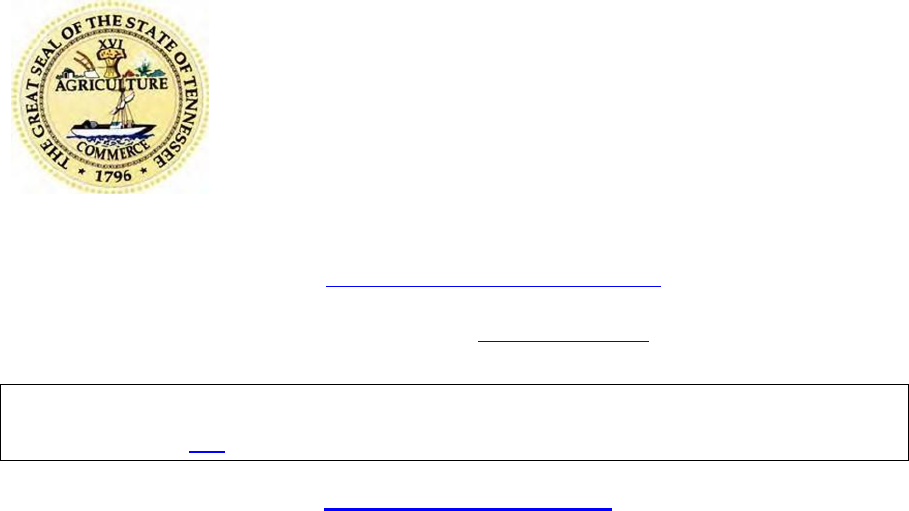
150
TENNESSEE – NO STATE INCOME TAX
Tennessee Department of Revenue
500 Deaderick Street
Andrew Jackson Building
Nashville, TN 37242
Phone:
(615) 253-0600, (800) 342-1003
Website:
Tennessee Department of Revenue
Problems Resolution Office Resolution Office
Tennessee has no state income tax. It previously had the “Hall Income Tax” which applied to interest from
bonds and notes and dividends from stock, but it has been repealed for tax years beginning on or after
January 1, 2021. See here.
Return to Table of Contents

152
UTAH
Utah State Tax Commission
210 North 1950 West
Salt Lake City, Utah 84134
Member of Federal/State E-file program
General Information: (801) 297-2200 or (800) 662-4335 (toll free outside Salt Lake
area)
Forms: Forms and Publications
Website: Utah State Tax Commission
Taxpayer Help: (801) 297-2200 or 1-800-662-4335, [email protected]
Refund: Refund Methods and Information
Advocate: The Utah Taxpayer Advocate Service (801) 297-7562,
(800) 662-4335 (ext. 7562), [email protected]
State filing addresses: Utah State Tax Commission
210 North 1950 West
Salt Lake City, UT 84134-0266
What’s new Military Retirement Tax Credit: The 2021 Utah Legislature passed
SB 11, creating an apportionable, nonrefundable tax credit for taxable
military retirement benefits.
Solar Energy Systems Phase-out: The maximum credit for solar power
systems installed in 2021 is $1,200.
Social Security Benefits Tax Credit: The 2021 Utah Legislature passed
HB 86, creating an apportionable, nonrefundable tax credit for taxable
Social Security income. Find out more here.
Payroll Protection Program (PPP) Grant or Loan Addback: In certain
situations you must add to your income the amount of PPP grants or loans
forgiven in 2021. Find out more here.
E-File/Paper Copy Information E-Filing: Go to Online Filing. Electronically filed returns do not require
sending paper copy of documents to the Tax Commission.
Paper Filing: Send the following with your Utah Return: TC-40 page 3,
TC-40A, TC-40B, , TC-40S, and TC-40W (all that apply); An explanation
for any equitable adjustment entered on TC-40A, Part 2, code 79.; Attach
form TC-131 if claiming a refund for a deceased taxpayer. Also attach
TC-40LIS if you are a building project owner of a low-income housing
unit. Also attach federal form 8379 if you are claiming relief as an injured
spouse. Pay any return amount due at tap.utah.gov. If paying by check or
money order, include form TC-547.
Keep: Do not submit supporting documentation, including your federal
return, worksheets, and credit schedules (other than Utah schedules TC
-

Utah
153
40A, TC-40B, TC-40S and/or TC-40W). Keep these, along with any
receipts, and all supporting documents for a period of 3 years from the date
the taxes are due or paid.
Who must file? You must file a Utah individual income tax return if:
1. You are a Utah resident or part-year resident who must file a
federal income tax return;
2. You are a nonresident or part-year resident with federal gross
income from Utah sources who must file a federal return; or
3. You want a refund of overpaid income tax.
If you must file a Utah return, first complete a federal return, even if you're
not otherwise required to file with the IRS. You need information from the
completed federal return to complete the Utah return.
What forms to file?
All taxpayers may use Form TC-40. Part-year residents and nonresidents
use both TC-40 and TC-40B.
Residency
You are domiciled in Utah if:
Test 1
1. You or your spouse claimed a child tax credit (IRC §24) for a
dependent on your federal tax return, and the dependent is
enrolled in a Utah public K-12 school. This does not apply if you
are the dependent’s noncustodial parent and are divorced from the
custodial parent.
2. You or your spouse is enrolled as a resident student in a Utah state
institution of higher education.
Test 2
There is a rebuttable presumption you are domiciled in Utah (i.e., you are
domiciled in Utah unless you can prove otherwise) if you or your spouse:
1. Claims a residential exemption for a primary residence under UC
§59-2, Property Tax Act,
2. Voted in Utah during the taxable year and were not registered to
vote in another state during that time, or
3. File a Utah income tax return as a full-year or part-year resident.
Test 3
Even if you do not meet any of the conditions above, you are still domiciled
in Utah if:
1. Either you or your spouse has a permanent home in Utah to which
either of you intend to return after being absent; and
2. You or your spouse has voluntarily settled in Utah, not for a
special or temporary purpose, but with the intent of making a
permanent home.
Under Test 3, whether you have a permanent home in Utah is based on a
preponderance of the evidence (i.e., the evidence you have a permanent
home is more convincing than any evidence you do not), taking into
consideration all of the facts and circumstances found on TC-40
Instructions, pg. 3.
The nonresident spouse of a nonresident Servicemember may be exempt
from the Utah income tax under certain conditions. See Spouses and
Community Property Below.
Exemptions The personal exemption is $1,750 per dependent you were allowed to
claim on your federal return for the federal tax credit. See TC-40
Instructions
,
pg. 7. You may be exempt from Utah individual income tax

Utah
154
if your federal adjusted gross income is less than the sum of your
federal standard deduction and personal exemptions. See TC-40
Instructions, pg. 8.
Military Pay Utah treats military pay and allowances of resident Servicemembers the
same as the IRS. If income is included in federal adjusted gross income,
it is automatically included in Utah income. Conversely, if income is
excluded from federal taxation, it is also excluded for Utah purposes. An
example is the exclusion of combat pay if you are enlisted, a warrant
officer, or a commissioned warrant officer.
The active duty military wages of a Utah nonresident service member
may be deducted from his or her federal income on the Utah return.
Generally, filing status must be the same status on the Utah return as on
the federal return. Exception for military families: If you are in the military
and married, and one spouse is a full-year Utah resident and the other is a
nonresident, special instructions apply to filing your Utah returns. If you
file separate federal returns, you must file separate Utah returns. However,
if you file a joint federal return, you may file either joint or separate Utah
returns.
For tax years beginning on or after Jan. 1, 2010, a military service member
who dies as a result of military service in a combat zone may claim a
nonrefundable tax credit equal to their tax liability in the year of death. UC
§59-10-1027.
Spouses and Community Property Utah is not a community property state, but the income of a spouse who
lives in a Community Property state (i.e., Arizona, California, Idaho,
Louisiana, Nevada, New Mexico, Texas, Washington, or Wisconsin)
may be taxable (Check with the relevant Community Property state. See
also IRS Publication 555, “Community Property”).
Nonresident Military Spouse Income: All income of a service member’s
nonresident spouse is exempt from Utah tax only if: (1) the spouse and the
service member are residents of the same state outside Utah, (2) the service
member is in Utah under military orders, and (3) the spouse is in Utah
solely to be with the service member.
Military Tax Benefits Military Survivor Benefits Credit:
A surviving spouse or dependent child of a deceased military member
may claim a nonrefundable tax credit for survivor benefits if the benefits
are paid due to the death of a member of the armed forces or reserve
components while on active duty or the death of a member of the reserve
components that results from a service-connected cause while
performing inactive duty training. The tax credit is equal to the product
of the amount of survivor benefits received during the taxable year and
4.95%. The tax credit may not be carried forward or back.
Combat Related Death Credit: If you are filing a return on behalf of
a military service member who died as a result of military service in a
combat zone, you may claim a nonrefundable credit equal to the amount
of your tax return attributable to the deceased service member. To
qualify for the credit, you must meet conditions listed on TC-40
Instructions, p. 23.
Veteran Employment Credit: A nonrefundable credit is available to
taxpayers who hire a qualified, recently deployed veteran. To qualify
for the credit, you must meet conditions listed on the TC-40 Instructions,
p. 23.
Tax Rate 4.95%

Utah
155
Income Exclusions If income is excluded from federal taxation, it is also excluded for Utah
purposes. For example: Death gratuity paid to a survivor of a member of
the Armed Forces which is not taxable on the federal return is not taxed by
Utah. See IRS Publication 3.
Income Deductions May itemize or take standard deduction, but must follow federal election.
Standard deduction amounts are the same as federal amounts. TC-40
Instructions.
Capital Gains/Losses
See TC-40 Instructions, pg. 17 for information on Capital Gains
Transaction Credit.
Retirement Income You may qualify for a Military Retirement Credit if you or your spouse (if
filing jointly) received taxable military retirement pay. For information on
Retirement Credit, see TC-40 Instructions, pg. 20.
Deadline/Extensions April 18, 2022, if you file on a calendar year basis. The deadline is the
15th day of the fourth month after the fiscal year ends for fiscal year
filers. If the due date falls on a Sunday, Saturday, or legal holiday, the
due date is the next business day.
Utah automatically provides an automatic extension of six months to
file your Utah return. There is no form needed to obtain this extension.
The Utah extension is an extension to file the tax return, not to pay
tax amounts due. Prepayment of 90% of 2021 Utah tax due, 100% of
your 2020 tax liability, or 90% of your 2021 tax due (if you did not
have a 2020 Utah tax liability or this is your first year filing), is required
by original due date to avoid late payment penalties and interest. See
TC-40 Instructions, p. 2.
Utah allows personnel serving in a combat zone or overseas contingency
operation the same extension deadline allowed by the IRS. Utah will put
any payment agreements, collection activities, audits, and return filing
requirements on hold for the duration of the deployment plus at least 180
days as provided by the IRS guidelines. To receive combat zone extension,
email combatzone@utah.gov and provide name, stateside address, date of
birth, and date of deployment to the combat zone. A service member,
spouse, or an authorized representative may make this notification.
Answers to questions will be by email, unless the question concerns
specific tax account information, in which case the answer will be sent by
regular mail to the address on record. Do not include a social security
number or any confidential or classified information by email.
Miscellaneous Use tax is a tax on goods and taxable services purchased for use, storage,
or other consumption in Utah during the taxable year and applies only if
sales tax was not paid at the time of purchase. If you purchased an item
from an out-of-state seller (including Internet, catalog, radio and TV
purchases) and the seller did not collect sales tax on that purchase, you
must pay use tax directly to the Tax Commission.
Sales and use tax rates vary throughout Utah. Use the Use Tax Rate Chart
on page 10 of TC-40 Instructions. There is a credit available for sales or
use tax paid to another state (but not to a foreign country).
Same-Sex Marriage Same-sex married filers have same filing options as heterosexual married
filers.
Return to Table of Contents

156
VERMONT
Vermont Department of Taxes
133 State Street
Montpelier, VT 05633-1401
Member of Federal/State E
-
file program
General Information: (802) 828-2865, Toll Free: (866) 828-2865 mailto:"
Website: Department of Taxes Webpage
Vermont Tax Guide for Military and National Services
Forms:
How to Pay Tax:
Forms Webpage, (802) 828-2515, Toll Free: (855) 297-5600
Paying Tax Owed
Refund Status: Refund Status Webpage, (802) 828-2865, Toll Free:
(866) 828-2865
Electronic Filing: MyVTax (Extension to File Vermont Personal Income Tax)
Free-File (State Personal Income Tax Return)
Taxpayer Advocate: (802) 828-6848 available Monday to Friday, 7:45 am-4:30 pm
Mailing Address:
Vermont Department of Taxes
Taxpayer Advocate
P.O. Box 429
Montpelier, Vermont 05633-1401
Taxpayer Advocate services are available if a taxpayer has
concerns with the following:
An issue with, or action by, the Vermont Department of Taxes
not resolved by normal, established procedures within 180 days;
A response or resolution not received by the date promised;
An action by the Department that will cause a substantial
hardship, irreparable injury, or long-term adverse impacts.
You may contact the Taxpayer Advocate by telephone or by
letter. We discourage using email as it is not secure. Please use
email for general inquiries only.
Provide the following information:
Name, address, Social Security Number, or Vermont business
tax account number
Telephone number, mailing address, and email address
Type of tax(es) and reporting period(s)
Detailed description of the problem and efforts you have made to
resolve it

Vermont
157
State filing addresses:
Payment enclosed:
Refund requested, no balance due, no payment:
Vermont Department of Taxes
PO Box 1779
Montpelier, Vermont 05601-1779
Vermont Department of Taxes
PO Box 1881
Montpelier, Vermont 05601-1881
E-File Information E-file available and free software available for Federal and
Vermont Tax filing. See the Free-File page and Payments and
Returns
.
Who must file? You must file if: (1) You are a resident, part-year resident of
Vermont or a nonresident, and you are required to file a
federal income tax return, and you earned or received more
than $100 in Vermont income; or 2) You are a non-resident
and earned or received Vermont gross income of more than
$1,000. See Vermont law at 32 V.S.A. § 5861 and § 5823(b)
for information on sources of i
ncome.
What forms to file? All taxpayers may use Form IN-111 (see Income Tax Form
and Instructions). Part-year residents or nonresidents, as well
as any resident wishing to exempt their military pay from
Vermont taxation, must also use to apportion Vermont income
(see
Income Tax Form and Instructions
).
Residency See Who Needs to File. You are a resident if you are
domiciled in Vermont or maintain a permanent home in
Vermont and are present in Vermont more than 183 days of
the taxable year (unless you are a member of the military
domiciled elsewhere). If you were a Vermont resident for only
part of the year, you are a part- year resident. If you were not
a Vermont resident for the tax year but received Vermont
income, you are a non-resident.
Domicile is the place where you have your permanent home.
Establishing a domicile depends on factors such as the
location of residences owned or rented, the amount of time
spent at the residences, the location of items considered of
sentimental or financial value, how and where one’s living is
earned, an investment in a business or profession in this state,
the place of voter registration, the state issuing a driver’s
license and an automobile registration, and the residence of
the taxpayer’s immediate family. No one factor is conclusive.
You can have only one domicile. Your domicile does not
change unless you move to a new location with the intent to
make it your permanent home. If you move to a new location

Vermont
158
but only intend to stay a limited time, your domicile does not
change. For more information, see Department Regulation
1.5811(11)(A)(i).
An individual in military service retains as his or her domicile
the state from which he or she entered service until a change
in domicile is affected. The domicile of a civilian spouse or
civil union partner of a member of the military is established
under general domicile rules. For more information, see
Department Regulation 1.5811(11)(A)(i).
It is presumed that the domiciles of married individuals or
civil union partners are the same unless there is affirmative
evidence to the contrary.
Where one spouse is a Vermont resident and the other a
nonresident with no Vermont income, the spouses may file
separately, even if they filed joint federal return. The Vermont
resident spouse must also complete a Vermont-only Federal
return as if filed MFS and attach it to Vermont return.
Exemptions and deductions must be reasonably allocated (i.e.,
the Vermont-only MFS return cannot take all exemptions,
etc.)
Required Vermont School District Code: For school district
codes go to the School Codes page.
Vermont Residents: Use the 3-digit school district code for
your residence on April 1 this year if you are a homeowner, or
December 31 last year if you are a renter.
Nonresidents:
Enter 999 as your school district code.
Homestead Exemption Homestead Declaration: If you are a Vermont resident, you
must declare (by filing form HS-122 by April 15) as a
“homestead” any property that meets the following definition:
a principal dwelling and parcel of land surrounding the
dwelling that you own and occupy as a Vermont resident as of
April 1 this year, and which you have not leased to a tenant
for more than 182 days in the calendar year. This is necessary
for a correct property tax assessment.
Exemptions Enter on form IN-111 the number of exemptions claimed on
your federal return or your recomputed federal return.
Exemptions specific to military service members and veterans
may be
found here
.
Military Pay See Form IN-113 instructions, Income Tax Form and
Instructions. For full-year residents: Wages earned for full-
time active-duty military service performed outside Vermont
may be excluded from taxable income. Enter the amount of
exempt military pay on Form IN-113.
Taxpayer must supply copy of orders showing service outside
Vermont. For others, military pay is taxed as ordinary income.
Follows federal rules. $2,000 of Nation
al Guard or Reserve

Vermont
159
pay is exempted if federal AGI is less than $50,000, unit
training took place in Vermont, and the Reserve Component
Commander has certified that taxpayer completed all unit
training during the calendar year. If military pay not included
in Federal taxable income, it will not be taxed in Vermont.
Spouses and Community
Property
Vermont is not a community property state, but the income of
a spouse who lives in a Community Property state (i.e.,
Arizona, California, Idaho, Louisiana, Nevada, New Mexico,
Texas, Washington, or Wisconsin) may be taxable (check
with the pertinent community property state. See also IRS
Publication 555, Community Property.
Under the Federal Military Spouses Residency Relief Act, a
spouse of a service member may be exempt from Vermont
income tax on income from services performed there if: (1)
the service member is present in Vermont in compliance with
military orders; (2) the spouse is there solely to be with the
service member; and (3) the spouse maintains domicile in
another state.
Income Exclusions For non-resident or part-year resident with Vermont income,
or a Vermont resident claiming income exempt from Vermont
income tax, see Form IN-113 for Vermont adjustments to
income.
For a Vermont resident, see What Is Taxable Income? |
Department of Taxes
.
Capital Gains/Losses Vermont allows a portion of net adjusted capital gains, as
defined by Internal Revenue Code Section 1(h), to be
excluded from Vermont income. Qualified dividends are not
eligible for capital gains treatment for Vermont. The amount
excluded cannot exceed 40 percent of Federal taxable income.
Complete and submit Schedule IN-153 (see IN-153
instructions Income Tax Form and Instructions) to calculate
the capital gains exclusion for 2021. You must also file Form
IN
-
112.
Retirement Income Military retirement pay is not exempt from state income
taxes. See Tax Exemptions for Veterans | Office of Veterans
Affairs
.
Deadline/Extensions Return is due April 18, 2022. Vermont allows taxpayers a 6-
month extension if they file Form IN-151, “Application for
Extension of Time to File Form IN-111,” on or before the due
date. The extension allows additional time to file but does not
extend the time to pay any tax due, tax is owed by the April
18 deadline. File an Extension.
Vermont offers a combat zone duty extension for military
personnel who were called up for full time active military
duty in a designated combat zone or who served in an area
treated as if it were a combat zone
. The extension for an

Vermont
160
income tax return also applies to the military personnel’s
spouse. To claim the extension, call (802) 828-2865. Vermont
adopted the provisions of Section 7508 of the Federal Internal
Revenue Code that extends the time to file an income tax
return without penalty to:
180 days after the last day of qualifying combat zone service;
or
180 days after the last day of any continuous qualified
hospitalization for injury received from service in the combat
zone.
Data requested to prevent
fraud
Information from Driver’s License or State-Issued ID Card
The State of Vermont requests, though does not require
additional information from a driver’s license of state-issued
identification card in an effort to combat stolen-identity tax
fraud and ensure that your hard-earned tax refund goes to you.
Although not required, such information could accelerate
processing of your return.
Same-Sex Marriage Per the Supreme Court in Obergefell v. Hodges, June 26,
2015, same-sex married filers have same filing options as
heterosexual married filers.
Return to Table of Contents

161
VIRGINIA
Virginia Department of Taxation
P.O. Box 1115
Richmond, VA 23218-1115
Express mail:
Virginia Tax
1957 Westmoreland Street
Richmond, VA 23230
General Information: (804) 367-8031
Web site: Virginia Department of Taxation
Forms: Virginia Tax Forms
Online Services: (804) 367-8031, Online Services, MilTax
Refund status: 804-367-2486, Where Is My Refund Webpage
State filing addresses:
Payment enclosed (i.e., tax due): Refund expected or no payment:
Virginia Department of Taxation
P.O. Box 760
Richmond, VA 23218-0760
Virginia Department of Taxation
P.O. Box 1498
Richmond, VA 23218-1498
E-File Information
Filing tax returns electronically is considered the fastest, safest and easiest
way to file a return. Taxpayers who earned less than $73,000 in 2021 are
eligible to use Virginia Free File. Military members are eligible to use
MilTax. For all other taxpayers, Virginia provides a list of approved
products that meet the requirements for electronic tax filing (Virginia
Approved Tax Preparation Software). Taxpayers electing to have their
returns prepared/filed by a paid preparer or electronic return originator
(ERO) must complete VA Form 8453 and maintain that form with their
records.
Record Retention Taxpayers should retain their tax records for at least 3 years from the due
date of the return or the date the return was filed, whichever is later.
(Virginia Recordkeeping)
Who must file? Taxpayers must file a Virginia state return if: the taxpayer is a Virginia
resident (see below), is required to file a federal tax return, and if their
Virginia Taxable Income (VTI), which may differ from your Federal
Adjusted Gross Income (AGI), meets the following threshold(s): single and
married filing separate returns - $11,950; married filing a joint return -
$23,900.
Non-residents of Virginia are required to file a return if they earned income
from a Virginia source. (Virginia Residency) There are certain states
where Virginia has reciprocity agreements, which means Virginia residents
who earn certain income in those other states only pay Virginia tax. Those
states are Kentucky, the District of Columbia, Maryland, Pennsylvania and
West Virginia (Reciprocity)
Residency There are three types of residency for Virginia tax purposes: Domiciliary
Resident, Actual Resident and Non
-
Resident. A Taxpayer who has elected

Virginia
162
Virginia as his/her domicile is considered a Domiciliary Resident. This
term includes members of the military who live in another state, but
maintain Virginia as their legal residence. Persons who are physically
present in Virginia for at least 183 days are generally considered Actual
Residents. Non-Residents, for tax purposes, include those persons who do
not live in Virginia, but earn income from a Virginia source. See Virginia
Residency.
What forms to file? All forms can be found at VA Forms Webpage. For residents, file Form
760. For Part- Year residents, file Form 760PY. For nonresidents, file Form
763.
See page 6 of instructions for exceptions for nonresidents of KY, D.C., MD,
PA, WV: Form 760 Instructions. The spouse or dependent of a member of
the armed forces must determine his or her own residency status and filing
obligations even if filing a joint federal return. See page 6 of Form 760
Instructions.
Exemptions Virginia allows a $930 per person exemption for the filer, spouse and each
dependent. In addition, there is an $800 per person exemption for those
considered blind and for those who are 65 years or older as of January 1,
2021. See Exemptions.
Military Pay Military personnel stationed inside or outside Virginia, whose basic pay is
less than
$30,000, may be eligible to subtract up to $15,000 of military basic pay
received during the taxable year, provided they are on extended active duty
for more than 90 days.
National Guard of Virginia of paygrade no higher than O3 (Captain) may
exclude up to $3,000 of their income for such service; if they were on active
duty for at least 90 consecutive days during the taxable year, they may
qualify for the military basic pay deduction of $15,000.
Military personnel on active duty service in a combat zone or a qualified
hazardous duty area may subtract their combat or hazardous duty pay, to
the extent that the pay was included in federal adjusted gross income and
not otherwise subtracted, deducted or exempted. See Military Tax Tips for
further information.
Spouses and Community Property In some instances, military members and their spouses maintain legal
residence in two separate states. In that event, they may not file a joint tax
return in Virginia. Instead, they will utilize Virginia Filing Status 3. In the
event that one spouse maintains residence in a community property state
(Arizona, California, Idaho, Louisiana, Nevada, New Mexico, Texas,
Washington or Wisconsin), certain income earned by that spouse may be
taxable to the Virginia resident spouse. See Internal Revenue Service (IRS)
Publication 555 – Community Property.
Spouses filing jointly utilize Virginia Filing Status 2, which includes a
Spouse Tax Adjustment and which allows married couples to file joint
returns without paying higher taxes than if they had filed separately.
Under the Servicemember Civil Relief Act, as amended by the Military
Spouses Residency Relief Act, the spouse of a military Servicemember may
be exempt from Virginia income tax on wages, salaries or certain self-
employment income if (i) the Servicemember is present in Virginia in
compliance with military orders; (ii) the spouse is present in Virginia solely
to be with the Servicemember; and (iii) they both must maintain the same
non-Virginia domicile state.

Virginia
163
Rates If a taxpayer’s Virginia Taxable Income (VTI) is below the filing
threshold (see above), the tax is zero and there is no need to file a return
unless a refund for the withholding of tax is required.
Rates are as follows for taxable income:
2% up to $3,000;
$60 + 3% from $3,001 to $5,000;
$120 + 5% from $5,001 to $17,000; and
$720 + 5.75% for income over $17,000.
See Tax Calculator.
Income Exclusions Virginia law exempts certain income that may have been reported on a
federal return. (Virginia Subtractions from Income)
Deductions If a taxpayer claims the standard deduction on their federal tax return,
they must also do so on their Virginia return. The Virginia standard
deduction is $4,500 for single and married filing separately and $9,000
for Married Filing Jointly. Itemized deductions are set forth in Virginia
Schedule A and are generally the same as those in the Federal Schedule
A.
Capital Gains/Losses Per federal rules, taxed (after reduction for long-term gains) as ordinary
income.
Retirement Income Generally, income taxed by the Federal government is treated the same
by Virginia. See Virginia Taxes and your Retirement.
Deadline/Extensions May 1, 2022. If the due date falls on a Saturday, Sunday or legal holiday,
you may file your tax return on the next business day.
If the military member is stationed outside the United States or Puerto Rico
on the date the return is due (May 1), the due date for filing and payment is
automatically extended to July 1, 2022. When filing under this provision,
write the words “Overseas Rule” on the top of the return and on the outside
of the envelope, and attach a statement explaining you were out of the
country.
Combat zone services: Qualifies either for the same extensions in filing and
payment granted by the IRS, plus 15 days, or an extension from the due
date of one year, whichever leads to a later date. All extensions to military
personnel also apply to their spouses.
Service members who claim this extension should write “Combat Zone” at
the top of their tax returns and associated envelopes and notices.
Noncombat service outside of U.S.: Qualifies for an extension of the due
date for filing and payment to expire 90 days after the completion of
deployment. Service members who claim this extension should write
“Overseas Noncombat” at the top of their tax returns and on the filing
envelopes.
Locality Code Pages 43 and 44 of the Form 760 Instructions contain the 3-digit locality
codes necessary for completion of the Virginia Form 760. Taxpayers
should utilize the locality in which they lived on January 1.
Same-Sex Marriage Per the Supreme Court in Obergefell v. Hodges, June 26, 2015, same-sex
married filers have same filing options as heterosexual married filers.
Return to Table of Contents

165
WEST VIRGINIA
West Virginia State Tax Department
Taxpayer Services Division
P.O. Box 1071
Charleston, WV 25324-1071
Member of Federal/State E-file program
General Information: (800) 982-8297
Forms: (304) 558-3333; Forms
Web site: West Virginia State Tax Department;
Tax Division Telephone Numbers
Refund status: (304) 558-3333; (800) 982-8297; Refund Status
Electronic Filing: (304) 558-3333; Electronic Filing
State filing addresses:
Payment enclosed (tax due): Refund expected or no payment:
West Virginia State Tax Department
P.O. Box 3694
Charleston, WV 25336-3694
West Virginia State Tax Department
P.O. Box 1071
Charleston, WV 25324-1071
E-File Information
Taxpayers should go to the E-file page for filing options. Tax sites are
required to keep WV 8453 and all supporting documents on file for three
years. Phone for instructions on disposition of rejected returns. Individuals
who made payments totaling $50,000 or more during the most recent fiscal
year may be required to file and pay their West Virginia taxes
electronically.
Who must file? Regardless of residency status, you must file a West Virginia return if you
are required to file a federal return (and have income from West Virginia
sources), or if your West Virginia adjusted gross income exceeds your
allowable deduction for personal exemptions ($2,000 per exemption, or
$500 if you claim zero exemptions). If you are a non-resident, you must file
a West Virginia return if your federal adjusted gross includes income from
West Virginia sources, or if you would like a refund. See Form IT-140 and
Instructions. If you and your spouse are at least 65 years old, you are not
required to file if your total income is less than your exemption plus
addition of $8,000 for each taxpayer.
What forms to file? Regardless of residency status, you must file Form WV IT-140. As part of
this form, you must also complete Schedule A if you are non-resident or
part-year resident (the standalone form IT-140NRS (Special Nonresident
Income for Reciprocal States) has been eliminated, in place of which you
should complete Part II of Schedule A).
See Form IT-140 and Instructions.
Residency
Follows ordinary residency rules, except that if you are a resident of a
neighboring state and maintain a physical presence in West Virginia for
more than 183 days you qualify either as a resident of West Virginia fo
r tax

West Virginia
166
purposes or may claim a special credit for reciprocal taxation (does not
apply to military members). In general, if you have spent more than 30 days
in West Virginia and who have the intent to become West Virginia residents
are considered full year or part-year residents. A full year nonresident is an
individual who is: a resident of another state who does not maintain a
physical presence within West Virginia and does not spend more than 183
days of the taxable year within West Virginia; or a resident of West Virginia
who spends less than 30 days of the taxable year in West Virginia, and
maintains a permanent place of residence outside West Virginia.
Spouses who filed joint federal returns may file a joint West Virginia return
or separate West Virginia return; however, those who filed separate federal
returns must file separate West Virginia returns. See IT-140 Instructions.
Any refunds for taxable year 2021 may be claimed on a properly filed IT-
140 indicating “Non Resident Military Spouse” above the title on the first
page.
Nonresident military service members and their spouses may be liable for
West Virginia income tax on other types of West Virginia income such as
business income, interest income, unemployment compensation, etc. These
types of income are reported on the Schedule A. See page 17 of the IT-140
Instructions.
Exemptions The West Virginia personal exemption allowance is $2,000 per allowable
exemption or $500 for zero exemptions. This exemption increases by
$8,000 per taxpayer that is at least 65 years old. The number of West
Virginia personal exemptions that you are allowed to claim are the same
number as your federal exemptions as determined under prior years when
federal exemptions existed. If you claim zero exemptions on your federal
return because you are claimed as a dependent on another person’s return,
you must claim zero on your West Virginia return.
Military Pay For residents who are stationed outside of West Virginia, and who are not
present in West Virginia for more than 30 days during the tax year, military
pay is not taxed (though West Virginia source income still would be). For
all other residents, military pay is taxable only to the extent it is taxable on
the federal return (thus West Virginia does not tax combat pay).
Military income received for National Guard or Armed Forces Reserves
called to duty pursuant to an Executive Order is not taxable on the West
Virginia return. This income is shown on Schedule M, line 34, as a
decreasing modification to the federal. A copy of your military orders
and W-2 must be included with the return.
A modification to taxable income of up to $2,000 is allowed for military
retirement pay (in addition to other pensions and annuities).
Spouses and Community Property West Virginia is not a community property state, but the income of a spouse
who lives in a Community Property state (i.e., Arizona, California, Idaho,
Louisiana, Nevada, New Mexico, Texas, Washington, or Wisconsin) may
be taxable (Check with the relevant Community Property state). See also
IRS Publication 555, “Community Property”.
Under the Federal Military Spouses Residency Relief Act, a spouse of a
servicemember may be exempt from West Virginia income tax on income
from services performed there if (1) the servicemember is present in West
Virginia in compliance with military orders; (2) the spouse is there solely
to be with the servicemember; and (3) the spouse maintains domicile in
another state.
Eligible spouses wishing to claim this exemption from income tax may file
a revised
Form IT
-
104
with the spouse
’
s employer and must also attach a

West Virginia
167
copy of their “spousal military identification card” when providing this
form to their employer.
Any refunds for taxable year 2021 may be claimed on a properly filed IT-
140 indicating “Non Resident Military Spouse” above the title on the first
page. Military spouses should check the Nonresident Special box on Form
IT-140 and complete Part II of Schedule A. A copy of their State of Legal
Residence Certificate, Form DD2058, must be enclosed with their return
when it is filed.
Nonresident military service members and their spouses may be liable for
West Virginia income tax on other types of West Virginia income such as
business income, interest income, unemployment compensation, etc. These
types of income are reported on the Schedule A. See the IT-140 Instruction
Booklet.
Rates Rates are as following for taxable income in the following margins, if your
filing status is Single, Head of household, Married filing joint, or
Widow[er] with dependent child:
up to $10,000, 3% of taxable income;
at least $10,000 but less than $25,000: $300 + 4% of excess over
$10,000;
at least $25,000 but less than $40,000: $900 + 4.5% of excess over
$25,000;
at least $40,000 but less than $60,000: $1,575 + 6% of excess over
$40,000;
at least $60,000: $2,775 + 6.5% of excess over $60,000
Rates are as following for taxable income in the following margins if your
filing status is Married filing separately:
up to $5,000, 3% of taxable income;
at least $5,000 but less than $12,500: $150.00 plus 4% of excess over
$5,000;
at least $12,500 but less than $20,000: $450.00 plus 4.5% of excess
over $12,500;
at least $20,000 but less than $30,000: $787.50 plus 6% of excess over
$20,000;
at least $30,000: $1,386.50 plus 6.5% of excess over $30,000.
Income Exclusions
Low Income Earned Income Exclusion is available to you, even if you are
claimed a deduction on someone else’s return, if you have Federal adjusted
gross income $10,000 or less ($5,000 or less for married filing separately)
- see instructions.
Income Deductions West Virginia has no standard or its own itemized deductions. See
instructions to Schedule M.
Capital Gains/Losses Taxed as ordinary income; follows federal rules for inclusion and
deduction.
Deadline/Extensions Due April 18, 2022. West Virginia automatically grants any extension you
obtained for your Federal income tax return. Even with such an extension,
interest shall accrue on any tax owed. Filing beyond the deadline without
an extension incurs a penalty of 5 to 25 percent unless reasonable cause can
be shown for the delay.
Same-Sex Marriage Per the Supreme Court in Obergefell v. Hodges, June 26, 2015, same-sex
married filers have same filing options as heterosexual married filers.

169
WISCONSIN
Wisconsin Department of Revenue
Individual Income Tax
2135 Rimrock Road
Madison, WI 53713
Member of Federal/State E-file program
General Information: (608) 266-2772; (608) 266-2468
Website: WI Department of Revenue
Forms: (608) 266-1961;
2021 Individual Income Tax Forms
Refunds: (866) 947-7363
State filing addresses:
Payment enclosed: Refund expected or no payment:
Wisconsin Department of Revenue
P.O. Box 268
Madison, WI 53790-0001
Wisconsin Department of Revenue
P.O. Box 59
Madison, WI 53785-0001
E-File Information Electronic Filing: (608) 266-2486
Email contact for e-filing: DORElectronicFiling@wisconsin.gov;
Fax to E-Filing Unit: (608) 267-1030 E-File Main: E-File Webpage
If you file a Form 1 or 1NPR, you must attach a completed copy of your
federal income tax return to your Wisconsin e-file return.
Filing Requirements See Individual Income Tax Filing Requirements.
What forms to file? Residents: Form 1
Part-year and nonresidents: Form 1NPR. If you (or your spouse if filing
jointly) were domiciled in another state or country at any time during the
taxable year, use Form 1NPR.
Residency In general: You are a resident if domiciled in Wisconsin throughout the
taxable year, a part-time resident if your domicile is Wisconsin for part of
the year, and a nonresident if you were not domiciled in Wisconsin for any
part of the taxable year.
Armed Forces personnel: If you were a Wisconsin resident on the date you
entered military service, you are considered a Wisconsin resident
throughout your military career unless you change your legal residency
(which consists of showing a physical presence elsewhere, an intent to
remain there, and an intent to abandon the old legal residence). See Military
Members - FAQ.
For questions about domicile, see 1NPR Instructions at page 3.
Spouses and Community Property Wisconsin is a Community Property state. If you a married, filing
separately, see IRS Publication 555 (Community Property).

Wisconsin
170
Under the Federal Veterans Benefits and Transition Act of 2018, a spouse
of a Servicemember may be exempt from Wisconsin income tax on income
from services performed there if (1) the servicemember is present in
Wisconsin in compliance with military orders; (2) the spouse is there solely
to be with the servicemember; and (3) the spouse maintains domicile in
another state. See: Military Members – FAQ #7-9.
Exemptions $700 per person (an additional $250 for taxpayer or taxpayer’s spouse if
over 65).
Military Pay Wisconsin residents in the armed forces are liable for their entire annual
Wisconsin net taxable income, regardless of income source. Military pay
exempt for federal purposes is also exempt for Wisconsin. If you were a
member of the Reserves or National Guard and served on active duty, you
may subtract any military pay that is included on your W-2 and was:
Received from the federal government,
Received after being called into active federal service or into
special state service authorized by the federal Department of
Defense, and
Paid to you for a period of time during which you were on active
duty.
CAUTION: The subtraction only applies to members of the Reserves or
National Guard who are called into active federal service under 10 U.S.C.
§ 12302(a) or 10 U.S.C. § 12304 or into special state service under 32
U.S.C. § 502(f). It does not apply to pay that members of the Reserves and
National Guard receive for their weekend or two-week annual training. It
also does not apply to a person who is serving on active duty or full-time
duty in the active guard reserve (AGR) program.
An additional subtraction is allowed for the amount of basic, special, and
incentive pay received from the federal government under 37 USC
chapters 3 and 5 during the period that members of the U.S. Armed Forces
are on active duty. A member of the U.S. Armed Forces includes all
regular and reserve components subject to the following jurisdictions,
including the Coast Guard and commissioned officers and personnel
below the grade of commissioned officers in these forces:
Secretary of Defense
Secretary of the Army
Secretary of the Navy
Secretary of the Air Force
For more information, see the “Frequently Asked Questions” regarding
military income tax at: Military Members - FAQ.
Armed Forces Member Credit A member of the U.S. armed forces on active duty who receives military
pay from the federal government while stationed outside the United
States may qualify for the armed forces member credit. The tax credit
equals the amount of military pay for services performed while stationed
outside the United States, up to a maximum credit of $300. If both spouses
of a married couple filing jointly receive pay for military service outside
the country, each may claim the $300 credit. More info here, at page 25.
Exception: You may not claim the armed forces member credit if you were
a member of the Reserves or National Guard and claimed an exclusion from
income for your active duty military pay.
Military member survivors Combat zone related death. If you are filing a return for an individual who
died in 2020 while on active duty and the death occurred while he or she

Wisconsin
171
was serving in a combat zone or as a result of wounds, disease, or injury
incurred while serving in the combat zone, you may subtract all income
received by the individual during the year of death. Attach the certification
made by the Department of Defense, DD Form 1300, Report of Casualty,
to the return, along with Federal Form 1040 and all Forms W-2. (Note For
persons who died in 2020 as a result of service in a combat zone, the income
subtraction also applies for 2019 if the service member did not previously
file a 2019 income tax return). See Schedule M Instructions Line 42.
Veterans and Surviving Spouses Property Tax Credit: This is a
subtraction for property tax paid on the principal residence of certain
disabled veterans (conditions include a service-connected disability of
100%) and certain survivors of deceased service members. See Form 1
Instructions.
Note: If you claim the veterans and surviving spouses property tax credit,
you or your spouse may not claim the school property tax credit, homestead
credit, or farmland preservation credit.
Rates See the 2021 Tax Table at page 36 of the
Form 1 Instructions.
Income Exclusions A full list of subtractions from income may be found on Schedule SB
Instructions.
Income Deductions Standard Deduction varies with income. Does not follow all federal rules;
see the 2021 Standard Deduction Table on page 34 of the Form 1
Instructions.
Capital Gains/Losses If your federal adjusted gross income includes capital gains and/or losses,
you must complete Schedule WD.
Retirement Income All military retirement pay is non-taxable. Some retirement pay from
federal or local government is non-taxable only under certain
circumstances—see instructions. Use Schedule SB, and see Schedule SB
Instructions at p. 6.
Deadline/Extensions Due April 18, 2022. Wisconsin grants the same extensions for filing as the
federal government, e.g., the federal automatic 6-month extension. To get
an extension, provide as an enclosure with Form 1 (you do not need to
submit a request for an extension in advance of filing your Wisconsin
return) a copy of your federal extension application with a statement
indicating the extension you are seeking. An extension applies only to the
duty to file, not to the duty to pay taxes. Thus, taxes owed beyond the due
date are subject to an interest charge, unless: 1) You served in support of
Operation Freedom’s Sentinel in the U.S.; 2) you qualify for a federal
extension because of service in a combat zone or contingency operation; or
3) you qualify for a federal extension due to a federally-declared disaster
(see “Special conditions” section to the right of the Filing Status section on
page 1 or Form 1).
Filing requirements based on
Federal Filing Status
Servicemembers: You may choose to file Married Filing Separately or
Married Filing Jointly for Wisconsin, regardless of your filing status on the
federal return.
Same-Sex Marriage
Per the Supreme Court in Obergefell v. Hodges, June 26, 2015, same-sex
married filers have same filing options as heterosexual married filers. A
lawfully married same-sex couple must file their Wisconsin individual
income tax returns as married filing jointly, married filing separately or, if
qualified, as head of household.

173
WYOMING – NO STATE INCOME TAX
Wyoming Department of Revenue
122 West 25th Street
2nd Floor
West Cheyenne, WY 82002-0110
(307) 777-5200
Email: [email protected], [email protected]
Website: Department of Revenue
Return to Table of Contents







